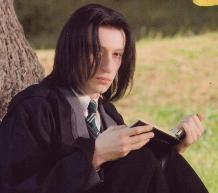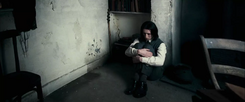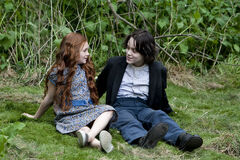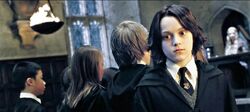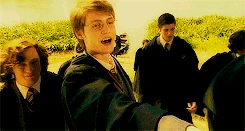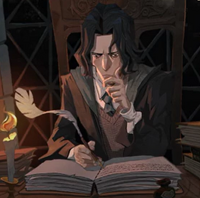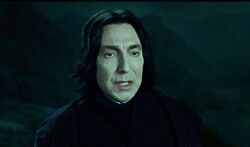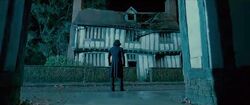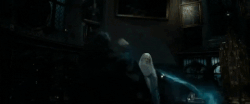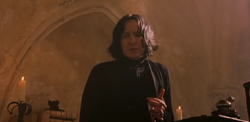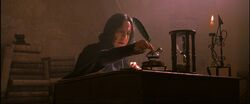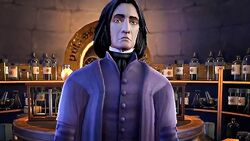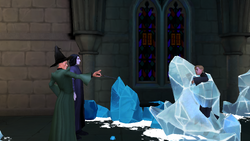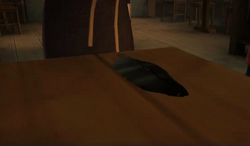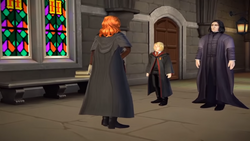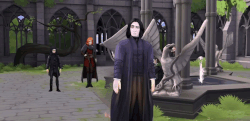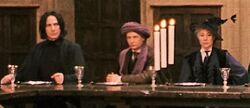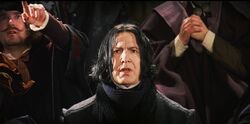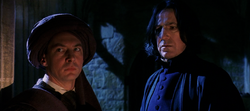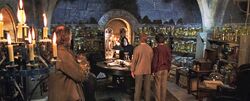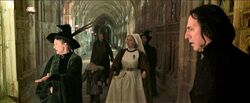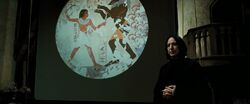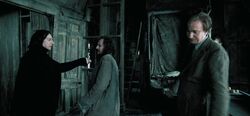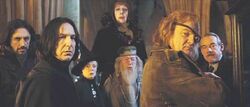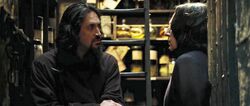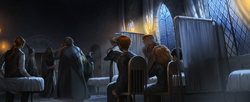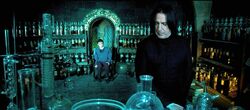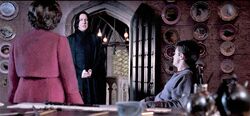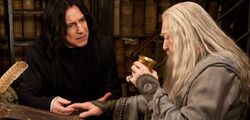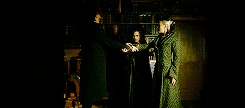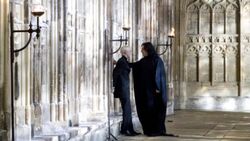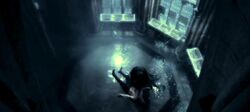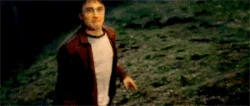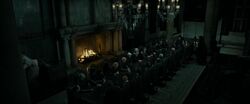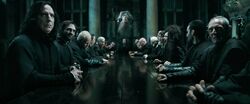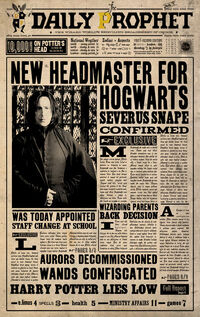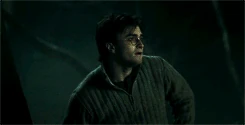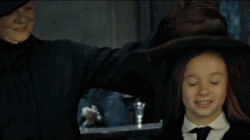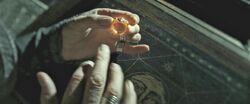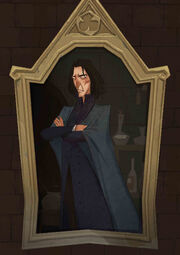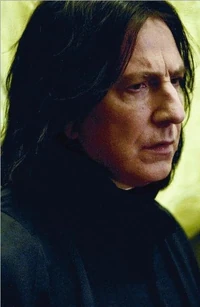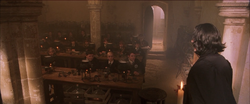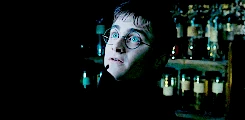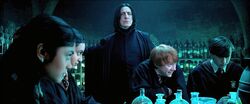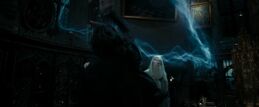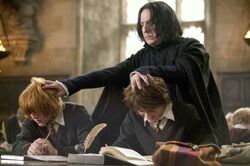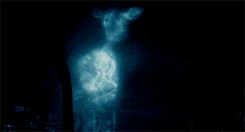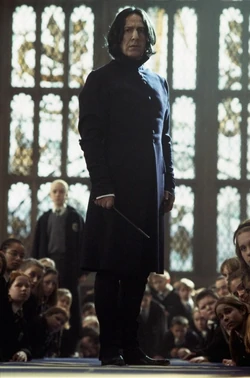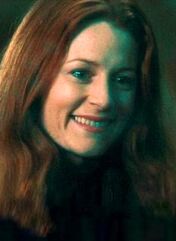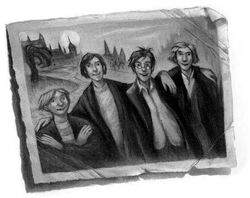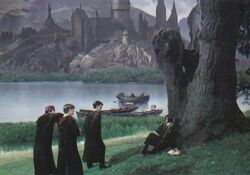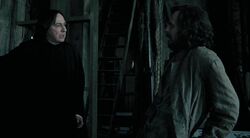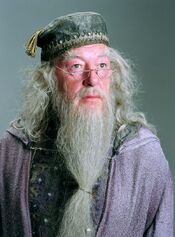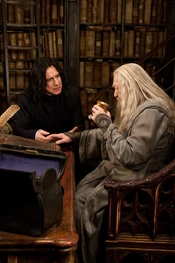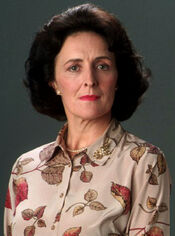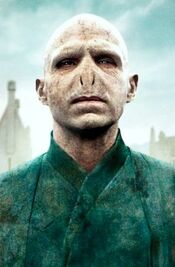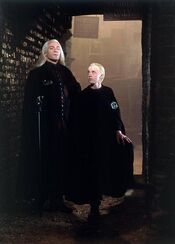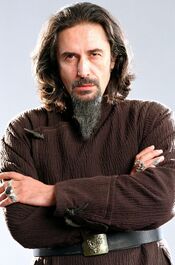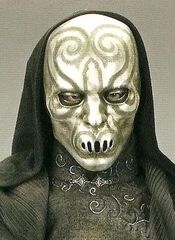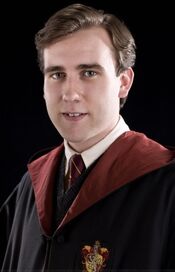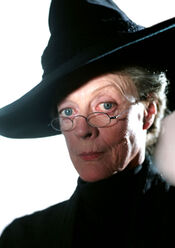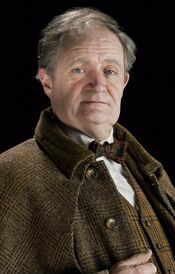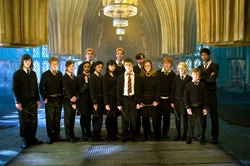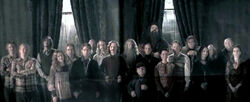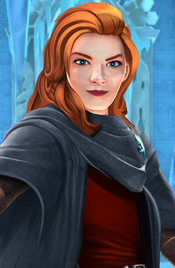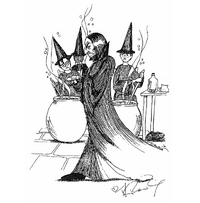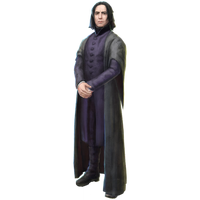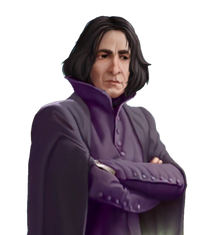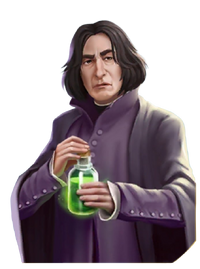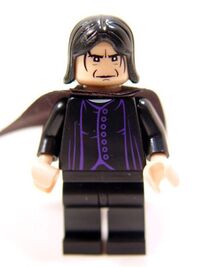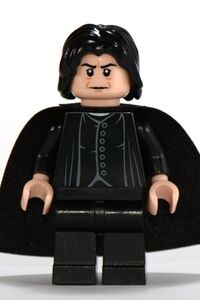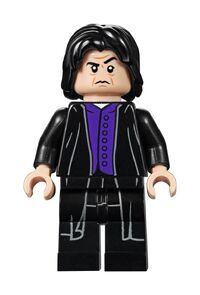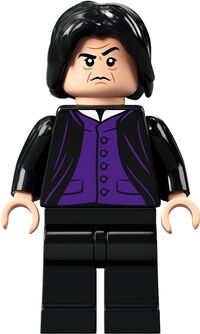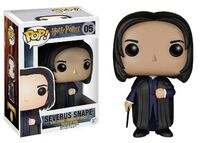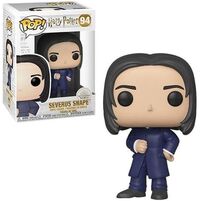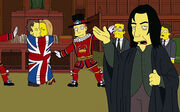| Severus Snape | |
|---|---|
| Harry Potter character | |

Alan Rickman as Severus Snape |
|
| First appearance | Harry Potter and the Philosopher’s Stone (1997) |
| Last appearance | Harry Potter and the Deathly Hallows (2007) |
| Created by | J. K. Rowling |
| Portrayed by |
|
| In-universe information | |
| Full name | Severus Snape |
| Aliases | The Half-Blood Prince The Potions Master |
| Nicknames | Snivellus Slytherus |
| Occupation | Headmaster of Hogwarts School of Witchcraft and Wizardry (1997–1998) Defence Against the Dark Arts Professor of Hogwarts (1996–1997) Potions Professor of Hogwarts (1981–1996) |
| Family | Tobias Snape (father) Eileen Snape née Prince (mother) |
| Nationality | British |
| House | Slytherin |
| Born | 9 January 1960 |
| Died | 2 May 1998 |
Severus Snape is a fictional character in J. K. Rowling’s Harry Potter series. He is an exceptionally skilled wizard whose extremely cold and resentful exterior conceals deep emotions and anguish. A Professor at Hogwarts School of Witchcraft and Wizardry, Snape is hostile to Harry due to his resemblance to his father James Potter. According to the series, James bullied Snape during their time together at Hogwarts.
As the series progresses, Snape’s character becomes more layered and enigmatic. A central mystery is unravelled concerning his loyalties. Snape dies at the hands of Lord Voldemort in the seventh book, at which time his back story is revealed. Despite his attraction to the Dark Arts and Voldemort’s ideology of wizard supremacy, Snape’s love for Muggle-born Lily Evans, Harry’s mother, eventually compelled him to defect from the Death Eaters. He then became a double agent for Albus Dumbledore and the Order of the Phoenix. The fact that Lily chose James Potter, Harry’s father, only fuels Snape’s hostility towards Harry.
Snape’s character has been widely acclaimed by readers and critics. Rowling described him as «a gift of a character»[1] whose story she had known since the first book. Elizabeth Hand of The Washington Post explained that Snape’s life «is the most heartbreaking, surprising and satisfying of all of Rowling’s achievements».[2] Actor Alan Rickman portrayed Snape in all eight Harry Potter films, released between 2001 and 2011.
Character development
In an interview,[3] Rowling described Snape’s character as an «antihero». She has said that she drew inspiration for Snape’s character from a disliked teacher from her own childhood,[4] and described Snape as a horrible teacher,[5] saying the «worst, shabbiest thing you can do» as a teacher is to bully students.[6] However, she does suggest in the books that he is generally an effective teacher.[7] Although Rowling has said that Gilderoy Lockhart is her only character that she «deliberately based on a real person»,[8] Snape was reportedly based, at least in part, on John Nettleship, who taught Rowling chemistry and employed her mother as an assistant at Wyedean School near Chepstow.[9][10][11] Rowling based Snape’s given name on «Severus Road» in Clapham,[12] and his surname is borrowed from the name of a village in England.[13] In a 1999 interview[14] and again in 2004,[8] Rowling singled out Snape as one of her favourite characters to write.
Rowling was less forthcoming about Snape than she was for other characters, because his true loyalties and motivations were not revealed until the final book.[15] However, she hinted numerous times at Snape’s important role, suggesting that people should «keep their eye on Snape».[4][16] In 1999, answering a question regarding Snape’s love life and the redemptive pattern to his character, Rowling expressed her surprise at the foresight.[17] Rowling also disclosed that after the publication of Prisoner of Azkaban, there was one female fan who guessed Snape loved Lily Potter, making Rowling wonder how she had given herself away.[18]
After the completion of the series, Rowling began to speak openly about Snape, discussing the contrast between his character arc and that of Albus Dumbledore.[19] Rowling said «the series is built around [the Dumbledore and Snape storylines]», and maintained that she always knew what Snape would turn out to be at the end and that she carefully plotted his storyline throughout the series. «I had to drop clues all the way through because as you know in the seventh book when you have the revelation scene where everything shifts and you realise…what Snape’s motivation was. I had to plot that through the books because at the point where you see what was really going on, it would have been an absolute cheat on the reader at that point just to show a bunch of stuff you’ve never seen before.»[18] Rowling further said in an interview that she wanted Snape to find redemption and forgiveness: «Snape is a complicated man…he was a flawed human being, like all of us. Harry forgives him…Harry really sees the good in Snape ultimately… I wanted there to be redemption.»[20]
Appearances
Harry Potter and the Philosopher’s Stone
Snape first appears in Harry Potter and the Philosopher’s Stone, shortly after Harry arrives at Hogwarts. He is the school’s Potions Master, though he is widely rumoured to covet the Defence Against the Dark Arts post.[21] Snape himself confirms the rumour in Harry Potter and the Order of the Phoenix.[22] Snape is a sinister and malicious teacher who makes frequent snide and disparaging remarks at Harry’s expense. He quickly becomes the primary antagonist of the book, as Harry suspects him of plotting to steal the Philosopher’s Stone, and of attempting to kill him. Only the climax of the book reveals that Professor Quirrell, in league with Lord Voldemort, is the real enemy; Snape, suspicious of Quirrell, had been looking out for Harry throughout the book. In the final chapter, Dumbledore suggests that because Harry’s father James had saved Snape’s life when they were both students, even though the two detested each other, Snape felt responsible for Harry in return.[23] As the final book reveals, this is not the full story. In any case, even after Quirrell’s true role is revealed, Harry retains feelings of suspicion and resentment towards Snape, and their relationship remains tense. Snape’s behaviour and attitude towards Harry also remain unchanged.
Harry Potter and the Chamber of Secrets
Snape has a minor role in Harry Potter and the Chamber of Secrets, where he helps Gilderoy Lockhart oversee Hogwarts’ short-lived Duelling Club,[24] but he has little interaction with the main plot. It is while attending the Duelling Club that Harry learns the Expelliarmus spell, which plays a significant role in later books, by seeing Snape use it.
Harry Potter and the Prisoner of Azkaban
In Harry Potter and the Prisoner of Azkaban, Snape demonstrates his expertise with potions by brewing the complex Wolfsbane potion for the new Defence Against the Dark Arts professor, Remus Lupin.[25] Throughout the third book, Snape suspects that Lupin may be helping Harry’s godfather Sirius Black enter Hogwarts castle; Sirius had been convicted (wrongly, as it is later revealed) of murdering Peter Pettigrew and innocent bystanders, and betraying the Potter family’s hiding place to Voldemort. This suspicion stems from Lupin’s friendship with Sirius and Harry’s father, James, while they were all at Hogwarts as students.[26] Near the climax of the book, Snape attempts to apprehend Sirius, but Sirius escapes with Harry’s aid. Snape informs Dumbledore of this circumstance, and when Harry and Lupin are not punished, Snape retaliates by revealing to the entire school that Lupin is a werewolf, forcing the latter to resign his post.[27]
Prisoner of Azkaban reveals more details about the connection between Snape and James. While in school together, Sirius once tricked Snape into almost entering the Shrieking Shack while Lupin was there, transformed into a werewolf. James realised the danger and stopped Snape, saving his life; this is the incident Dumbledore referred to at the end of the first book. Snape, however, believes James’ actions were self-serving, to avoid being expelled.[28]
Harry Potter and the Goblet of Fire
Snape’s role in the fourth novel, Harry Potter and the Goblet of Fire, is not substantially different from that of the previous three books. He is apoplectic when Harry is unexpectedly entered into the Triwizard Tournament. Later Harry accidentally falls into Dumbledore’s Pensieve and views memories of several Death Eater trials from years before. At one point, Snape is named as a Death Eater by Igor Karkaroff, but Dumbledore comes to Snape’s defence, claiming that although Snape had indeed been a Death Eater, he changed sides before Voldemort’s downfall and turned spy against him. Later, Dumbledore assures Harry that Snape’s reformation is genuine, though he refuses to tell Harry how he knows this, saying the information «is a matter between Professor Snape and myself».[29]
At the end of the book, Dumbledore attempts to convince a disbelieving Minister for Magic, Cornelius Fudge, that Voldemort has returned. As proof, Snape willingly shows Fudge the restored Dark Mark on his arm. He is subsequently sent on a secret mission by Dumbledore. This mission, as had been implied in Harry Potter and the Order of the Phoenix and revealed in Harry Potter and the Half-Blood Prince, was to rejoin the Death Eaters and spy on Voldemort as a re-doubled agent, while pretending to spy on Dumbledore on behalf of Voldemort.
Harry Potter and the Order of the Phoenix
In the fifth novel, Harry Potter and the Order of the Phoenix, Snape returns to a more prominent role. With Voldemort having returned to a fully corporeal body, Snape continues working as a re-doubled agent for Dumbledore.[30] He is seen prior to the start of school at Number 12, Grimmauld Place giving reports to the Order of the Phoenix.[31] He has a very strained relationship with Sirius, who owns Grimmauld Place and must remain there in hiding. The two trade frequent snide remarks and at one point almost begin a duel. Snape taunts Sirius about the latter’s not being able to take an active role in the Order’s missions because of his fugitive status. Harry feels later that this taunting contributed to Sirius’ willingness to take unsafe risks.[32] Back at school, Snape’s allegiance to the Order has no effect on his dislike for Harry.
Later in the book, Dumbledore has Snape teach Harry Occlumency, the protection of the mind from outside intrusion or influence.[32] The sessions are made difficult by their mutual hostility and end prematurely when Harry uses Dumbledore’s Pensieve to view one of Snape’s worst childhood memories without the latter’s permission. He sees the memory of Snape being bullied by James and Sirius, and of calling Harry’s mother Lily a Mudblood (a highly offensive term).[26] Only in the final book is it revealed that, prior to this confrontation, Snape and Lily had been close friends.
Towards the end of the novel, Dolores Umbridge – the school’s politically appointed headmistress – captures Harry and interrogates him about Dumbledore’s whereabouts. She sends for Snape, demanding that he provide the magical truth serum Veritaserum in order to force Harry to reveal any information he may be hiding. Snape claims that his supplies of the serum have been exhausted after Umbridge tries to use the drug previously on Harry. It is later revealed that Snape had in fact supplied Umbridge with fake Veritaserum on the prior attempt. Snape then carries Harry’s cryptic warning about Sirius’ capture to the other Order members, allowing them to come to the rescue in the Department of Mysteries.[33] Harry still holds Snape partly responsible for Sirius’ death, believing Snape’s goading spurred Sirius into joining the battle.
Harry Potter and the Half-Blood Prince
In the second chapter of Harry Potter and the Half-Blood Prince, Bellatrix Lestrange and Narcissa Malfoy visit Snape at his home in Spinner’s End. Narcissa’s son Draco has been given a difficult task by Voldemort, and Narcissa swears Snape to an Unbreakable Vow that he will protect Draco, help him complete Voldemort’s task, and finish the task himself if Draco fails. When questioned by Bellatrix about his loyalties, Snape says he has been working for Voldemort ever since Voldemort’s return, and explains his actions in the previous books in that light. He points out that gaining Dumbledore’s trust and protection has kept him out of Azkaban and free to operate on Voldemort’s behalf.[34]
At the start-of-term feast at Hogwarts, Dumbledore announces Snape as the new Defence Against the Dark Arts professor. Horace Slughorn, a former teacher who himself had taught Snape during his Hogwarts years, comes out of retirement and replaces him as Potions Master. With Snape no longer teaching Potions, Harry enrols in Slughorn’s class and is lent an old textbook until his new one arrives. Harry finds marginalia, including a variety of hexes and jinxes seemingly invented by an unknown student, and substantial improvements to the book’s standard potion-making instructions. The text is inscribed as being «the Property of the Half-Blood Prince». The notes greatly bolster Harry’s performance in Potions, so much so that he impresses Slughorn. Snape, who maintains that he «never had the impression that [he] had been able to teach Potter anything at all», is suspicious of Harry’s newfound Potions success.[35]
Later, during a fight with Draco, Harry casts one of the Prince’s spells marked «For Enemies,» and is horrified by the devastating wounds it inflicts to Draco’s face and chest. Snape rushes to the scene and heals Draco, then interrogates Harry regarding the spell, using Legilimency to extract the source of Harry’s knowledge (the Potions textbook) from Harry’s mind. When Snape insists that Harry show him his Potions textbook, Harry hides the Prince’s book and gives him Ron Weasley’s book instead. As punishment for the attack and knowing Harry is lying about the textbook, Snape assigns Harry detention during the final Quidditch match of the year.[36]
Before leaving Hogwarts to accompany Dumbledore in locating another horcrux – part of Voldemort’s soul – Harry discovers from Professor Trelawney that it was Snape who overheard the prophecy and told it to Voldemort, resulting in Voldemort hunting down Harry and his parents. Despite this and Harry’s angry questions, Dumbledore avers his trust in Snape. Returning to Hogwarts after retrieving Voldemort’s Horcrux, Harry and Dumbledore alight atop the school’s astronomy tower. Gravely weakened by the horcrux’s protective potion, Dumbledore tells Harry he must fetch Snape, but before Harry can leave, Draco suddenly arrives, intending to carry out Voldemort’s order to assassinate Dumbledore, closely followed by other Death Eaters (followers of Voldemort), and Snape. Snape interrupts the planned murder, killing the headmaster himself.[37] Harry, who is paralysed under his invisibility cloak by Dumbledore for his own protection, witnesses the kill, and is released upon Dumbledore’s death. Enraged, he pursues Snape, Draco, and the Death Eaters as they flee the castle. Snape easily blocks Harry’s spells and jeeringly points out Harry’s mistakes, but never strikes back. During the confrontation, Snape reveals himself as the eponymous «Half-Blood Prince» (being the half-blood son of Muggle Tobias Snape and pure-blood Eileen Prince). Snape passes through the school gates and Disapparates with Draco in tow at the book’s end.[38] The full relationship between Dumbledore and Snape and the reason for Snape’s actions remain unknown until the final book. In an interview, Rowling mentioned that at this point in the series, the Harry–Snape relationship has become «as personal, if not more so, than Harry–Voldemort.»[39]
Harry Potter and the Deathly Hallows
In Harry Potter and the Deathly Hallows, Voldemort and his Death Eaters have tightened their grip on the wizarding world. Snape is named Headmaster of Hogwarts, while Death Eaters Alecto and Amycus Carrow are appointed as Hogwarts staff. The novel focuses largely on Harry and his friends and events outside the school; therefore Snape plays a limited role at the start. In the course of the book, Harry and his friends find out that a few students attempted to steal the Sword of Godric Gryffindor, and that Snape subsequently sent it to be stored at Gringotts Wizarding Bank; however, that sword was only a copy. Later on, Harry and Ron are led to find the real sword by a Patronus taking the form of a doe.[40] (Towards the end of the book, Harry learns that this was Snape’s Patronus, taking the same shape as Harry’s mother Lily’s Patronus, a visible sign of his lifelong love for Harry’s mother, and that Dumbledore had asked Snape to ensure that Harry gained possession of the sword.[41] The novel also reveals that Snape had covertly used his position as Headmaster to protect the students and to contain the Carrows.[41])
Towards the end of the school year, Professors McGonagall, Flitwick, and Sprout force Snape to flee the school.[42] Voldemort summons Snape to the Shrieking Shack. Erroneously believing Snape is the master of the Elder Wand and that Snape’s death will make him the master of the Wand, Voldemort kills Snape by having his pet snake Nagini bite him through the neck.[43] The dying Snape releases a cloud of memories and tells Harry, who has watched the entire scene from a hidden spot, to take and view them.
From these memories, Harry sees Snape’s childhood and learns his true loyalties. In this vision, Harry learns that Snape befriended Lily as a child when they lived near each other. Upon their arrival at Hogwarts, the Sorting Hat placed Snape and Lily into Slytherin and Gryffindor Houses, respectively. They remained friends for the next few years until they were driven apart by Snape’s interest in the Dark Arts; the friendship finally ended following the bullying episode that Harry had briefly seen in the fifth book, in which Snape calls Lily «Mudblood». Despite this separation and Snape’s enduring animosity toward Lily’s eventual husband James Potter, Snape continued to love Lily for the rest of his life.
The memories also show that as a Death Eater, Snape had revealed to Voldemort a prophecy made by Sybill Trelawney, causing Voldemort to attempt to prevent it by killing Harry and his parents. Snape, who had not realised until too late that Voldemort had interpreted the prophecy to be referring to Lily and her family (as it could’ve also referred to Frank and Alice Longbottom and their son Neville Longbottom), asked Voldemort to spare Lily. Still in terror for her life, he also approached Dumbledore, admitted his actions, and begged him to protect the Potters. Dumbledore chided him for thinking only of himself and not of Lily’s husband and child, but agreed and ensured that they were placed under the Fidelius Charm. In return, Snape secretly allied himself with Dumbledore and the Order of the Phoenix as a double agent against Voldemort, using his powers of Occlumency to hide his betrayal from Voldemort. However, Snape demanded of Dumbledore that his love for Lily (his reason for switching sides) be kept a secret, especially from Harry, because of the deep animosity he felt towards Harry’s father and his mixed feelings towards Harry (who reminded him of both his love for Lily Potter and her death, and his animosity towards James Potter). Dumbledore agreed and kept the secret throughout his life, although questioning Snape’s request to «never reveal the best of you». Even with his efforts to protect her, Snape felt responsible for Lily’s death at Voldemort’s hands.
Snape’s memories then reveal that Dumbledore had impetuously tried to use the Gaunt ring, which had been cursed by Voldemort, and had been suffering from a powerful curse. Snape’s knowledge of the Dark Arts enabled him to slow the spread of the curse from Dumbledore’s hand through his body, but he would have died within a year. Dumbledore, aware that Voldemort had ordered Draco to kill him, had asked Snape to kill him instead as a way of sparing the boy’s soul and of preventing his own otherwise slow, painful death. Although Snape was reluctant, even asking about the impact of such an action on his own soul, Dumbledore implied that this kind of coup de grâce would not damage a human’s soul in the same way murder would.[41] Snape agreed to do as the Headmaster requested. Snape’s memories also provide Harry with the information he needs to ensure Voldemort’s final defeat, in the form of conversations Snape had with Dumbledore.[41]
Rowling noted in an interview that because Snape abandoned his post before dying or officially retiring, a portrait of him does not immediately appear in the Headmaster’s office following his death. She adds, however, that she would like to think Harry made Snape’s true loyalty and heroism known in the Wizarding world, and that he lobbied to ensure that a portrait be installed in the office.[44] In a separate interview, Rowling discussed Snape’s back story, saying she had planned it ever since she wrote the first book because the whole series is built around it and she considers him one of the most important characters of the seventh book.[18]
Epilogue
In the epilogue to Deathly Hallows, set nineteen years after Harry defeats Voldemort, Harry has named his second-born son Albus Severus, after Albus Dumbledore and Severus Snape. As Albus is about to enter his first year at Hogwarts, he expresses concern that he will be sorted into Slytherin. Harry tells his son, «you were named for two headmasters of Hogwarts. One of them [Snape] was a Slytherin and he was probably the bravest man I ever knew.»[45]
Appearances in other material
Portrayal in films
Severus Snape appears in all eight Harry Potter films,[46] portrayed by British actor Alan Rickman. Rickman was Rowling’s personal choice to portray the character.[47] He had conversations with Rowling about his character and is one of the few Harry Potter actors that she spoke to prior to the completion of the book series about the future direction of the character.[48] «He knew very early on that he’d been in love with Lily,» said Rowling. «He needed to understand […] where this bitterness towards this boy who’s the living example of her preference for another man came from.»[49]
Rickman used this knowledge of Snape’s ultimate loyalties throughout the films to decide how to play certain scenes, deliver specific lines, or use body language to convey specific emotions.[50] When the directors of the films would ask him why he was doing a scene a certain way or delivering a line in a specific manner, Rickman would simply reply that he knew something they didn’t.[50]
Rickman himself refrained from talking about Snape, asking readers to wait and «see what unfolds» in the course of the novels; however, he did say Snape is a complicated person, very rigid and full of himself; in an interview he went further, saying: «Snape isn’t one who enjoys jokes and I strongly fear that his sense of humour is extremely limited… But in his defence, I will add that he didn’t have an easy adolescence, particularly during his studies at Hogwarts.»[51] He also said Snape is a fascinating character, and that he takes immense pleasure in playing such an ambiguous person.[52]
Rickman’s performance as Snape was widely acclaimed by critics, fans and Rowling herself. Entertainment Weekly listed Rickman as one of the most popular movie stars in 2007 for his performance as Snape, saying: «As the icy, humourless magic instructor Severus Snape, Rickman may not be on screen long—but he owns every minute.»[53] Rickman also noted fans’ reactions; in an interview, he said he found «that people in general adore Snape. He is sarcastic, stubborn, etc, etc. But he is also fascinating. I have a lot of fun impersonating him.»[52] Rickman was nominated for several awards for his portrayal of Snape, and in 2011, was elected the best character portrayal in all the Harry Potter films series.[54]
In 2011, Empire magazine published an open letter from Rickman to J.K. Rowling, ruminating on the ten years of working on the Potter films and thanking her for telling the story.[55]
In Harry Potter and the Order of the Phoenix, the fifteen-year-old Snape (portrayed by Alec Hopkins) makes a brief appearance in a flashback to Snape’s youth. In the final film, Harry Potter and the Deathly Hallows – Part 2, the younger Snape, perhaps ten or eleven, is played by Benedict Clarke. In 2016, a fan film prequel, Severus Snape and the Marauders, was released online and Snape was played by Mick Ignis.[56]
Before Alan Rickman was offered the role of Severus Snape, the role was originally offered to Tim Roth,[57] who turned the role down in favour of portraying General Thade in Planet of the Apes.[58]
Harry Potter and the Cursed Child
When Draco and Astoria Greengrass’ son Scorpius Malfoy finds himself in an alternate timeline in which Voldemort won the Battle of Hogwarts, killed Harry and his allies and instituted a terrible reign of terror, he desperately searches for help in restoring history to its original course. He finds that in this reality Snape is still alive and still teaches at Hogwarts, and asks for his help. At first Snape is suspicious of him, since this timeline’s version of Scorpius is a bully and a Voldemort stalwart. But when Scorpius shows that he knows of Snape having been in love with Lily, Harry’s mother – Snape’s most closely guarded secret – Snape becomes convinced that he does indeed come from a different timeline where Harry and his friends won. Snape then reveals that he, together with the fugitive Ron and Hermione Granger, maintain the last remnants of Dumbledore’s Army – still waging hopeless resistance against the all-powerful Voldemort. In talking with Scorpius, Snape had learned that Harry would name his son «Albus Severus» and would regard Snape as «probably the bravest man I ever knew» – and is deeply moved. Though having guessed that in the other timeline he would die, Snape nevertheless willingly helps Scorpius recreate this timeline – and being discovered by Dementors, Snape sacrifices himself in order to cover Scorpius’ escape.
Characterisation
Outward appearance
Snape is described as a thin man with sallow skin, a large, hooked nose, and yellow, uneven teeth. He has shoulder-length, greasy black hair which frames his face, and cold, black eyes. He wears black, flowing robes which give him the appearance of «an overgrown bat».[59] The youthful Snape had a «stringy, pallid look», being «round-shouldered yet angular», having a «twitchy» walk «that recalled a spider» and «long oily hair that jumped about his face».[26]
In the chapter illustrations by Mary GrandPré in the American editions of The Prisoner of Azkaban, The Order of the Phoenix, and The Half-Blood Prince, Snape is depicted with a moustache and goatee, long black hair, and a receding hairline.
Personality
Snape is generally depicted as being cold, calculating, precise, sarcastic, and bitter. He strongly dislikes Harry and often insults him by insulting his father James. As the series progresses, it is revealed that his treatment of Harry stems from Snape’s bitter rivalry with James when they were in school together. In particular, James and Sirius bullied Snape, which according to Alan Rickman caused the already lonely boy to further «shut himself in».[52] Rowling further described the young Snape as insecure and vulnerable: «Given his time over again [Snape] would not have become a Death Eater, but like many insecure, vulnerable people he craved membership of something big and powerful, something impressive.[…] [He] was so blinded by his attraction to the dark side he thought [Lily] would find him impressive if he became a real Death Eater.»[3]
The adult Snape, on the other hand, is portrayed as very self-assured and confident of his abilities, to a degree that Rickman described as «full of himself.»[51] Director David Yates said Snape is a character with gravitas, authority and power.[60] Snape typically displays a very calm and collected demeanour, rarely at a loss for words or taken off guard. His temper, however, is sometimes short where Harry is concerned and positively flares when dealing with his erstwhile tormentor Sirius, or when accused of cowardice. His otherwise impassive and aloof attitude seems to stem from his belief that people who cannot control their emotions are weak.[32]
Like some other prominent members of Slytherin house, Snape is shown to be a clever and cunning wizard.[43][61] He is intelligent and has a keen, analytical mind. In an interview, Rowling adds that Snape is immensely brave,[20] and when asked if she considers Snape a hero, replied: «Yes, I do; though a very flawed hero. An anti-hero, perhaps. He is not a particularly likeable man in many ways. He remains rather cruel, a bully, riddled with bitterness and insecurity—and yet he loved, and showed loyalty to that love and, ultimately, laid down his life because of it. That’s pretty heroic!»[3]
Magical abilities and skills
All seven novels show Snape to be a very powerful wizard and to have been outstanding while a student. He specialises in potion making and has talent and passion for the Dark Arts. Sirius claimed that Snape knew more hexes and curses as a first-year student at Hogwarts than most seventh-years knew.[61] Particularly gifted in potion making, Snape added major improvements to his Potions textbook while still a student. Also as a student, Snape shows a rare gift for discovering new spells. Lupin describes Sectumsempra as Snape’s «speciality» in Deathly Hallows.[62] Snape is shown using this spell as a teenager against Harry’s father James[26] and in the aerial battle in the last novel when he accidentally hits George Weasley (acting as a Potter decoy) with it while actually aiming for a Death Eater who was trying to attack Lupin, permanently severing George’s right ear. Despite Sectumsempra’s deadly power, Snape can also heal the wounds it causes.[36] Snape is adept at reversing or containing potentially fatal damage from other dark curses as well, due to his vast knowledge of Dark Arts, as he does when Dumbledore[41] and then Katie Bell[63] are cursed. Skilful in the arts of Legilimency and especially Occlumency, Snape is able to both access the minds of others and protect his own thoughts—indeed, though Snape does not care for the term himself, Harry forms the uncomfortable impression early in the series that the Potions Master is able to «read minds.» Being an Occlumens, Snape is able to keep his betrayal from Voldemort, who is himself described as being «the greatest Legilimens» in history.[34] According to Rowling, Snape is the only Death Eater capable of producing a full Patronus, which, like Lily’s, is a doe.[3] Snape is a talented duellist, able to hold off by himself (if only briefly) a group of three Hogwarts professors that included former duelling champion Filius Flitwick. Professor McGonagall later implies that Snape learned to fly without the use of a broom, a rare skill previously displayed only by Voldemort.[42]
Family
Snape’s family background is mostly shown in flashbacks during the course of the last three novels. Snape was born to Eileen Prince, a witch, and Tobias Snape, a Muggle, making him a half-blood (hence the name, «Half-Blood Prince»). This is rare for a Death Eater, as remarked in the last book, though Voldemort himself also had a Muggle father. Snape spent his early childhood living with his parents in a small house in Spinner’s End. Snape’s family was a poor one and he is described as wearing ill-fitting clothes «that were so mis-matched that it looked deliberate». As a child, Snape was apparently neglected and his parents often fought with one another. Snape was very eager to leave his home to go to Hogwarts.[41] Towards the end of the last novel, Harry draws parallels between his childhood, Snape’s, and Voldemort’s.[64]
Loyalties
Snape’s true loyalty was one of the most significant questions in the series up until the end of the final instalment, Harry Potter and the Deathly Hallows. Although the first five novels depict him as unfair and vindictive towards Harry and his friends, he invariably ends up protecting or otherwise helping them when they or their allies are in danger. Several characters express doubts about his loyalty, but Dumbledore’s trust in him is generally taken to be the final word. The sixth novel, Harry Potter and the Half-Blood Prince, departs from that model. In the second chapter, Snape claims to have been working for Voldemort ever since the latter’s return, and only pretending to help Dumbledore.[34] By killing Dumbledore toward the end of the novel, Snape seems to place himself firmly in Voldemort’s camp.[37] Rowling maintains this impression through the early chapters of the seventh novel. However, near the climax of the book, Snape leaves Harry his dying thoughts (to be viewed in the Pensieve) and ultimately reveals to Harry that he had been loyal to Albus Dumbledore throughout the series.[41] Snape’s fierce devotion to and love of his childhood friend Lily, Harry’s mother, is the foundation of that loyalty.[41]
After Harry Potter and the Half-Blood Prince, Snape’s loyalty was a matter of intense debate among the fans. The issue was given special attention in the marketing campaigns on behalf of the last book, Harry Potter and the Deathly Hallows. «Is Snape Good or Evil?» was one of the questions in Scholastic Inc.’s seven-question series, part of its marketing campaign for the book.[65] As part of the Waldenbooks marketing campaign, two free stickers, one that said «Trust Snape» and another that stated «Snape Is A Very Bad Man» were available with the book. Borders Group published a separate book on the topic, The Great Snape Debate, containing essays and arguments from both sides of the debate.[66][67]
Reception
The secretive attitude and gradual unfolding of Snape’s character was broadly admired, with Stephen Fry, the UK audio books narrator, saying in 2003: «Most characters like Snape are hard to love but there is a sort of ambiguity—you can’t quite decide—something sad about him—lonely and it’s fascinating when you think he’s going to be the evil one…, then slowly you get this idea he’s not so bad after all.»[68] David Yates, who directed the final four films of the series, also expressed his views on the character, saying: «A character like Snape, where you’re not really sure if he’s a good guy or a bad guy, that gives you a latent tension… I think the coolest thing you can do with an audience is deny them a little bit of information.»[60] Despite being less than kind, the character quickly gained popularity within fandom to a level that surprised Rowling herself.[8] Joyce Millman suggests in her essay «To Sir with Love» in the book Mapping the World of Harry Potter, that Snape is derived from a tradition of Byronic heroes such as Wuthering Heights‘ Heathcliff.[69]
Jenny Sawyer from The Christian Science Monitor commented on the character’s development in the series.[70] She claimed that Snape is the only protagonist who genuinely has a choice to make and who struggles to do the right thing, hence the only one to face a «compelling inner crisis». She believed the popularity of the character is due to the moral journey and inner conflict that Snape undergoes within the series, as it is the hero’s struggle and costly redemption that really matter: «[Snape’s] character ached for resolution. And it is precisely this need for resolution—our desire to know the real Snape and to understand his choices—that makes him the most compelling character in the Potter epic.»
The final revelation of Snape’s loyalty in Harry Potter and the Deathly Hallows was viewed positively by fans and critics alike. Daniel Radcliffe, who portrays Harry Potter in the movie series, expressed his delight, saying he was pleased to see that his theory that Snape would end up being a sort of tragic hero came through.[71] Elizabeth Hand from The Washington Post wrote, «The much-maligned loner Snape does not come onstage until the latter part of «Deathly Hallows,» but when he does the book becomes his: Snape’s fate, more than Voldemort’s, perhaps more even than Harry’s, is the most heartbreaking, surprising and satisfying of all of Rowling’s achievements.»[2]
IGN listed Snape as their 4th top Harry Potter character, saying that he makes «quite an impact in the Harry Potter series»,[72] and IGN’s Joe Utichi called Snape his favourite Harry Potter character and praised his character development.[73] Shortly after the release of the final film, MTV held a public poll for fans to vote for the best character in the series, and Snape was voted #1.[74] Around the same time, Empire magazine held a public poll for fans to vote for the 25 greatest characters in the series, and Snape once again came in at #1.[75] In May 2011, Snape was again voted as the No. 1 favourite Harry Potter character in a public poll held by the Bloomsbury publishing house.[76]
In popular culture
The character of Severus Snape has appeared in various animated parodies of Harry Potter. He is a starring character in Neil Cicierega’s online Potter Puppet Pals parodies, and has a centric episode titled Bothering Snape. Also, the video The Mysterious Ticking Noise with the chorus «Snape, Snape, Severus Snape» was the winner for «Best Comedy» of the year 2007 at YouTube; it currently has over 170 million views.[77] Snape is also parodied as Professor Santory Snapekin in Sluggy Freelance’s webcomic entitled Torg Potter. In the first parody, Torg defeats a plot by Professor Snapekin to achieve ultimate power.[78]
In a 2004 sketch on Saturday Night Live in which Lindsay Lohan appears as Hermione Granger, Snape is portrayed by Will Forte.[79] Snape has also been parodied in UK television. Comic Relief released a story called Harry Potter and the Secret Chamberpot of Azerbaijan, in which Snape is played by Jeremy Irons.[80][81] Snape appeared in a Harry Potter parody named «Louis Potter and the Philosopher’s Scone» in Alistair McGowan’s Big Impression show, played by Alistair McGowan himself.[82][83] In the Harry Bladder sketches in All That, Snape appears as Professor Chafe (portrayed by Jeremy Rowley), whose legs were badly chafed, causing him to be unnecessarily mean. Many sketches feature students brewing potions that did silly things, like enlarge students’ behinds, give males large breasts, or change people into bras. In a sketch comedy named «Cooking With…» on Australian TV series The Wedge, Snape is played by Anthony Ahern, and catches Harry and Hermione making love.[84] In Team Starkid’s A Very Potter Musical, Snape is played by actor Joe Moses.[85]
References
- ^ «Rowling on Snape». half-bloodprince.org. Archived from the original on 26 July 2011. Retrieved 3 November 2012.
- ^ a b Elizabeth Hand (22 July 2007). «Harry’s Final Fantasy: Last Time’s the Charm». The Washington Post. Archived from the original on 21 October 2012. Retrieved 18 March 2008.
- ^ a b c d «Web Chat with J.K. Rowling 30 July 2007 on Bloomsbury.com» (PDF). Archived from the original (PDF) on 28 September 2007. Retrieved 2 October 2007.
- ^ a b «J.K. Rowling interview transcript». The Connection. WBUR Radio. 12 October 1999. Archived from the original on 6 August 2012. Retrieved 14 March 2008.
- ^ «Barnes and Noble and Yahoo! chat with J.K. Rowling». barnesandnoble.com. 20 October 2000. Archived from the original on 3 March 2018. Retrieved 15 September 2007.
- ^ Fraser, Lindsay (2001). Conversations with J. K. Rowling. New York: Scholastic. p. 21. ISBN 978-0-439-31455-8.
- ^ [OotP Ch.12]
- ^ a b c «J.K. Rowling at the Edinburgh Book Festival». J.K.Rowling Official Site. 15 August 2004. Archived from the original on 21 July 2011. Retrieved 4 November 2012.
- ^ «Rowling’s ‘spell’ on science teacher». BBC News. 28 December 2001. Archived from the original on 3 February 2008. Retrieved 8 November 2012.
- ^ «The name’s Snape, Severus Snape». This Is Gloucestershire. Northcliffe Media. 25 June 2009. Archived from the original on 1 January 2011. Retrieved 9 November 2012.
- ^ Hind, Lia (16 March 2011). «Chepstow inspiration for Harry Potter prof dies». South Wales Argus. Archived from the original on 27 September 2012. Retrieved 9 November 2012.
- ^ @jk_rowling (23 May 2020). «Real Harry Potter inspiration alert:…» (Tweet) – via Twitter.
- ^ «Rowling eToys Interview». 2000. Archived from the original on 30 September 2007. Retrieved 16 July 2007.
- ^ Abel, Katy (1999). «Harry Potter Author Works Her Magic». Family Education. Pearson. Archived from the original on 18 July 2011. Retrieved 3 September 2007.
- ^ «World Book Day Chat». 4 March 2004. Archived from the original on 16 August 2007. Retrieved 3 September 2007.
I’m not going to tell you [what form Professor Snape’s Boggart and Patronus will take], but that’s because it would give so much away.
- ^ «Interview with Stephen Fry at Royal Albert Hall». 26 June 2003. Archived from the original on 6 August 2012. Retrieved 3 September 2007.
It is worth keeping an eye on old Severus definitely!
- ^ «J.K. Rowling interview transcript». The Connection. WBUR Radio. 12 October 1999. Archived from the original on 6 August 2012. Retrieved 14 March 2008.
I’m slightly stunned that you’ve said that…and you’ll find out why I’m so stunned if you read book 7.
- ^ a b c «JKR: Snape and Dumbledore Two of the Most Important Characters in ‘Deathly Hallows’«. The Leaky Cauldron. 3 April 2008. Archived from the original on 7 April 2008. Retrieved 7 April 2008.
- ^ Adler, Shawn (15 October 2007). «‘Harry Potter’ Author J.K. Rowling Meets With L.A. Students, Plots Her Next Move». MTV News. Archived from the original on 26 October 2012. Retrieved 14 November 2012.
- ^ a b Vieira, Meredith (29 July 2007). «Harry Potter: The Final Chapter». Dateline. NBC. Archived from the original on 12 March 2008. Retrieved 14 March 2008.
- ^ [PS Ch.7]
- ^ [OotP Ch.17]
- ^ [PS Ch.17]
- ^ [CS Ch.11]
- ^ [PoA Ch.8]
- ^ a b c d [OotP Ch.28]
- ^ [PoA Ch.22]
- ^ [PoA Ch.18]
- ^ [GF Ch.30]
- ^ [HBP Ch.25]
- ^ [OotP Ch.4]
- ^ a b c [OotP Ch.24]
- ^ [OotP Ch.37]
- ^ a b c [HBP Ch.2]
- ^ [HBP Ch.15]
- ^ a b [HBP Ch.24]
- ^ a b [HBP Ch.27]
- ^ [HBP Ch.28]
- ^ «The Leaky Cauldron and MN Interview Joanne Kathleen Rowling – Part 1». The Leaky Cauldron. 28 July 2007. Retrieved 8 February 2022.
- ^ [DH Ch.19]
- ^ a b c d e f g h [DH Ch.33]
- ^ a b [DH Ch.30]
- ^ a b [DH Ch.32]
- ^ «Transcript of webchat with J.K. Rowling». the-leaky-cauldron.org. 30 July 2007. Archived from the original on 24 August 2007. Retrieved 2 April 2008.
- ^ [DH Epilogue]
- ^ «UPDATED Videos: First Harry Potter and the Deathly Hallows: Part II ABC Family preview — SnitchSeeker.com». www.snitchseeker.com. Archived from the original on 21 March 2011. Retrieved 30 March 2011.
- ^ Jess Cagle (5 November 2001). «The First Look at Harry». time.com. Archived from the original on 20 March 2007. Retrieved 31 March 2008.
- ^ «JK Rowling interview in full». CBBC. 2 November 2001. Archived from the original on 16 September 2019. Retrieved 29 July 2007.
- ^ «Anelli, Melissa, John Noe and Sue Upton. «PotterCast Interviews J.K. Rowling, part two.»«. Archived from the original on 11 January 2021. Retrieved 31 March 2008.
- ^ a b Boucher, Geoff. «‘Harry Potter’: Alan Rickman looks back on decade of dark magic». Hero Complex. Archived from the original on 21 June 2013. Retrieved 9 June 2013.
- ^ a b «Alan Rickman Interviews Transcripts about Snape». Archived from the original on 8 December 2007. Retrieved 12 March 2008.
- ^ a b c «Alan Rickman – French Interview Translation». Archived from the original on 30 April 2008. Retrieved 12 March 2008.
- ^ «The movie stars we’re loving right now». EW.com. Archived from the original on 5 March 2008. Retrieved 23 March 2008.
- ^ Serjeant, Jill (14 July 2011). «Snape voted greatest «Potter» character in MTV poll». Reuters. Archived from the original on 13 November 2019. Retrieved 5 July 2021.
- ^ «jeffkatz.typepad.com». Archived from the original on 31 March 2012. Retrieved 23 July 2011.
- ^ Fraser Mcalpine (4 August 2017). «Harry Potter Fan Film ‘Severus Snape and the Marauders’«. BBC America. Archived from the original on 5 August 2017. Retrieved 4 August 2017.
- ^ Shawn Adler (7 December 2007). «What Would «Potter» Have Been Like With Tim Roth As Snape?». MTV. Archived from the original on 8 December 2007. Retrieved 8 December 2007.
- ^ The Nerdist Podcast episode 776: «Tim Roth». 23 December 2015.
- ^ [PS Ch.8]
- ^ a b «Director ‘denies’ Potter audience… just a little». 13 July 2007. Archived from the original on 17 July 2007. Retrieved 14 March 2008.
- ^ a b [GF Ch.27]
- ^ [DH Ch.5]
- ^ [HBP Ch.13]
- ^ [DH Ch.34]
- ^ «Scholastic asks «Is Snape Good or Evil?»«. 1 May 2007. Archived from the original on 20 August 2008. Retrieved 18 March 2008.
- ^ «Severus Snape: Friend or Foe?». Archived from the original on 25 March 2008. Retrieved 18 March 2008. Link includes video.
- ^ «The Great Snape Debate – Borders Exclusive». Archived from the original on 20 February 2008. Retrieved 18 March 2008.
- ^ «Interview with Stephen Fry at Royal Albert Hall». 2003. Archived from the original on 6 August 2012. Retrieved 3 September 2007.
- ^ Mercedes Lackey, ed. (2006). Mapping the World of Harry Potter. BenBella Books, Inc. pp. 39–52. ISBN 978-1-932100-59-4. Archived from the original on 2 November 2021. Retrieved 30 July 2008.
- ^ «Missing from ‘Harry Potter’«. Christian Science Monitor. 25 July 2007. Archived from the original on 6 June 2008. Retrieved 23 June 2008.
- ^ Steve Daly. «Daniel Radcliffe Talks ‘Deathly Hallows’«. EW.com. Archived from the original on 26 September 2014. Retrieved 18 March 2008.
- ^ Brian Linder; Phil Pirrello; Eric Goldman; Matt Fowler (14 July 2009). «Top 25 Harry Potter Characters». IGN. Archived from the original on 19 July 2009. Retrieved 3 April 2011.
- ^ Joe Utichi (3 November 2010). «The Top 10 Harry Potter Characters». IGN. Archived from the original on 6 November 2010. Retrieved 3 April 2011.
- ^ Jill Serjeant; Bob Tourtellotte (14 July 2011). «Snape voted greatest «Potter» character in MTV poll». Reuters. Archived from the original on 6 March 2016. Retrieved 25 July 2011.
- ^ «The 25 Greatest Harry Potter Characters». Empire. Archived from the original on 16 February 2013. Retrieved 18 July 2013.
- ^ «Snape wins favourite Harry Potter character». Telegraph.co.uk. Archived from the original on 28 September 2017. Retrieved 18 April 2016.
- ^ «PotterPuppetPals Top at YouTube Awards». the-leaky-cauldron.org. 22 March 2008. Archived from the original on 28 May 2008. Retrieved 16 May 2008.
- ^ «Torg Potter and the Sorcerer’s Nuts». Archived from the original on 22 September 2003. Retrieved 18 July 2007.
- ^ «Saturday Night Live Transcripts». Archived from the original on 6 August 2012. Retrieved 27 July 2007.
- ^ «Harry Potter and the Secret Chamberpot of Azerbaijan». tv.com. Archived from the original on 6 August 2012. Retrieved 8 July 2007.
- ^ «French and Saunders: Harry Potter and the Secret Chamberpot of Azerbaijan». .frenchandsaunders.com. Archived from the original on 19 November 2016. Retrieved 8 July 2007.
- ^ «BBC One press release» (PDF). 2001. Archived (PDF) from the original on 12 November 2012. Retrieved 20 May 2007.
- ^ LovecraftComedy (28 May 2016), Alistair McGowan’s Big Impression — Series 03 Episode 02, archived from the original on 2 November 2021, retrieved 17 March 2018
- ^ «Australian television: The Wedge episode guide». Archived from the original on 12 June 2010. Retrieved 25 May 2007.
- ^ Dunn, Gaby (8 February 2012). «A StarKid Is Born». The New York Times. Archived from the original on 6 June 2021. Retrieved 6 June 2021.
External links
- Severus Snape on Harry Potter Wiki, an external wiki
- Snape Character profile from the Harry Potter Lexicon
| Severus Snape | |
|---|---|
| Harry Potter character | |

Alan Rickman as Severus Snape |
|
| First appearance | Harry Potter and the Philosopher’s Stone (1997) |
| Last appearance | Harry Potter and the Deathly Hallows (2007) |
| Created by | J. K. Rowling |
| Portrayed by |
|
| In-universe information | |
| Full name | Severus Snape |
| Aliases | The Half-Blood Prince The Potions Master |
| Nicknames | Snivellus Slytherus |
| Occupation | Headmaster of Hogwarts School of Witchcraft and Wizardry (1997–1998) Defence Against the Dark Arts Professor of Hogwarts (1996–1997) Potions Professor of Hogwarts (1981–1996) |
| Family | Tobias Snape (father) Eileen Snape née Prince (mother) |
| Nationality | British |
| House | Slytherin |
| Born | 9 January 1960 |
| Died | 2 May 1998 |
Severus Snape is a fictional character in J. K. Rowling’s Harry Potter series. He is an exceptionally skilled wizard whose extremely cold and resentful exterior conceals deep emotions and anguish. A Professor at Hogwarts School of Witchcraft and Wizardry, Snape is hostile to Harry due to his resemblance to his father James Potter. According to the series, James bullied Snape during their time together at Hogwarts.
As the series progresses, Snape’s character becomes more layered and enigmatic. A central mystery is unravelled concerning his loyalties. Snape dies at the hands of Lord Voldemort in the seventh book, at which time his back story is revealed. Despite his attraction to the Dark Arts and Voldemort’s ideology of wizard supremacy, Snape’s love for Muggle-born Lily Evans, Harry’s mother, eventually compelled him to defect from the Death Eaters. He then became a double agent for Albus Dumbledore and the Order of the Phoenix. The fact that Lily chose James Potter, Harry’s father, only fuels Snape’s hostility towards Harry.
Snape’s character has been widely acclaimed by readers and critics. Rowling described him as «a gift of a character»[1] whose story she had known since the first book. Elizabeth Hand of The Washington Post explained that Snape’s life «is the most heartbreaking, surprising and satisfying of all of Rowling’s achievements».[2] Actor Alan Rickman portrayed Snape in all eight Harry Potter films, released between 2001 and 2011.
Character development
In an interview,[3] Rowling described Snape’s character as an «antihero». She has said that she drew inspiration for Snape’s character from a disliked teacher from her own childhood,[4] and described Snape as a horrible teacher,[5] saying the «worst, shabbiest thing you can do» as a teacher is to bully students.[6] However, she does suggest in the books that he is generally an effective teacher.[7] Although Rowling has said that Gilderoy Lockhart is her only character that she «deliberately based on a real person»,[8] Snape was reportedly based, at least in part, on John Nettleship, who taught Rowling chemistry and employed her mother as an assistant at Wyedean School near Chepstow.[9][10][11] Rowling based Snape’s given name on «Severus Road» in Clapham,[12] and his surname is borrowed from the name of a village in England.[13] In a 1999 interview[14] and again in 2004,[8] Rowling singled out Snape as one of her favourite characters to write.
Rowling was less forthcoming about Snape than she was for other characters, because his true loyalties and motivations were not revealed until the final book.[15] However, she hinted numerous times at Snape’s important role, suggesting that people should «keep their eye on Snape».[4][16] In 1999, answering a question regarding Snape’s love life and the redemptive pattern to his character, Rowling expressed her surprise at the foresight.[17] Rowling also disclosed that after the publication of Prisoner of Azkaban, there was one female fan who guessed Snape loved Lily Potter, making Rowling wonder how she had given herself away.[18]
After the completion of the series, Rowling began to speak openly about Snape, discussing the contrast between his character arc and that of Albus Dumbledore.[19] Rowling said «the series is built around [the Dumbledore and Snape storylines]», and maintained that she always knew what Snape would turn out to be at the end and that she carefully plotted his storyline throughout the series. «I had to drop clues all the way through because as you know in the seventh book when you have the revelation scene where everything shifts and you realise…what Snape’s motivation was. I had to plot that through the books because at the point where you see what was really going on, it would have been an absolute cheat on the reader at that point just to show a bunch of stuff you’ve never seen before.»[18] Rowling further said in an interview that she wanted Snape to find redemption and forgiveness: «Snape is a complicated man…he was a flawed human being, like all of us. Harry forgives him…Harry really sees the good in Snape ultimately… I wanted there to be redemption.»[20]
Appearances
Harry Potter and the Philosopher’s Stone
Snape first appears in Harry Potter and the Philosopher’s Stone, shortly after Harry arrives at Hogwarts. He is the school’s Potions Master, though he is widely rumoured to covet the Defence Against the Dark Arts post.[21] Snape himself confirms the rumour in Harry Potter and the Order of the Phoenix.[22] Snape is a sinister and malicious teacher who makes frequent snide and disparaging remarks at Harry’s expense. He quickly becomes the primary antagonist of the book, as Harry suspects him of plotting to steal the Philosopher’s Stone, and of attempting to kill him. Only the climax of the book reveals that Professor Quirrell, in league with Lord Voldemort, is the real enemy; Snape, suspicious of Quirrell, had been looking out for Harry throughout the book. In the final chapter, Dumbledore suggests that because Harry’s father James had saved Snape’s life when they were both students, even though the two detested each other, Snape felt responsible for Harry in return.[23] As the final book reveals, this is not the full story. In any case, even after Quirrell’s true role is revealed, Harry retains feelings of suspicion and resentment towards Snape, and their relationship remains tense. Snape’s behaviour and attitude towards Harry also remain unchanged.
Harry Potter and the Chamber of Secrets
Snape has a minor role in Harry Potter and the Chamber of Secrets, where he helps Gilderoy Lockhart oversee Hogwarts’ short-lived Duelling Club,[24] but he has little interaction with the main plot. It is while attending the Duelling Club that Harry learns the Expelliarmus spell, which plays a significant role in later books, by seeing Snape use it.
Harry Potter and the Prisoner of Azkaban
In Harry Potter and the Prisoner of Azkaban, Snape demonstrates his expertise with potions by brewing the complex Wolfsbane potion for the new Defence Against the Dark Arts professor, Remus Lupin.[25] Throughout the third book, Snape suspects that Lupin may be helping Harry’s godfather Sirius Black enter Hogwarts castle; Sirius had been convicted (wrongly, as it is later revealed) of murdering Peter Pettigrew and innocent bystanders, and betraying the Potter family’s hiding place to Voldemort. This suspicion stems from Lupin’s friendship with Sirius and Harry’s father, James, while they were all at Hogwarts as students.[26] Near the climax of the book, Snape attempts to apprehend Sirius, but Sirius escapes with Harry’s aid. Snape informs Dumbledore of this circumstance, and when Harry and Lupin are not punished, Snape retaliates by revealing to the entire school that Lupin is a werewolf, forcing the latter to resign his post.[27]
Prisoner of Azkaban reveals more details about the connection between Snape and James. While in school together, Sirius once tricked Snape into almost entering the Shrieking Shack while Lupin was there, transformed into a werewolf. James realised the danger and stopped Snape, saving his life; this is the incident Dumbledore referred to at the end of the first book. Snape, however, believes James’ actions were self-serving, to avoid being expelled.[28]
Harry Potter and the Goblet of Fire
Snape’s role in the fourth novel, Harry Potter and the Goblet of Fire, is not substantially different from that of the previous three books. He is apoplectic when Harry is unexpectedly entered into the Triwizard Tournament. Later Harry accidentally falls into Dumbledore’s Pensieve and views memories of several Death Eater trials from years before. At one point, Snape is named as a Death Eater by Igor Karkaroff, but Dumbledore comes to Snape’s defence, claiming that although Snape had indeed been a Death Eater, he changed sides before Voldemort’s downfall and turned spy against him. Later, Dumbledore assures Harry that Snape’s reformation is genuine, though he refuses to tell Harry how he knows this, saying the information «is a matter between Professor Snape and myself».[29]
At the end of the book, Dumbledore attempts to convince a disbelieving Minister for Magic, Cornelius Fudge, that Voldemort has returned. As proof, Snape willingly shows Fudge the restored Dark Mark on his arm. He is subsequently sent on a secret mission by Dumbledore. This mission, as had been implied in Harry Potter and the Order of the Phoenix and revealed in Harry Potter and the Half-Blood Prince, was to rejoin the Death Eaters and spy on Voldemort as a re-doubled agent, while pretending to spy on Dumbledore on behalf of Voldemort.
Harry Potter and the Order of the Phoenix
In the fifth novel, Harry Potter and the Order of the Phoenix, Snape returns to a more prominent role. With Voldemort having returned to a fully corporeal body, Snape continues working as a re-doubled agent for Dumbledore.[30] He is seen prior to the start of school at Number 12, Grimmauld Place giving reports to the Order of the Phoenix.[31] He has a very strained relationship with Sirius, who owns Grimmauld Place and must remain there in hiding. The two trade frequent snide remarks and at one point almost begin a duel. Snape taunts Sirius about the latter’s not being able to take an active role in the Order’s missions because of his fugitive status. Harry feels later that this taunting contributed to Sirius’ willingness to take unsafe risks.[32] Back at school, Snape’s allegiance to the Order has no effect on his dislike for Harry.
Later in the book, Dumbledore has Snape teach Harry Occlumency, the protection of the mind from outside intrusion or influence.[32] The sessions are made difficult by their mutual hostility and end prematurely when Harry uses Dumbledore’s Pensieve to view one of Snape’s worst childhood memories without the latter’s permission. He sees the memory of Snape being bullied by James and Sirius, and of calling Harry’s mother Lily a Mudblood (a highly offensive term).[26] Only in the final book is it revealed that, prior to this confrontation, Snape and Lily had been close friends.
Towards the end of the novel, Dolores Umbridge – the school’s politically appointed headmistress – captures Harry and interrogates him about Dumbledore’s whereabouts. She sends for Snape, demanding that he provide the magical truth serum Veritaserum in order to force Harry to reveal any information he may be hiding. Snape claims that his supplies of the serum have been exhausted after Umbridge tries to use the drug previously on Harry. It is later revealed that Snape had in fact supplied Umbridge with fake Veritaserum on the prior attempt. Snape then carries Harry’s cryptic warning about Sirius’ capture to the other Order members, allowing them to come to the rescue in the Department of Mysteries.[33] Harry still holds Snape partly responsible for Sirius’ death, believing Snape’s goading spurred Sirius into joining the battle.
Harry Potter and the Half-Blood Prince
In the second chapter of Harry Potter and the Half-Blood Prince, Bellatrix Lestrange and Narcissa Malfoy visit Snape at his home in Spinner’s End. Narcissa’s son Draco has been given a difficult task by Voldemort, and Narcissa swears Snape to an Unbreakable Vow that he will protect Draco, help him complete Voldemort’s task, and finish the task himself if Draco fails. When questioned by Bellatrix about his loyalties, Snape says he has been working for Voldemort ever since Voldemort’s return, and explains his actions in the previous books in that light. He points out that gaining Dumbledore’s trust and protection has kept him out of Azkaban and free to operate on Voldemort’s behalf.[34]
At the start-of-term feast at Hogwarts, Dumbledore announces Snape as the new Defence Against the Dark Arts professor. Horace Slughorn, a former teacher who himself had taught Snape during his Hogwarts years, comes out of retirement and replaces him as Potions Master. With Snape no longer teaching Potions, Harry enrols in Slughorn’s class and is lent an old textbook until his new one arrives. Harry finds marginalia, including a variety of hexes and jinxes seemingly invented by an unknown student, and substantial improvements to the book’s standard potion-making instructions. The text is inscribed as being «the Property of the Half-Blood Prince». The notes greatly bolster Harry’s performance in Potions, so much so that he impresses Slughorn. Snape, who maintains that he «never had the impression that [he] had been able to teach Potter anything at all», is suspicious of Harry’s newfound Potions success.[35]
Later, during a fight with Draco, Harry casts one of the Prince’s spells marked «For Enemies,» and is horrified by the devastating wounds it inflicts to Draco’s face and chest. Snape rushes to the scene and heals Draco, then interrogates Harry regarding the spell, using Legilimency to extract the source of Harry’s knowledge (the Potions textbook) from Harry’s mind. When Snape insists that Harry show him his Potions textbook, Harry hides the Prince’s book and gives him Ron Weasley’s book instead. As punishment for the attack and knowing Harry is lying about the textbook, Snape assigns Harry detention during the final Quidditch match of the year.[36]
Before leaving Hogwarts to accompany Dumbledore in locating another horcrux – part of Voldemort’s soul – Harry discovers from Professor Trelawney that it was Snape who overheard the prophecy and told it to Voldemort, resulting in Voldemort hunting down Harry and his parents. Despite this and Harry’s angry questions, Dumbledore avers his trust in Snape. Returning to Hogwarts after retrieving Voldemort’s Horcrux, Harry and Dumbledore alight atop the school’s astronomy tower. Gravely weakened by the horcrux’s protective potion, Dumbledore tells Harry he must fetch Snape, but before Harry can leave, Draco suddenly arrives, intending to carry out Voldemort’s order to assassinate Dumbledore, closely followed by other Death Eaters (followers of Voldemort), and Snape. Snape interrupts the planned murder, killing the headmaster himself.[37] Harry, who is paralysed under his invisibility cloak by Dumbledore for his own protection, witnesses the kill, and is released upon Dumbledore’s death. Enraged, he pursues Snape, Draco, and the Death Eaters as they flee the castle. Snape easily blocks Harry’s spells and jeeringly points out Harry’s mistakes, but never strikes back. During the confrontation, Snape reveals himself as the eponymous «Half-Blood Prince» (being the half-blood son of Muggle Tobias Snape and pure-blood Eileen Prince). Snape passes through the school gates and Disapparates with Draco in tow at the book’s end.[38] The full relationship between Dumbledore and Snape and the reason for Snape’s actions remain unknown until the final book. In an interview, Rowling mentioned that at this point in the series, the Harry–Snape relationship has become «as personal, if not more so, than Harry–Voldemort.»[39]
Harry Potter and the Deathly Hallows
In Harry Potter and the Deathly Hallows, Voldemort and his Death Eaters have tightened their grip on the wizarding world. Snape is named Headmaster of Hogwarts, while Death Eaters Alecto and Amycus Carrow are appointed as Hogwarts staff. The novel focuses largely on Harry and his friends and events outside the school; therefore Snape plays a limited role at the start. In the course of the book, Harry and his friends find out that a few students attempted to steal the Sword of Godric Gryffindor, and that Snape subsequently sent it to be stored at Gringotts Wizarding Bank; however, that sword was only a copy. Later on, Harry and Ron are led to find the real sword by a Patronus taking the form of a doe.[40] (Towards the end of the book, Harry learns that this was Snape’s Patronus, taking the same shape as Harry’s mother Lily’s Patronus, a visible sign of his lifelong love for Harry’s mother, and that Dumbledore had asked Snape to ensure that Harry gained possession of the sword.[41] The novel also reveals that Snape had covertly used his position as Headmaster to protect the students and to contain the Carrows.[41])
Towards the end of the school year, Professors McGonagall, Flitwick, and Sprout force Snape to flee the school.[42] Voldemort summons Snape to the Shrieking Shack. Erroneously believing Snape is the master of the Elder Wand and that Snape’s death will make him the master of the Wand, Voldemort kills Snape by having his pet snake Nagini bite him through the neck.[43] The dying Snape releases a cloud of memories and tells Harry, who has watched the entire scene from a hidden spot, to take and view them.
From these memories, Harry sees Snape’s childhood and learns his true loyalties. In this vision, Harry learns that Snape befriended Lily as a child when they lived near each other. Upon their arrival at Hogwarts, the Sorting Hat placed Snape and Lily into Slytherin and Gryffindor Houses, respectively. They remained friends for the next few years until they were driven apart by Snape’s interest in the Dark Arts; the friendship finally ended following the bullying episode that Harry had briefly seen in the fifth book, in which Snape calls Lily «Mudblood». Despite this separation and Snape’s enduring animosity toward Lily’s eventual husband James Potter, Snape continued to love Lily for the rest of his life.
The memories also show that as a Death Eater, Snape had revealed to Voldemort a prophecy made by Sybill Trelawney, causing Voldemort to attempt to prevent it by killing Harry and his parents. Snape, who had not realised until too late that Voldemort had interpreted the prophecy to be referring to Lily and her family (as it could’ve also referred to Frank and Alice Longbottom and their son Neville Longbottom), asked Voldemort to spare Lily. Still in terror for her life, he also approached Dumbledore, admitted his actions, and begged him to protect the Potters. Dumbledore chided him for thinking only of himself and not of Lily’s husband and child, but agreed and ensured that they were placed under the Fidelius Charm. In return, Snape secretly allied himself with Dumbledore and the Order of the Phoenix as a double agent against Voldemort, using his powers of Occlumency to hide his betrayal from Voldemort. However, Snape demanded of Dumbledore that his love for Lily (his reason for switching sides) be kept a secret, especially from Harry, because of the deep animosity he felt towards Harry’s father and his mixed feelings towards Harry (who reminded him of both his love for Lily Potter and her death, and his animosity towards James Potter). Dumbledore agreed and kept the secret throughout his life, although questioning Snape’s request to «never reveal the best of you». Even with his efforts to protect her, Snape felt responsible for Lily’s death at Voldemort’s hands.
Snape’s memories then reveal that Dumbledore had impetuously tried to use the Gaunt ring, which had been cursed by Voldemort, and had been suffering from a powerful curse. Snape’s knowledge of the Dark Arts enabled him to slow the spread of the curse from Dumbledore’s hand through his body, but he would have died within a year. Dumbledore, aware that Voldemort had ordered Draco to kill him, had asked Snape to kill him instead as a way of sparing the boy’s soul and of preventing his own otherwise slow, painful death. Although Snape was reluctant, even asking about the impact of such an action on his own soul, Dumbledore implied that this kind of coup de grâce would not damage a human’s soul in the same way murder would.[41] Snape agreed to do as the Headmaster requested. Snape’s memories also provide Harry with the information he needs to ensure Voldemort’s final defeat, in the form of conversations Snape had with Dumbledore.[41]
Rowling noted in an interview that because Snape abandoned his post before dying or officially retiring, a portrait of him does not immediately appear in the Headmaster’s office following his death. She adds, however, that she would like to think Harry made Snape’s true loyalty and heroism known in the Wizarding world, and that he lobbied to ensure that a portrait be installed in the office.[44] In a separate interview, Rowling discussed Snape’s back story, saying she had planned it ever since she wrote the first book because the whole series is built around it and she considers him one of the most important characters of the seventh book.[18]
Epilogue
In the epilogue to Deathly Hallows, set nineteen years after Harry defeats Voldemort, Harry has named his second-born son Albus Severus, after Albus Dumbledore and Severus Snape. As Albus is about to enter his first year at Hogwarts, he expresses concern that he will be sorted into Slytherin. Harry tells his son, «you were named for two headmasters of Hogwarts. One of them [Snape] was a Slytherin and he was probably the bravest man I ever knew.»[45]
Appearances in other material
Portrayal in films
Severus Snape appears in all eight Harry Potter films,[46] portrayed by British actor Alan Rickman. Rickman was Rowling’s personal choice to portray the character.[47] He had conversations with Rowling about his character and is one of the few Harry Potter actors that she spoke to prior to the completion of the book series about the future direction of the character.[48] «He knew very early on that he’d been in love with Lily,» said Rowling. «He needed to understand […] where this bitterness towards this boy who’s the living example of her preference for another man came from.»[49]
Rickman used this knowledge of Snape’s ultimate loyalties throughout the films to decide how to play certain scenes, deliver specific lines, or use body language to convey specific emotions.[50] When the directors of the films would ask him why he was doing a scene a certain way or delivering a line in a specific manner, Rickman would simply reply that he knew something they didn’t.[50]
Rickman himself refrained from talking about Snape, asking readers to wait and «see what unfolds» in the course of the novels; however, he did say Snape is a complicated person, very rigid and full of himself; in an interview he went further, saying: «Snape isn’t one who enjoys jokes and I strongly fear that his sense of humour is extremely limited… But in his defence, I will add that he didn’t have an easy adolescence, particularly during his studies at Hogwarts.»[51] He also said Snape is a fascinating character, and that he takes immense pleasure in playing such an ambiguous person.[52]
Rickman’s performance as Snape was widely acclaimed by critics, fans and Rowling herself. Entertainment Weekly listed Rickman as one of the most popular movie stars in 2007 for his performance as Snape, saying: «As the icy, humourless magic instructor Severus Snape, Rickman may not be on screen long—but he owns every minute.»[53] Rickman also noted fans’ reactions; in an interview, he said he found «that people in general adore Snape. He is sarcastic, stubborn, etc, etc. But he is also fascinating. I have a lot of fun impersonating him.»[52] Rickman was nominated for several awards for his portrayal of Snape, and in 2011, was elected the best character portrayal in all the Harry Potter films series.[54]
In 2011, Empire magazine published an open letter from Rickman to J.K. Rowling, ruminating on the ten years of working on the Potter films and thanking her for telling the story.[55]
In Harry Potter and the Order of the Phoenix, the fifteen-year-old Snape (portrayed by Alec Hopkins) makes a brief appearance in a flashback to Snape’s youth. In the final film, Harry Potter and the Deathly Hallows – Part 2, the younger Snape, perhaps ten or eleven, is played by Benedict Clarke. In 2016, a fan film prequel, Severus Snape and the Marauders, was released online and Snape was played by Mick Ignis.[56]
Before Alan Rickman was offered the role of Severus Snape, the role was originally offered to Tim Roth,[57] who turned the role down in favour of portraying General Thade in Planet of the Apes.[58]
Harry Potter and the Cursed Child
When Draco and Astoria Greengrass’ son Scorpius Malfoy finds himself in an alternate timeline in which Voldemort won the Battle of Hogwarts, killed Harry and his allies and instituted a terrible reign of terror, he desperately searches for help in restoring history to its original course. He finds that in this reality Snape is still alive and still teaches at Hogwarts, and asks for his help. At first Snape is suspicious of him, since this timeline’s version of Scorpius is a bully and a Voldemort stalwart. But when Scorpius shows that he knows of Snape having been in love with Lily, Harry’s mother – Snape’s most closely guarded secret – Snape becomes convinced that he does indeed come from a different timeline where Harry and his friends won. Snape then reveals that he, together with the fugitive Ron and Hermione Granger, maintain the last remnants of Dumbledore’s Army – still waging hopeless resistance against the all-powerful Voldemort. In talking with Scorpius, Snape had learned that Harry would name his son «Albus Severus» and would regard Snape as «probably the bravest man I ever knew» – and is deeply moved. Though having guessed that in the other timeline he would die, Snape nevertheless willingly helps Scorpius recreate this timeline – and being discovered by Dementors, Snape sacrifices himself in order to cover Scorpius’ escape.
Characterisation
Outward appearance
Snape is described as a thin man with sallow skin, a large, hooked nose, and yellow, uneven teeth. He has shoulder-length, greasy black hair which frames his face, and cold, black eyes. He wears black, flowing robes which give him the appearance of «an overgrown bat».[59] The youthful Snape had a «stringy, pallid look», being «round-shouldered yet angular», having a «twitchy» walk «that recalled a spider» and «long oily hair that jumped about his face».[26]
In the chapter illustrations by Mary GrandPré in the American editions of The Prisoner of Azkaban, The Order of the Phoenix, and The Half-Blood Prince, Snape is depicted with a moustache and goatee, long black hair, and a receding hairline.
Personality
Snape is generally depicted as being cold, calculating, precise, sarcastic, and bitter. He strongly dislikes Harry and often insults him by insulting his father James. As the series progresses, it is revealed that his treatment of Harry stems from Snape’s bitter rivalry with James when they were in school together. In particular, James and Sirius bullied Snape, which according to Alan Rickman caused the already lonely boy to further «shut himself in».[52] Rowling further described the young Snape as insecure and vulnerable: «Given his time over again [Snape] would not have become a Death Eater, but like many insecure, vulnerable people he craved membership of something big and powerful, something impressive.[…] [He] was so blinded by his attraction to the dark side he thought [Lily] would find him impressive if he became a real Death Eater.»[3]
The adult Snape, on the other hand, is portrayed as very self-assured and confident of his abilities, to a degree that Rickman described as «full of himself.»[51] Director David Yates said Snape is a character with gravitas, authority and power.[60] Snape typically displays a very calm and collected demeanour, rarely at a loss for words or taken off guard. His temper, however, is sometimes short where Harry is concerned and positively flares when dealing with his erstwhile tormentor Sirius, or when accused of cowardice. His otherwise impassive and aloof attitude seems to stem from his belief that people who cannot control their emotions are weak.[32]
Like some other prominent members of Slytherin house, Snape is shown to be a clever and cunning wizard.[43][61] He is intelligent and has a keen, analytical mind. In an interview, Rowling adds that Snape is immensely brave,[20] and when asked if she considers Snape a hero, replied: «Yes, I do; though a very flawed hero. An anti-hero, perhaps. He is not a particularly likeable man in many ways. He remains rather cruel, a bully, riddled with bitterness and insecurity—and yet he loved, and showed loyalty to that love and, ultimately, laid down his life because of it. That’s pretty heroic!»[3]
Magical abilities and skills
All seven novels show Snape to be a very powerful wizard and to have been outstanding while a student. He specialises in potion making and has talent and passion for the Dark Arts. Sirius claimed that Snape knew more hexes and curses as a first-year student at Hogwarts than most seventh-years knew.[61] Particularly gifted in potion making, Snape added major improvements to his Potions textbook while still a student. Also as a student, Snape shows a rare gift for discovering new spells. Lupin describes Sectumsempra as Snape’s «speciality» in Deathly Hallows.[62] Snape is shown using this spell as a teenager against Harry’s father James[26] and in the aerial battle in the last novel when he accidentally hits George Weasley (acting as a Potter decoy) with it while actually aiming for a Death Eater who was trying to attack Lupin, permanently severing George’s right ear. Despite Sectumsempra’s deadly power, Snape can also heal the wounds it causes.[36] Snape is adept at reversing or containing potentially fatal damage from other dark curses as well, due to his vast knowledge of Dark Arts, as he does when Dumbledore[41] and then Katie Bell[63] are cursed. Skilful in the arts of Legilimency and especially Occlumency, Snape is able to both access the minds of others and protect his own thoughts—indeed, though Snape does not care for the term himself, Harry forms the uncomfortable impression early in the series that the Potions Master is able to «read minds.» Being an Occlumens, Snape is able to keep his betrayal from Voldemort, who is himself described as being «the greatest Legilimens» in history.[34] According to Rowling, Snape is the only Death Eater capable of producing a full Patronus, which, like Lily’s, is a doe.[3] Snape is a talented duellist, able to hold off by himself (if only briefly) a group of three Hogwarts professors that included former duelling champion Filius Flitwick. Professor McGonagall later implies that Snape learned to fly without the use of a broom, a rare skill previously displayed only by Voldemort.[42]
Family
Snape’s family background is mostly shown in flashbacks during the course of the last three novels. Snape was born to Eileen Prince, a witch, and Tobias Snape, a Muggle, making him a half-blood (hence the name, «Half-Blood Prince»). This is rare for a Death Eater, as remarked in the last book, though Voldemort himself also had a Muggle father. Snape spent his early childhood living with his parents in a small house in Spinner’s End. Snape’s family was a poor one and he is described as wearing ill-fitting clothes «that were so mis-matched that it looked deliberate». As a child, Snape was apparently neglected and his parents often fought with one another. Snape was very eager to leave his home to go to Hogwarts.[41] Towards the end of the last novel, Harry draws parallels between his childhood, Snape’s, and Voldemort’s.[64]
Loyalties
Snape’s true loyalty was one of the most significant questions in the series up until the end of the final instalment, Harry Potter and the Deathly Hallows. Although the first five novels depict him as unfair and vindictive towards Harry and his friends, he invariably ends up protecting or otherwise helping them when they or their allies are in danger. Several characters express doubts about his loyalty, but Dumbledore’s trust in him is generally taken to be the final word. The sixth novel, Harry Potter and the Half-Blood Prince, departs from that model. In the second chapter, Snape claims to have been working for Voldemort ever since the latter’s return, and only pretending to help Dumbledore.[34] By killing Dumbledore toward the end of the novel, Snape seems to place himself firmly in Voldemort’s camp.[37] Rowling maintains this impression through the early chapters of the seventh novel. However, near the climax of the book, Snape leaves Harry his dying thoughts (to be viewed in the Pensieve) and ultimately reveals to Harry that he had been loyal to Albus Dumbledore throughout the series.[41] Snape’s fierce devotion to and love of his childhood friend Lily, Harry’s mother, is the foundation of that loyalty.[41]
After Harry Potter and the Half-Blood Prince, Snape’s loyalty was a matter of intense debate among the fans. The issue was given special attention in the marketing campaigns on behalf of the last book, Harry Potter and the Deathly Hallows. «Is Snape Good or Evil?» was one of the questions in Scholastic Inc.’s seven-question series, part of its marketing campaign for the book.[65] As part of the Waldenbooks marketing campaign, two free stickers, one that said «Trust Snape» and another that stated «Snape Is A Very Bad Man» were available with the book. Borders Group published a separate book on the topic, The Great Snape Debate, containing essays and arguments from both sides of the debate.[66][67]
Reception
The secretive attitude and gradual unfolding of Snape’s character was broadly admired, with Stephen Fry, the UK audio books narrator, saying in 2003: «Most characters like Snape are hard to love but there is a sort of ambiguity—you can’t quite decide—something sad about him—lonely and it’s fascinating when you think he’s going to be the evil one…, then slowly you get this idea he’s not so bad after all.»[68] David Yates, who directed the final four films of the series, also expressed his views on the character, saying: «A character like Snape, where you’re not really sure if he’s a good guy or a bad guy, that gives you a latent tension… I think the coolest thing you can do with an audience is deny them a little bit of information.»[60] Despite being less than kind, the character quickly gained popularity within fandom to a level that surprised Rowling herself.[8] Joyce Millman suggests in her essay «To Sir with Love» in the book Mapping the World of Harry Potter, that Snape is derived from a tradition of Byronic heroes such as Wuthering Heights‘ Heathcliff.[69]
Jenny Sawyer from The Christian Science Monitor commented on the character’s development in the series.[70] She claimed that Snape is the only protagonist who genuinely has a choice to make and who struggles to do the right thing, hence the only one to face a «compelling inner crisis». She believed the popularity of the character is due to the moral journey and inner conflict that Snape undergoes within the series, as it is the hero’s struggle and costly redemption that really matter: «[Snape’s] character ached for resolution. And it is precisely this need for resolution—our desire to know the real Snape and to understand his choices—that makes him the most compelling character in the Potter epic.»
The final revelation of Snape’s loyalty in Harry Potter and the Deathly Hallows was viewed positively by fans and critics alike. Daniel Radcliffe, who portrays Harry Potter in the movie series, expressed his delight, saying he was pleased to see that his theory that Snape would end up being a sort of tragic hero came through.[71] Elizabeth Hand from The Washington Post wrote, «The much-maligned loner Snape does not come onstage until the latter part of «Deathly Hallows,» but when he does the book becomes his: Snape’s fate, more than Voldemort’s, perhaps more even than Harry’s, is the most heartbreaking, surprising and satisfying of all of Rowling’s achievements.»[2]
IGN listed Snape as their 4th top Harry Potter character, saying that he makes «quite an impact in the Harry Potter series»,[72] and IGN’s Joe Utichi called Snape his favourite Harry Potter character and praised his character development.[73] Shortly after the release of the final film, MTV held a public poll for fans to vote for the best character in the series, and Snape was voted #1.[74] Around the same time, Empire magazine held a public poll for fans to vote for the 25 greatest characters in the series, and Snape once again came in at #1.[75] In May 2011, Snape was again voted as the No. 1 favourite Harry Potter character in a public poll held by the Bloomsbury publishing house.[76]
In popular culture
The character of Severus Snape has appeared in various animated parodies of Harry Potter. He is a starring character in Neil Cicierega’s online Potter Puppet Pals parodies, and has a centric episode titled Bothering Snape. Also, the video The Mysterious Ticking Noise with the chorus «Snape, Snape, Severus Snape» was the winner for «Best Comedy» of the year 2007 at YouTube; it currently has over 170 million views.[77] Snape is also parodied as Professor Santory Snapekin in Sluggy Freelance’s webcomic entitled Torg Potter. In the first parody, Torg defeats a plot by Professor Snapekin to achieve ultimate power.[78]
In a 2004 sketch on Saturday Night Live in which Lindsay Lohan appears as Hermione Granger, Snape is portrayed by Will Forte.[79] Snape has also been parodied in UK television. Comic Relief released a story called Harry Potter and the Secret Chamberpot of Azerbaijan, in which Snape is played by Jeremy Irons.[80][81] Snape appeared in a Harry Potter parody named «Louis Potter and the Philosopher’s Scone» in Alistair McGowan’s Big Impression show, played by Alistair McGowan himself.[82][83] In the Harry Bladder sketches in All That, Snape appears as Professor Chafe (portrayed by Jeremy Rowley), whose legs were badly chafed, causing him to be unnecessarily mean. Many sketches feature students brewing potions that did silly things, like enlarge students’ behinds, give males large breasts, or change people into bras. In a sketch comedy named «Cooking With…» on Australian TV series The Wedge, Snape is played by Anthony Ahern, and catches Harry and Hermione making love.[84] In Team Starkid’s A Very Potter Musical, Snape is played by actor Joe Moses.[85]
References
- ^ «Rowling on Snape». half-bloodprince.org. Archived from the original on 26 July 2011. Retrieved 3 November 2012.
- ^ a b Elizabeth Hand (22 July 2007). «Harry’s Final Fantasy: Last Time’s the Charm». The Washington Post. Archived from the original on 21 October 2012. Retrieved 18 March 2008.
- ^ a b c d «Web Chat with J.K. Rowling 30 July 2007 on Bloomsbury.com» (PDF). Archived from the original (PDF) on 28 September 2007. Retrieved 2 October 2007.
- ^ a b «J.K. Rowling interview transcript». The Connection. WBUR Radio. 12 October 1999. Archived from the original on 6 August 2012. Retrieved 14 March 2008.
- ^ «Barnes and Noble and Yahoo! chat with J.K. Rowling». barnesandnoble.com. 20 October 2000. Archived from the original on 3 March 2018. Retrieved 15 September 2007.
- ^ Fraser, Lindsay (2001). Conversations with J. K. Rowling. New York: Scholastic. p. 21. ISBN 978-0-439-31455-8.
- ^ [OotP Ch.12]
- ^ a b c «J.K. Rowling at the Edinburgh Book Festival». J.K.Rowling Official Site. 15 August 2004. Archived from the original on 21 July 2011. Retrieved 4 November 2012.
- ^ «Rowling’s ‘spell’ on science teacher». BBC News. 28 December 2001. Archived from the original on 3 February 2008. Retrieved 8 November 2012.
- ^ «The name’s Snape, Severus Snape». This Is Gloucestershire. Northcliffe Media. 25 June 2009. Archived from the original on 1 January 2011. Retrieved 9 November 2012.
- ^ Hind, Lia (16 March 2011). «Chepstow inspiration for Harry Potter prof dies». South Wales Argus. Archived from the original on 27 September 2012. Retrieved 9 November 2012.
- ^ @jk_rowling (23 May 2020). «Real Harry Potter inspiration alert:…» (Tweet) – via Twitter.
- ^ «Rowling eToys Interview». 2000. Archived from the original on 30 September 2007. Retrieved 16 July 2007.
- ^ Abel, Katy (1999). «Harry Potter Author Works Her Magic». Family Education. Pearson. Archived from the original on 18 July 2011. Retrieved 3 September 2007.
- ^ «World Book Day Chat». 4 March 2004. Archived from the original on 16 August 2007. Retrieved 3 September 2007.
I’m not going to tell you [what form Professor Snape’s Boggart and Patronus will take], but that’s because it would give so much away.
- ^ «Interview with Stephen Fry at Royal Albert Hall». 26 June 2003. Archived from the original on 6 August 2012. Retrieved 3 September 2007.
It is worth keeping an eye on old Severus definitely!
- ^ «J.K. Rowling interview transcript». The Connection. WBUR Radio. 12 October 1999. Archived from the original on 6 August 2012. Retrieved 14 March 2008.
I’m slightly stunned that you’ve said that…and you’ll find out why I’m so stunned if you read book 7.
- ^ a b c «JKR: Snape and Dumbledore Two of the Most Important Characters in ‘Deathly Hallows’«. The Leaky Cauldron. 3 April 2008. Archived from the original on 7 April 2008. Retrieved 7 April 2008.
- ^ Adler, Shawn (15 October 2007). «‘Harry Potter’ Author J.K. Rowling Meets With L.A. Students, Plots Her Next Move». MTV News. Archived from the original on 26 October 2012. Retrieved 14 November 2012.
- ^ a b Vieira, Meredith (29 July 2007). «Harry Potter: The Final Chapter». Dateline. NBC. Archived from the original on 12 March 2008. Retrieved 14 March 2008.
- ^ [PS Ch.7]
- ^ [OotP Ch.17]
- ^ [PS Ch.17]
- ^ [CS Ch.11]
- ^ [PoA Ch.8]
- ^ a b c d [OotP Ch.28]
- ^ [PoA Ch.22]
- ^ [PoA Ch.18]
- ^ [GF Ch.30]
- ^ [HBP Ch.25]
- ^ [OotP Ch.4]
- ^ a b c [OotP Ch.24]
- ^ [OotP Ch.37]
- ^ a b c [HBP Ch.2]
- ^ [HBP Ch.15]
- ^ a b [HBP Ch.24]
- ^ a b [HBP Ch.27]
- ^ [HBP Ch.28]
- ^ «The Leaky Cauldron and MN Interview Joanne Kathleen Rowling – Part 1». The Leaky Cauldron. 28 July 2007. Retrieved 8 February 2022.
- ^ [DH Ch.19]
- ^ a b c d e f g h [DH Ch.33]
- ^ a b [DH Ch.30]
- ^ a b [DH Ch.32]
- ^ «Transcript of webchat with J.K. Rowling». the-leaky-cauldron.org. 30 July 2007. Archived from the original on 24 August 2007. Retrieved 2 April 2008.
- ^ [DH Epilogue]
- ^ «UPDATED Videos: First Harry Potter and the Deathly Hallows: Part II ABC Family preview — SnitchSeeker.com». www.snitchseeker.com. Archived from the original on 21 March 2011. Retrieved 30 March 2011.
- ^ Jess Cagle (5 November 2001). «The First Look at Harry». time.com. Archived from the original on 20 March 2007. Retrieved 31 March 2008.
- ^ «JK Rowling interview in full». CBBC. 2 November 2001. Archived from the original on 16 September 2019. Retrieved 29 July 2007.
- ^ «Anelli, Melissa, John Noe and Sue Upton. «PotterCast Interviews J.K. Rowling, part two.»«. Archived from the original on 11 January 2021. Retrieved 31 March 2008.
- ^ a b Boucher, Geoff. «‘Harry Potter’: Alan Rickman looks back on decade of dark magic». Hero Complex. Archived from the original on 21 June 2013. Retrieved 9 June 2013.
- ^ a b «Alan Rickman Interviews Transcripts about Snape». Archived from the original on 8 December 2007. Retrieved 12 March 2008.
- ^ a b c «Alan Rickman – French Interview Translation». Archived from the original on 30 April 2008. Retrieved 12 March 2008.
- ^ «The movie stars we’re loving right now». EW.com. Archived from the original on 5 March 2008. Retrieved 23 March 2008.
- ^ Serjeant, Jill (14 July 2011). «Snape voted greatest «Potter» character in MTV poll». Reuters. Archived from the original on 13 November 2019. Retrieved 5 July 2021.
- ^ «jeffkatz.typepad.com». Archived from the original on 31 March 2012. Retrieved 23 July 2011.
- ^ Fraser Mcalpine (4 August 2017). «Harry Potter Fan Film ‘Severus Snape and the Marauders’«. BBC America. Archived from the original on 5 August 2017. Retrieved 4 August 2017.
- ^ Shawn Adler (7 December 2007). «What Would «Potter» Have Been Like With Tim Roth As Snape?». MTV. Archived from the original on 8 December 2007. Retrieved 8 December 2007.
- ^ The Nerdist Podcast episode 776: «Tim Roth». 23 December 2015.
- ^ [PS Ch.8]
- ^ a b «Director ‘denies’ Potter audience… just a little». 13 July 2007. Archived from the original on 17 July 2007. Retrieved 14 March 2008.
- ^ a b [GF Ch.27]
- ^ [DH Ch.5]
- ^ [HBP Ch.13]
- ^ [DH Ch.34]
- ^ «Scholastic asks «Is Snape Good or Evil?»«. 1 May 2007. Archived from the original on 20 August 2008. Retrieved 18 March 2008.
- ^ «Severus Snape: Friend or Foe?». Archived from the original on 25 March 2008. Retrieved 18 March 2008. Link includes video.
- ^ «The Great Snape Debate – Borders Exclusive». Archived from the original on 20 February 2008. Retrieved 18 March 2008.
- ^ «Interview with Stephen Fry at Royal Albert Hall». 2003. Archived from the original on 6 August 2012. Retrieved 3 September 2007.
- ^ Mercedes Lackey, ed. (2006). Mapping the World of Harry Potter. BenBella Books, Inc. pp. 39–52. ISBN 978-1-932100-59-4. Archived from the original on 2 November 2021. Retrieved 30 July 2008.
- ^ «Missing from ‘Harry Potter’«. Christian Science Monitor. 25 July 2007. Archived from the original on 6 June 2008. Retrieved 23 June 2008.
- ^ Steve Daly. «Daniel Radcliffe Talks ‘Deathly Hallows’«. EW.com. Archived from the original on 26 September 2014. Retrieved 18 March 2008.
- ^ Brian Linder; Phil Pirrello; Eric Goldman; Matt Fowler (14 July 2009). «Top 25 Harry Potter Characters». IGN. Archived from the original on 19 July 2009. Retrieved 3 April 2011.
- ^ Joe Utichi (3 November 2010). «The Top 10 Harry Potter Characters». IGN. Archived from the original on 6 November 2010. Retrieved 3 April 2011.
- ^ Jill Serjeant; Bob Tourtellotte (14 July 2011). «Snape voted greatest «Potter» character in MTV poll». Reuters. Archived from the original on 6 March 2016. Retrieved 25 July 2011.
- ^ «The 25 Greatest Harry Potter Characters». Empire. Archived from the original on 16 February 2013. Retrieved 18 July 2013.
- ^ «Snape wins favourite Harry Potter character». Telegraph.co.uk. Archived from the original on 28 September 2017. Retrieved 18 April 2016.
- ^ «PotterPuppetPals Top at YouTube Awards». the-leaky-cauldron.org. 22 March 2008. Archived from the original on 28 May 2008. Retrieved 16 May 2008.
- ^ «Torg Potter and the Sorcerer’s Nuts». Archived from the original on 22 September 2003. Retrieved 18 July 2007.
- ^ «Saturday Night Live Transcripts». Archived from the original on 6 August 2012. Retrieved 27 July 2007.
- ^ «Harry Potter and the Secret Chamberpot of Azerbaijan». tv.com. Archived from the original on 6 August 2012. Retrieved 8 July 2007.
- ^ «French and Saunders: Harry Potter and the Secret Chamberpot of Azerbaijan». .frenchandsaunders.com. Archived from the original on 19 November 2016. Retrieved 8 July 2007.
- ^ «BBC One press release» (PDF). 2001. Archived (PDF) from the original on 12 November 2012. Retrieved 20 May 2007.
- ^ LovecraftComedy (28 May 2016), Alistair McGowan’s Big Impression — Series 03 Episode 02, archived from the original on 2 November 2021, retrieved 17 March 2018
- ^ «Australian television: The Wedge episode guide». Archived from the original on 12 June 2010. Retrieved 25 May 2007.
- ^ Dunn, Gaby (8 February 2012). «A StarKid Is Born». The New York Times. Archived from the original on 6 June 2021. Retrieved 6 June 2021.
External links
- Severus Snape on Harry Potter Wiki, an external wiki
- Snape Character profile from the Harry Potter Lexicon
| Severus Snape | |
|---|---|
| Harry Potter character | |

Alan Rickman as Severus Snape |
|
| First appearance | Harry Potter and the Philosopher’s Stone (1997) |
| Last appearance | Harry Potter and the Deathly Hallows (2007) |
| Created by | J. K. Rowling |
| Portrayed by |
|
| In-universe information | |
| Full name | Severus Snape |
| Aliases | The Half-Blood Prince The Potions Master |
| Nicknames | Snivellus Slytherus |
| Occupation | Headmaster of Hogwarts School of Witchcraft and Wizardry (1997–1998) Defence Against the Dark Arts Professor of Hogwarts (1996–1997) Potions Professor of Hogwarts (1981–1996) |
| Family | Tobias Snape (father) Eileen Snape née Prince (mother) |
| Nationality | British |
| House | Slytherin |
| Born | 9 January 1960 |
| Died | 2 May 1998 |
Severus Snape is a fictional character in J. K. Rowling’s Harry Potter series. He is an exceptionally skilled wizard whose extremely cold and resentful exterior conceals deep emotions and anguish. A Professor at Hogwarts School of Witchcraft and Wizardry, Snape is hostile to Harry due to his resemblance to his father James Potter. According to the series, James bullied Snape during their time together at Hogwarts.
As the series progresses, Snape’s character becomes more layered and enigmatic. A central mystery is unravelled concerning his loyalties. Snape dies at the hands of Lord Voldemort in the seventh book, at which time his back story is revealed. Despite his attraction to the Dark Arts and Voldemort’s ideology of wizard supremacy, Snape’s love for Muggle-born Lily Evans, Harry’s mother, eventually compelled him to defect from the Death Eaters. He then became a double agent for Albus Dumbledore and the Order of the Phoenix. The fact that Lily chose James Potter, Harry’s father, only fuels Snape’s hostility towards Harry.
Snape’s character has been widely acclaimed by readers and critics. Rowling described him as «a gift of a character»[1] whose story she had known since the first book. Elizabeth Hand of The Washington Post explained that Snape’s life «is the most heartbreaking, surprising and satisfying of all of Rowling’s achievements».[2] Actor Alan Rickman portrayed Snape in all eight Harry Potter films, released between 2001 and 2011.
Character development
In an interview,[3] Rowling described Snape’s character as an «antihero». She has said that she drew inspiration for Snape’s character from a disliked teacher from her own childhood,[4] and described Snape as a horrible teacher,[5] saying the «worst, shabbiest thing you can do» as a teacher is to bully students.[6] However, she does suggest in the books that he is generally an effective teacher.[7] Although Rowling has said that Gilderoy Lockhart is her only character that she «deliberately based on a real person»,[8] Snape was reportedly based, at least in part, on John Nettleship, who taught Rowling chemistry and employed her mother as an assistant at Wyedean School near Chepstow.[9][10][11] Rowling based Snape’s given name on «Severus Road» in Clapham,[12] and his surname is borrowed from the name of a village in England.[13] In a 1999 interview[14] and again in 2004,[8] Rowling singled out Snape as one of her favourite characters to write.
Rowling was less forthcoming about Snape than she was for other characters, because his true loyalties and motivations were not revealed until the final book.[15] However, she hinted numerous times at Snape’s important role, suggesting that people should «keep their eye on Snape».[4][16] In 1999, answering a question regarding Snape’s love life and the redemptive pattern to his character, Rowling expressed her surprise at the foresight.[17] Rowling also disclosed that after the publication of Prisoner of Azkaban, there was one female fan who guessed Snape loved Lily Potter, making Rowling wonder how she had given herself away.[18]
After the completion of the series, Rowling began to speak openly about Snape, discussing the contrast between his character arc and that of Albus Dumbledore.[19] Rowling said «the series is built around [the Dumbledore and Snape storylines]», and maintained that she always knew what Snape would turn out to be at the end and that she carefully plotted his storyline throughout the series. «I had to drop clues all the way through because as you know in the seventh book when you have the revelation scene where everything shifts and you realise…what Snape’s motivation was. I had to plot that through the books because at the point where you see what was really going on, it would have been an absolute cheat on the reader at that point just to show a bunch of stuff you’ve never seen before.»[18] Rowling further said in an interview that she wanted Snape to find redemption and forgiveness: «Snape is a complicated man…he was a flawed human being, like all of us. Harry forgives him…Harry really sees the good in Snape ultimately… I wanted there to be redemption.»[20]
Appearances
Harry Potter and the Philosopher’s Stone
Snape first appears in Harry Potter and the Philosopher’s Stone, shortly after Harry arrives at Hogwarts. He is the school’s Potions Master, though he is widely rumoured to covet the Defence Against the Dark Arts post.[21] Snape himself confirms the rumour in Harry Potter and the Order of the Phoenix.[22] Snape is a sinister and malicious teacher who makes frequent snide and disparaging remarks at Harry’s expense. He quickly becomes the primary antagonist of the book, as Harry suspects him of plotting to steal the Philosopher’s Stone, and of attempting to kill him. Only the climax of the book reveals that Professor Quirrell, in league with Lord Voldemort, is the real enemy; Snape, suspicious of Quirrell, had been looking out for Harry throughout the book. In the final chapter, Dumbledore suggests that because Harry’s father James had saved Snape’s life when they were both students, even though the two detested each other, Snape felt responsible for Harry in return.[23] As the final book reveals, this is not the full story. In any case, even after Quirrell’s true role is revealed, Harry retains feelings of suspicion and resentment towards Snape, and their relationship remains tense. Snape’s behaviour and attitude towards Harry also remain unchanged.
Harry Potter and the Chamber of Secrets
Snape has a minor role in Harry Potter and the Chamber of Secrets, where he helps Gilderoy Lockhart oversee Hogwarts’ short-lived Duelling Club,[24] but he has little interaction with the main plot. It is while attending the Duelling Club that Harry learns the Expelliarmus spell, which plays a significant role in later books, by seeing Snape use it.
Harry Potter and the Prisoner of Azkaban
In Harry Potter and the Prisoner of Azkaban, Snape demonstrates his expertise with potions by brewing the complex Wolfsbane potion for the new Defence Against the Dark Arts professor, Remus Lupin.[25] Throughout the third book, Snape suspects that Lupin may be helping Harry’s godfather Sirius Black enter Hogwarts castle; Sirius had been convicted (wrongly, as it is later revealed) of murdering Peter Pettigrew and innocent bystanders, and betraying the Potter family’s hiding place to Voldemort. This suspicion stems from Lupin’s friendship with Sirius and Harry’s father, James, while they were all at Hogwarts as students.[26] Near the climax of the book, Snape attempts to apprehend Sirius, but Sirius escapes with Harry’s aid. Snape informs Dumbledore of this circumstance, and when Harry and Lupin are not punished, Snape retaliates by revealing to the entire school that Lupin is a werewolf, forcing the latter to resign his post.[27]
Prisoner of Azkaban reveals more details about the connection between Snape and James. While in school together, Sirius once tricked Snape into almost entering the Shrieking Shack while Lupin was there, transformed into a werewolf. James realised the danger and stopped Snape, saving his life; this is the incident Dumbledore referred to at the end of the first book. Snape, however, believes James’ actions were self-serving, to avoid being expelled.[28]
Harry Potter and the Goblet of Fire
Snape’s role in the fourth novel, Harry Potter and the Goblet of Fire, is not substantially different from that of the previous three books. He is apoplectic when Harry is unexpectedly entered into the Triwizard Tournament. Later Harry accidentally falls into Dumbledore’s Pensieve and views memories of several Death Eater trials from years before. At one point, Snape is named as a Death Eater by Igor Karkaroff, but Dumbledore comes to Snape’s defence, claiming that although Snape had indeed been a Death Eater, he changed sides before Voldemort’s downfall and turned spy against him. Later, Dumbledore assures Harry that Snape’s reformation is genuine, though he refuses to tell Harry how he knows this, saying the information «is a matter between Professor Snape and myself».[29]
At the end of the book, Dumbledore attempts to convince a disbelieving Minister for Magic, Cornelius Fudge, that Voldemort has returned. As proof, Snape willingly shows Fudge the restored Dark Mark on his arm. He is subsequently sent on a secret mission by Dumbledore. This mission, as had been implied in Harry Potter and the Order of the Phoenix and revealed in Harry Potter and the Half-Blood Prince, was to rejoin the Death Eaters and spy on Voldemort as a re-doubled agent, while pretending to spy on Dumbledore on behalf of Voldemort.
Harry Potter and the Order of the Phoenix
In the fifth novel, Harry Potter and the Order of the Phoenix, Snape returns to a more prominent role. With Voldemort having returned to a fully corporeal body, Snape continues working as a re-doubled agent for Dumbledore.[30] He is seen prior to the start of school at Number 12, Grimmauld Place giving reports to the Order of the Phoenix.[31] He has a very strained relationship with Sirius, who owns Grimmauld Place and must remain there in hiding. The two trade frequent snide remarks and at one point almost begin a duel. Snape taunts Sirius about the latter’s not being able to take an active role in the Order’s missions because of his fugitive status. Harry feels later that this taunting contributed to Sirius’ willingness to take unsafe risks.[32] Back at school, Snape’s allegiance to the Order has no effect on his dislike for Harry.
Later in the book, Dumbledore has Snape teach Harry Occlumency, the protection of the mind from outside intrusion or influence.[32] The sessions are made difficult by their mutual hostility and end prematurely when Harry uses Dumbledore’s Pensieve to view one of Snape’s worst childhood memories without the latter’s permission. He sees the memory of Snape being bullied by James and Sirius, and of calling Harry’s mother Lily a Mudblood (a highly offensive term).[26] Only in the final book is it revealed that, prior to this confrontation, Snape and Lily had been close friends.
Towards the end of the novel, Dolores Umbridge – the school’s politically appointed headmistress – captures Harry and interrogates him about Dumbledore’s whereabouts. She sends for Snape, demanding that he provide the magical truth serum Veritaserum in order to force Harry to reveal any information he may be hiding. Snape claims that his supplies of the serum have been exhausted after Umbridge tries to use the drug previously on Harry. It is later revealed that Snape had in fact supplied Umbridge with fake Veritaserum on the prior attempt. Snape then carries Harry’s cryptic warning about Sirius’ capture to the other Order members, allowing them to come to the rescue in the Department of Mysteries.[33] Harry still holds Snape partly responsible for Sirius’ death, believing Snape’s goading spurred Sirius into joining the battle.
Harry Potter and the Half-Blood Prince
In the second chapter of Harry Potter and the Half-Blood Prince, Bellatrix Lestrange and Narcissa Malfoy visit Snape at his home in Spinner’s End. Narcissa’s son Draco has been given a difficult task by Voldemort, and Narcissa swears Snape to an Unbreakable Vow that he will protect Draco, help him complete Voldemort’s task, and finish the task himself if Draco fails. When questioned by Bellatrix about his loyalties, Snape says he has been working for Voldemort ever since Voldemort’s return, and explains his actions in the previous books in that light. He points out that gaining Dumbledore’s trust and protection has kept him out of Azkaban and free to operate on Voldemort’s behalf.[34]
At the start-of-term feast at Hogwarts, Dumbledore announces Snape as the new Defence Against the Dark Arts professor. Horace Slughorn, a former teacher who himself had taught Snape during his Hogwarts years, comes out of retirement and replaces him as Potions Master. With Snape no longer teaching Potions, Harry enrols in Slughorn’s class and is lent an old textbook until his new one arrives. Harry finds marginalia, including a variety of hexes and jinxes seemingly invented by an unknown student, and substantial improvements to the book’s standard potion-making instructions. The text is inscribed as being «the Property of the Half-Blood Prince». The notes greatly bolster Harry’s performance in Potions, so much so that he impresses Slughorn. Snape, who maintains that he «never had the impression that [he] had been able to teach Potter anything at all», is suspicious of Harry’s newfound Potions success.[35]
Later, during a fight with Draco, Harry casts one of the Prince’s spells marked «For Enemies,» and is horrified by the devastating wounds it inflicts to Draco’s face and chest. Snape rushes to the scene and heals Draco, then interrogates Harry regarding the spell, using Legilimency to extract the source of Harry’s knowledge (the Potions textbook) from Harry’s mind. When Snape insists that Harry show him his Potions textbook, Harry hides the Prince’s book and gives him Ron Weasley’s book instead. As punishment for the attack and knowing Harry is lying about the textbook, Snape assigns Harry detention during the final Quidditch match of the year.[36]
Before leaving Hogwarts to accompany Dumbledore in locating another horcrux – part of Voldemort’s soul – Harry discovers from Professor Trelawney that it was Snape who overheard the prophecy and told it to Voldemort, resulting in Voldemort hunting down Harry and his parents. Despite this and Harry’s angry questions, Dumbledore avers his trust in Snape. Returning to Hogwarts after retrieving Voldemort’s Horcrux, Harry and Dumbledore alight atop the school’s astronomy tower. Gravely weakened by the horcrux’s protective potion, Dumbledore tells Harry he must fetch Snape, but before Harry can leave, Draco suddenly arrives, intending to carry out Voldemort’s order to assassinate Dumbledore, closely followed by other Death Eaters (followers of Voldemort), and Snape. Snape interrupts the planned murder, killing the headmaster himself.[37] Harry, who is paralysed under his invisibility cloak by Dumbledore for his own protection, witnesses the kill, and is released upon Dumbledore’s death. Enraged, he pursues Snape, Draco, and the Death Eaters as they flee the castle. Snape easily blocks Harry’s spells and jeeringly points out Harry’s mistakes, but never strikes back. During the confrontation, Snape reveals himself as the eponymous «Half-Blood Prince» (being the half-blood son of Muggle Tobias Snape and pure-blood Eileen Prince). Snape passes through the school gates and Disapparates with Draco in tow at the book’s end.[38] The full relationship between Dumbledore and Snape and the reason for Snape’s actions remain unknown until the final book. In an interview, Rowling mentioned that at this point in the series, the Harry–Snape relationship has become «as personal, if not more so, than Harry–Voldemort.»[39]
Harry Potter and the Deathly Hallows
In Harry Potter and the Deathly Hallows, Voldemort and his Death Eaters have tightened their grip on the wizarding world. Snape is named Headmaster of Hogwarts, while Death Eaters Alecto and Amycus Carrow are appointed as Hogwarts staff. The novel focuses largely on Harry and his friends and events outside the school; therefore Snape plays a limited role at the start. In the course of the book, Harry and his friends find out that a few students attempted to steal the Sword of Godric Gryffindor, and that Snape subsequently sent it to be stored at Gringotts Wizarding Bank; however, that sword was only a copy. Later on, Harry and Ron are led to find the real sword by a Patronus taking the form of a doe.[40] (Towards the end of the book, Harry learns that this was Snape’s Patronus, taking the same shape as Harry’s mother Lily’s Patronus, a visible sign of his lifelong love for Harry’s mother, and that Dumbledore had asked Snape to ensure that Harry gained possession of the sword.[41] The novel also reveals that Snape had covertly used his position as Headmaster to protect the students and to contain the Carrows.[41])
Towards the end of the school year, Professors McGonagall, Flitwick, and Sprout force Snape to flee the school.[42] Voldemort summons Snape to the Shrieking Shack. Erroneously believing Snape is the master of the Elder Wand and that Snape’s death will make him the master of the Wand, Voldemort kills Snape by having his pet snake Nagini bite him through the neck.[43] The dying Snape releases a cloud of memories and tells Harry, who has watched the entire scene from a hidden spot, to take and view them.
From these memories, Harry sees Snape’s childhood and learns his true loyalties. In this vision, Harry learns that Snape befriended Lily as a child when they lived near each other. Upon their arrival at Hogwarts, the Sorting Hat placed Snape and Lily into Slytherin and Gryffindor Houses, respectively. They remained friends for the next few years until they were driven apart by Snape’s interest in the Dark Arts; the friendship finally ended following the bullying episode that Harry had briefly seen in the fifth book, in which Snape calls Lily «Mudblood». Despite this separation and Snape’s enduring animosity toward Lily’s eventual husband James Potter, Snape continued to love Lily for the rest of his life.
The memories also show that as a Death Eater, Snape had revealed to Voldemort a prophecy made by Sybill Trelawney, causing Voldemort to attempt to prevent it by killing Harry and his parents. Snape, who had not realised until too late that Voldemort had interpreted the prophecy to be referring to Lily and her family (as it could’ve also referred to Frank and Alice Longbottom and their son Neville Longbottom), asked Voldemort to spare Lily. Still in terror for her life, he also approached Dumbledore, admitted his actions, and begged him to protect the Potters. Dumbledore chided him for thinking only of himself and not of Lily’s husband and child, but agreed and ensured that they were placed under the Fidelius Charm. In return, Snape secretly allied himself with Dumbledore and the Order of the Phoenix as a double agent against Voldemort, using his powers of Occlumency to hide his betrayal from Voldemort. However, Snape demanded of Dumbledore that his love for Lily (his reason for switching sides) be kept a secret, especially from Harry, because of the deep animosity he felt towards Harry’s father and his mixed feelings towards Harry (who reminded him of both his love for Lily Potter and her death, and his animosity towards James Potter). Dumbledore agreed and kept the secret throughout his life, although questioning Snape’s request to «never reveal the best of you». Even with his efforts to protect her, Snape felt responsible for Lily’s death at Voldemort’s hands.
Snape’s memories then reveal that Dumbledore had impetuously tried to use the Gaunt ring, which had been cursed by Voldemort, and had been suffering from a powerful curse. Snape’s knowledge of the Dark Arts enabled him to slow the spread of the curse from Dumbledore’s hand through his body, but he would have died within a year. Dumbledore, aware that Voldemort had ordered Draco to kill him, had asked Snape to kill him instead as a way of sparing the boy’s soul and of preventing his own otherwise slow, painful death. Although Snape was reluctant, even asking about the impact of such an action on his own soul, Dumbledore implied that this kind of coup de grâce would not damage a human’s soul in the same way murder would.[41] Snape agreed to do as the Headmaster requested. Snape’s memories also provide Harry with the information he needs to ensure Voldemort’s final defeat, in the form of conversations Snape had with Dumbledore.[41]
Rowling noted in an interview that because Snape abandoned his post before dying or officially retiring, a portrait of him does not immediately appear in the Headmaster’s office following his death. She adds, however, that she would like to think Harry made Snape’s true loyalty and heroism known in the Wizarding world, and that he lobbied to ensure that a portrait be installed in the office.[44] In a separate interview, Rowling discussed Snape’s back story, saying she had planned it ever since she wrote the first book because the whole series is built around it and she considers him one of the most important characters of the seventh book.[18]
Epilogue
In the epilogue to Deathly Hallows, set nineteen years after Harry defeats Voldemort, Harry has named his second-born son Albus Severus, after Albus Dumbledore and Severus Snape. As Albus is about to enter his first year at Hogwarts, he expresses concern that he will be sorted into Slytherin. Harry tells his son, «you were named for two headmasters of Hogwarts. One of them [Snape] was a Slytherin and he was probably the bravest man I ever knew.»[45]
Appearances in other material
Portrayal in films
Severus Snape appears in all eight Harry Potter films,[46] portrayed by British actor Alan Rickman. Rickman was Rowling’s personal choice to portray the character.[47] He had conversations with Rowling about his character and is one of the few Harry Potter actors that she spoke to prior to the completion of the book series about the future direction of the character.[48] «He knew very early on that he’d been in love with Lily,» said Rowling. «He needed to understand […] where this bitterness towards this boy who’s the living example of her preference for another man came from.»[49]
Rickman used this knowledge of Snape’s ultimate loyalties throughout the films to decide how to play certain scenes, deliver specific lines, or use body language to convey specific emotions.[50] When the directors of the films would ask him why he was doing a scene a certain way or delivering a line in a specific manner, Rickman would simply reply that he knew something they didn’t.[50]
Rickman himself refrained from talking about Snape, asking readers to wait and «see what unfolds» in the course of the novels; however, he did say Snape is a complicated person, very rigid and full of himself; in an interview he went further, saying: «Snape isn’t one who enjoys jokes and I strongly fear that his sense of humour is extremely limited… But in his defence, I will add that he didn’t have an easy adolescence, particularly during his studies at Hogwarts.»[51] He also said Snape is a fascinating character, and that he takes immense pleasure in playing such an ambiguous person.[52]
Rickman’s performance as Snape was widely acclaimed by critics, fans and Rowling herself. Entertainment Weekly listed Rickman as one of the most popular movie stars in 2007 for his performance as Snape, saying: «As the icy, humourless magic instructor Severus Snape, Rickman may not be on screen long—but he owns every minute.»[53] Rickman also noted fans’ reactions; in an interview, he said he found «that people in general adore Snape. He is sarcastic, stubborn, etc, etc. But he is also fascinating. I have a lot of fun impersonating him.»[52] Rickman was nominated for several awards for his portrayal of Snape, and in 2011, was elected the best character portrayal in all the Harry Potter films series.[54]
In 2011, Empire magazine published an open letter from Rickman to J.K. Rowling, ruminating on the ten years of working on the Potter films and thanking her for telling the story.[55]
In Harry Potter and the Order of the Phoenix, the fifteen-year-old Snape (portrayed by Alec Hopkins) makes a brief appearance in a flashback to Snape’s youth. In the final film, Harry Potter and the Deathly Hallows – Part 2, the younger Snape, perhaps ten or eleven, is played by Benedict Clarke. In 2016, a fan film prequel, Severus Snape and the Marauders, was released online and Snape was played by Mick Ignis.[56]
Before Alan Rickman was offered the role of Severus Snape, the role was originally offered to Tim Roth,[57] who turned the role down in favour of portraying General Thade in Planet of the Apes.[58]
Harry Potter and the Cursed Child
When Draco and Astoria Greengrass’ son Scorpius Malfoy finds himself in an alternate timeline in which Voldemort won the Battle of Hogwarts, killed Harry and his allies and instituted a terrible reign of terror, he desperately searches for help in restoring history to its original course. He finds that in this reality Snape is still alive and still teaches at Hogwarts, and asks for his help. At first Snape is suspicious of him, since this timeline’s version of Scorpius is a bully and a Voldemort stalwart. But when Scorpius shows that he knows of Snape having been in love with Lily, Harry’s mother – Snape’s most closely guarded secret – Snape becomes convinced that he does indeed come from a different timeline where Harry and his friends won. Snape then reveals that he, together with the fugitive Ron and Hermione Granger, maintain the last remnants of Dumbledore’s Army – still waging hopeless resistance against the all-powerful Voldemort. In talking with Scorpius, Snape had learned that Harry would name his son «Albus Severus» and would regard Snape as «probably the bravest man I ever knew» – and is deeply moved. Though having guessed that in the other timeline he would die, Snape nevertheless willingly helps Scorpius recreate this timeline – and being discovered by Dementors, Snape sacrifices himself in order to cover Scorpius’ escape.
Characterisation
Outward appearance
Snape is described as a thin man with sallow skin, a large, hooked nose, and yellow, uneven teeth. He has shoulder-length, greasy black hair which frames his face, and cold, black eyes. He wears black, flowing robes which give him the appearance of «an overgrown bat».[59] The youthful Snape had a «stringy, pallid look», being «round-shouldered yet angular», having a «twitchy» walk «that recalled a spider» and «long oily hair that jumped about his face».[26]
In the chapter illustrations by Mary GrandPré in the American editions of The Prisoner of Azkaban, The Order of the Phoenix, and The Half-Blood Prince, Snape is depicted with a moustache and goatee, long black hair, and a receding hairline.
Personality
Snape is generally depicted as being cold, calculating, precise, sarcastic, and bitter. He strongly dislikes Harry and often insults him by insulting his father James. As the series progresses, it is revealed that his treatment of Harry stems from Snape’s bitter rivalry with James when they were in school together. In particular, James and Sirius bullied Snape, which according to Alan Rickman caused the already lonely boy to further «shut himself in».[52] Rowling further described the young Snape as insecure and vulnerable: «Given his time over again [Snape] would not have become a Death Eater, but like many insecure, vulnerable people he craved membership of something big and powerful, something impressive.[…] [He] was so blinded by his attraction to the dark side he thought [Lily] would find him impressive if he became a real Death Eater.»[3]
The adult Snape, on the other hand, is portrayed as very self-assured and confident of his abilities, to a degree that Rickman described as «full of himself.»[51] Director David Yates said Snape is a character with gravitas, authority and power.[60] Snape typically displays a very calm and collected demeanour, rarely at a loss for words or taken off guard. His temper, however, is sometimes short where Harry is concerned and positively flares when dealing with his erstwhile tormentor Sirius, or when accused of cowardice. His otherwise impassive and aloof attitude seems to stem from his belief that people who cannot control their emotions are weak.[32]
Like some other prominent members of Slytherin house, Snape is shown to be a clever and cunning wizard.[43][61] He is intelligent and has a keen, analytical mind. In an interview, Rowling adds that Snape is immensely brave,[20] and when asked if she considers Snape a hero, replied: «Yes, I do; though a very flawed hero. An anti-hero, perhaps. He is not a particularly likeable man in many ways. He remains rather cruel, a bully, riddled with bitterness and insecurity—and yet he loved, and showed loyalty to that love and, ultimately, laid down his life because of it. That’s pretty heroic!»[3]
Magical abilities and skills
All seven novels show Snape to be a very powerful wizard and to have been outstanding while a student. He specialises in potion making and has talent and passion for the Dark Arts. Sirius claimed that Snape knew more hexes and curses as a first-year student at Hogwarts than most seventh-years knew.[61] Particularly gifted in potion making, Snape added major improvements to his Potions textbook while still a student. Also as a student, Snape shows a rare gift for discovering new spells. Lupin describes Sectumsempra as Snape’s «speciality» in Deathly Hallows.[62] Snape is shown using this spell as a teenager against Harry’s father James[26] and in the aerial battle in the last novel when he accidentally hits George Weasley (acting as a Potter decoy) with it while actually aiming for a Death Eater who was trying to attack Lupin, permanently severing George’s right ear. Despite Sectumsempra’s deadly power, Snape can also heal the wounds it causes.[36] Snape is adept at reversing or containing potentially fatal damage from other dark curses as well, due to his vast knowledge of Dark Arts, as he does when Dumbledore[41] and then Katie Bell[63] are cursed. Skilful in the arts of Legilimency and especially Occlumency, Snape is able to both access the minds of others and protect his own thoughts—indeed, though Snape does not care for the term himself, Harry forms the uncomfortable impression early in the series that the Potions Master is able to «read minds.» Being an Occlumens, Snape is able to keep his betrayal from Voldemort, who is himself described as being «the greatest Legilimens» in history.[34] According to Rowling, Snape is the only Death Eater capable of producing a full Patronus, which, like Lily’s, is a doe.[3] Snape is a talented duellist, able to hold off by himself (if only briefly) a group of three Hogwarts professors that included former duelling champion Filius Flitwick. Professor McGonagall later implies that Snape learned to fly without the use of a broom, a rare skill previously displayed only by Voldemort.[42]
Family
Snape’s family background is mostly shown in flashbacks during the course of the last three novels. Snape was born to Eileen Prince, a witch, and Tobias Snape, a Muggle, making him a half-blood (hence the name, «Half-Blood Prince»). This is rare for a Death Eater, as remarked in the last book, though Voldemort himself also had a Muggle father. Snape spent his early childhood living with his parents in a small house in Spinner’s End. Snape’s family was a poor one and he is described as wearing ill-fitting clothes «that were so mis-matched that it looked deliberate». As a child, Snape was apparently neglected and his parents often fought with one another. Snape was very eager to leave his home to go to Hogwarts.[41] Towards the end of the last novel, Harry draws parallels between his childhood, Snape’s, and Voldemort’s.[64]
Loyalties
Snape’s true loyalty was one of the most significant questions in the series up until the end of the final instalment, Harry Potter and the Deathly Hallows. Although the first five novels depict him as unfair and vindictive towards Harry and his friends, he invariably ends up protecting or otherwise helping them when they or their allies are in danger. Several characters express doubts about his loyalty, but Dumbledore’s trust in him is generally taken to be the final word. The sixth novel, Harry Potter and the Half-Blood Prince, departs from that model. In the second chapter, Snape claims to have been working for Voldemort ever since the latter’s return, and only pretending to help Dumbledore.[34] By killing Dumbledore toward the end of the novel, Snape seems to place himself firmly in Voldemort’s camp.[37] Rowling maintains this impression through the early chapters of the seventh novel. However, near the climax of the book, Snape leaves Harry his dying thoughts (to be viewed in the Pensieve) and ultimately reveals to Harry that he had been loyal to Albus Dumbledore throughout the series.[41] Snape’s fierce devotion to and love of his childhood friend Lily, Harry’s mother, is the foundation of that loyalty.[41]
After Harry Potter and the Half-Blood Prince, Snape’s loyalty was a matter of intense debate among the fans. The issue was given special attention in the marketing campaigns on behalf of the last book, Harry Potter and the Deathly Hallows. «Is Snape Good or Evil?» was one of the questions in Scholastic Inc.’s seven-question series, part of its marketing campaign for the book.[65] As part of the Waldenbooks marketing campaign, two free stickers, one that said «Trust Snape» and another that stated «Snape Is A Very Bad Man» were available with the book. Borders Group published a separate book on the topic, The Great Snape Debate, containing essays and arguments from both sides of the debate.[66][67]
Reception
The secretive attitude and gradual unfolding of Snape’s character was broadly admired, with Stephen Fry, the UK audio books narrator, saying in 2003: «Most characters like Snape are hard to love but there is a sort of ambiguity—you can’t quite decide—something sad about him—lonely and it’s fascinating when you think he’s going to be the evil one…, then slowly you get this idea he’s not so bad after all.»[68] David Yates, who directed the final four films of the series, also expressed his views on the character, saying: «A character like Snape, where you’re not really sure if he’s a good guy or a bad guy, that gives you a latent tension… I think the coolest thing you can do with an audience is deny them a little bit of information.»[60] Despite being less than kind, the character quickly gained popularity within fandom to a level that surprised Rowling herself.[8] Joyce Millman suggests in her essay «To Sir with Love» in the book Mapping the World of Harry Potter, that Snape is derived from a tradition of Byronic heroes such as Wuthering Heights‘ Heathcliff.[69]
Jenny Sawyer from The Christian Science Monitor commented on the character’s development in the series.[70] She claimed that Snape is the only protagonist who genuinely has a choice to make and who struggles to do the right thing, hence the only one to face a «compelling inner crisis». She believed the popularity of the character is due to the moral journey and inner conflict that Snape undergoes within the series, as it is the hero’s struggle and costly redemption that really matter: «[Snape’s] character ached for resolution. And it is precisely this need for resolution—our desire to know the real Snape and to understand his choices—that makes him the most compelling character in the Potter epic.»
The final revelation of Snape’s loyalty in Harry Potter and the Deathly Hallows was viewed positively by fans and critics alike. Daniel Radcliffe, who portrays Harry Potter in the movie series, expressed his delight, saying he was pleased to see that his theory that Snape would end up being a sort of tragic hero came through.[71] Elizabeth Hand from The Washington Post wrote, «The much-maligned loner Snape does not come onstage until the latter part of «Deathly Hallows,» but when he does the book becomes his: Snape’s fate, more than Voldemort’s, perhaps more even than Harry’s, is the most heartbreaking, surprising and satisfying of all of Rowling’s achievements.»[2]
IGN listed Snape as their 4th top Harry Potter character, saying that he makes «quite an impact in the Harry Potter series»,[72] and IGN’s Joe Utichi called Snape his favourite Harry Potter character and praised his character development.[73] Shortly after the release of the final film, MTV held a public poll for fans to vote for the best character in the series, and Snape was voted #1.[74] Around the same time, Empire magazine held a public poll for fans to vote for the 25 greatest characters in the series, and Snape once again came in at #1.[75] In May 2011, Snape was again voted as the No. 1 favourite Harry Potter character in a public poll held by the Bloomsbury publishing house.[76]
In popular culture
The character of Severus Snape has appeared in various animated parodies of Harry Potter. He is a starring character in Neil Cicierega’s online Potter Puppet Pals parodies, and has a centric episode titled Bothering Snape. Also, the video The Mysterious Ticking Noise with the chorus «Snape, Snape, Severus Snape» was the winner for «Best Comedy» of the year 2007 at YouTube; it currently has over 170 million views.[77] Snape is also parodied as Professor Santory Snapekin in Sluggy Freelance’s webcomic entitled Torg Potter. In the first parody, Torg defeats a plot by Professor Snapekin to achieve ultimate power.[78]
In a 2004 sketch on Saturday Night Live in which Lindsay Lohan appears as Hermione Granger, Snape is portrayed by Will Forte.[79] Snape has also been parodied in UK television. Comic Relief released a story called Harry Potter and the Secret Chamberpot of Azerbaijan, in which Snape is played by Jeremy Irons.[80][81] Snape appeared in a Harry Potter parody named «Louis Potter and the Philosopher’s Scone» in Alistair McGowan’s Big Impression show, played by Alistair McGowan himself.[82][83] In the Harry Bladder sketches in All That, Snape appears as Professor Chafe (portrayed by Jeremy Rowley), whose legs were badly chafed, causing him to be unnecessarily mean. Many sketches feature students brewing potions that did silly things, like enlarge students’ behinds, give males large breasts, or change people into bras. In a sketch comedy named «Cooking With…» on Australian TV series The Wedge, Snape is played by Anthony Ahern, and catches Harry and Hermione making love.[84] In Team Starkid’s A Very Potter Musical, Snape is played by actor Joe Moses.[85]
References
- ^ «Rowling on Snape». half-bloodprince.org. Archived from the original on 26 July 2011. Retrieved 3 November 2012.
- ^ a b Elizabeth Hand (22 July 2007). «Harry’s Final Fantasy: Last Time’s the Charm». The Washington Post. Archived from the original on 21 October 2012. Retrieved 18 March 2008.
- ^ a b c d «Web Chat with J.K. Rowling 30 July 2007 on Bloomsbury.com» (PDF). Archived from the original (PDF) on 28 September 2007. Retrieved 2 October 2007.
- ^ a b «J.K. Rowling interview transcript». The Connection. WBUR Radio. 12 October 1999. Archived from the original on 6 August 2012. Retrieved 14 March 2008.
- ^ «Barnes and Noble and Yahoo! chat with J.K. Rowling». barnesandnoble.com. 20 October 2000. Archived from the original on 3 March 2018. Retrieved 15 September 2007.
- ^ Fraser, Lindsay (2001). Conversations with J. K. Rowling. New York: Scholastic. p. 21. ISBN 978-0-439-31455-8.
- ^ [OotP Ch.12]
- ^ a b c «J.K. Rowling at the Edinburgh Book Festival». J.K.Rowling Official Site. 15 August 2004. Archived from the original on 21 July 2011. Retrieved 4 November 2012.
- ^ «Rowling’s ‘spell’ on science teacher». BBC News. 28 December 2001. Archived from the original on 3 February 2008. Retrieved 8 November 2012.
- ^ «The name’s Snape, Severus Snape». This Is Gloucestershire. Northcliffe Media. 25 June 2009. Archived from the original on 1 January 2011. Retrieved 9 November 2012.
- ^ Hind, Lia (16 March 2011). «Chepstow inspiration for Harry Potter prof dies». South Wales Argus. Archived from the original on 27 September 2012. Retrieved 9 November 2012.
- ^ @jk_rowling (23 May 2020). «Real Harry Potter inspiration alert:…» (Tweet) – via Twitter.
- ^ «Rowling eToys Interview». 2000. Archived from the original on 30 September 2007. Retrieved 16 July 2007.
- ^ Abel, Katy (1999). «Harry Potter Author Works Her Magic». Family Education. Pearson. Archived from the original on 18 July 2011. Retrieved 3 September 2007.
- ^ «World Book Day Chat». 4 March 2004. Archived from the original on 16 August 2007. Retrieved 3 September 2007.
I’m not going to tell you [what form Professor Snape’s Boggart and Patronus will take], but that’s because it would give so much away.
- ^ «Interview with Stephen Fry at Royal Albert Hall». 26 June 2003. Archived from the original on 6 August 2012. Retrieved 3 September 2007.
It is worth keeping an eye on old Severus definitely!
- ^ «J.K. Rowling interview transcript». The Connection. WBUR Radio. 12 October 1999. Archived from the original on 6 August 2012. Retrieved 14 March 2008.
I’m slightly stunned that you’ve said that…and you’ll find out why I’m so stunned if you read book 7.
- ^ a b c «JKR: Snape and Dumbledore Two of the Most Important Characters in ‘Deathly Hallows’«. The Leaky Cauldron. 3 April 2008. Archived from the original on 7 April 2008. Retrieved 7 April 2008.
- ^ Adler, Shawn (15 October 2007). «‘Harry Potter’ Author J.K. Rowling Meets With L.A. Students, Plots Her Next Move». MTV News. Archived from the original on 26 October 2012. Retrieved 14 November 2012.
- ^ a b Vieira, Meredith (29 July 2007). «Harry Potter: The Final Chapter». Dateline. NBC. Archived from the original on 12 March 2008. Retrieved 14 March 2008.
- ^ [PS Ch.7]
- ^ [OotP Ch.17]
- ^ [PS Ch.17]
- ^ [CS Ch.11]
- ^ [PoA Ch.8]
- ^ a b c d [OotP Ch.28]
- ^ [PoA Ch.22]
- ^ [PoA Ch.18]
- ^ [GF Ch.30]
- ^ [HBP Ch.25]
- ^ [OotP Ch.4]
- ^ a b c [OotP Ch.24]
- ^ [OotP Ch.37]
- ^ a b c [HBP Ch.2]
- ^ [HBP Ch.15]
- ^ a b [HBP Ch.24]
- ^ a b [HBP Ch.27]
- ^ [HBP Ch.28]
- ^ «The Leaky Cauldron and MN Interview Joanne Kathleen Rowling – Part 1». The Leaky Cauldron. 28 July 2007. Retrieved 8 February 2022.
- ^ [DH Ch.19]
- ^ a b c d e f g h [DH Ch.33]
- ^ a b [DH Ch.30]
- ^ a b [DH Ch.32]
- ^ «Transcript of webchat with J.K. Rowling». the-leaky-cauldron.org. 30 July 2007. Archived from the original on 24 August 2007. Retrieved 2 April 2008.
- ^ [DH Epilogue]
- ^ «UPDATED Videos: First Harry Potter and the Deathly Hallows: Part II ABC Family preview — SnitchSeeker.com». www.snitchseeker.com. Archived from the original on 21 March 2011. Retrieved 30 March 2011.
- ^ Jess Cagle (5 November 2001). «The First Look at Harry». time.com. Archived from the original on 20 March 2007. Retrieved 31 March 2008.
- ^ «JK Rowling interview in full». CBBC. 2 November 2001. Archived from the original on 16 September 2019. Retrieved 29 July 2007.
- ^ «Anelli, Melissa, John Noe and Sue Upton. «PotterCast Interviews J.K. Rowling, part two.»«. Archived from the original on 11 January 2021. Retrieved 31 March 2008.
- ^ a b Boucher, Geoff. «‘Harry Potter’: Alan Rickman looks back on decade of dark magic». Hero Complex. Archived from the original on 21 June 2013. Retrieved 9 June 2013.
- ^ a b «Alan Rickman Interviews Transcripts about Snape». Archived from the original on 8 December 2007. Retrieved 12 March 2008.
- ^ a b c «Alan Rickman – French Interview Translation». Archived from the original on 30 April 2008. Retrieved 12 March 2008.
- ^ «The movie stars we’re loving right now». EW.com. Archived from the original on 5 March 2008. Retrieved 23 March 2008.
- ^ Serjeant, Jill (14 July 2011). «Snape voted greatest «Potter» character in MTV poll». Reuters. Archived from the original on 13 November 2019. Retrieved 5 July 2021.
- ^ «jeffkatz.typepad.com». Archived from the original on 31 March 2012. Retrieved 23 July 2011.
- ^ Fraser Mcalpine (4 August 2017). «Harry Potter Fan Film ‘Severus Snape and the Marauders’«. BBC America. Archived from the original on 5 August 2017. Retrieved 4 August 2017.
- ^ Shawn Adler (7 December 2007). «What Would «Potter» Have Been Like With Tim Roth As Snape?». MTV. Archived from the original on 8 December 2007. Retrieved 8 December 2007.
- ^ The Nerdist Podcast episode 776: «Tim Roth». 23 December 2015.
- ^ [PS Ch.8]
- ^ a b «Director ‘denies’ Potter audience… just a little». 13 July 2007. Archived from the original on 17 July 2007. Retrieved 14 March 2008.
- ^ a b [GF Ch.27]
- ^ [DH Ch.5]
- ^ [HBP Ch.13]
- ^ [DH Ch.34]
- ^ «Scholastic asks «Is Snape Good or Evil?»«. 1 May 2007. Archived from the original on 20 August 2008. Retrieved 18 March 2008.
- ^ «Severus Snape: Friend or Foe?». Archived from the original on 25 March 2008. Retrieved 18 March 2008. Link includes video.
- ^ «The Great Snape Debate – Borders Exclusive». Archived from the original on 20 February 2008. Retrieved 18 March 2008.
- ^ «Interview with Stephen Fry at Royal Albert Hall». 2003. Archived from the original on 6 August 2012. Retrieved 3 September 2007.
- ^ Mercedes Lackey, ed. (2006). Mapping the World of Harry Potter. BenBella Books, Inc. pp. 39–52. ISBN 978-1-932100-59-4. Archived from the original on 2 November 2021. Retrieved 30 July 2008.
- ^ «Missing from ‘Harry Potter’«. Christian Science Monitor. 25 July 2007. Archived from the original on 6 June 2008. Retrieved 23 June 2008.
- ^ Steve Daly. «Daniel Radcliffe Talks ‘Deathly Hallows’«. EW.com. Archived from the original on 26 September 2014. Retrieved 18 March 2008.
- ^ Brian Linder; Phil Pirrello; Eric Goldman; Matt Fowler (14 July 2009). «Top 25 Harry Potter Characters». IGN. Archived from the original on 19 July 2009. Retrieved 3 April 2011.
- ^ Joe Utichi (3 November 2010). «The Top 10 Harry Potter Characters». IGN. Archived from the original on 6 November 2010. Retrieved 3 April 2011.
- ^ Jill Serjeant; Bob Tourtellotte (14 July 2011). «Snape voted greatest «Potter» character in MTV poll». Reuters. Archived from the original on 6 March 2016. Retrieved 25 July 2011.
- ^ «The 25 Greatest Harry Potter Characters». Empire. Archived from the original on 16 February 2013. Retrieved 18 July 2013.
- ^ «Snape wins favourite Harry Potter character». Telegraph.co.uk. Archived from the original on 28 September 2017. Retrieved 18 April 2016.
- ^ «PotterPuppetPals Top at YouTube Awards». the-leaky-cauldron.org. 22 March 2008. Archived from the original on 28 May 2008. Retrieved 16 May 2008.
- ^ «Torg Potter and the Sorcerer’s Nuts». Archived from the original on 22 September 2003. Retrieved 18 July 2007.
- ^ «Saturday Night Live Transcripts». Archived from the original on 6 August 2012. Retrieved 27 July 2007.
- ^ «Harry Potter and the Secret Chamberpot of Azerbaijan». tv.com. Archived from the original on 6 August 2012. Retrieved 8 July 2007.
- ^ «French and Saunders: Harry Potter and the Secret Chamberpot of Azerbaijan». .frenchandsaunders.com. Archived from the original on 19 November 2016. Retrieved 8 July 2007.
- ^ «BBC One press release» (PDF). 2001. Archived (PDF) from the original on 12 November 2012. Retrieved 20 May 2007.
- ^ LovecraftComedy (28 May 2016), Alistair McGowan’s Big Impression — Series 03 Episode 02, archived from the original on 2 November 2021, retrieved 17 March 2018
- ^ «Australian television: The Wedge episode guide». Archived from the original on 12 June 2010. Retrieved 25 May 2007.
- ^ Dunn, Gaby (8 February 2012). «A StarKid Is Born». The New York Times. Archived from the original on 6 June 2021. Retrieved 6 June 2021.
External links
- Severus Snape on Harry Potter Wiki, an external wiki
- Snape Character profile from the Harry Potter Lexicon
| Оригинал | Росмэн | Народные переводы | Мария Спивак | Бялко-Левитова |
|---|---|---|---|---|
| Severus Snape | Северус Снегг | Северус Снэйп | Злодеус Злей | Северус Снейк |
| Персонаж мира Гарри Поттера | |
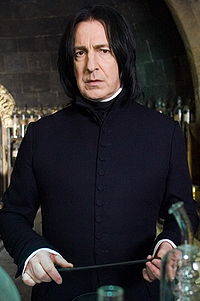 Алан Рикман в роли Северуса Снегга в фильме «Гарри Поттер и Орден Феникса» |
|
| Северус Снегг | |
|---|---|
| Пол | мужской |
| Цвет волос | чёрные |
| Цвет глаз | чёрные |
| Факультет | Слизерин |
| Чистота крови | Полукровка |
| Сторона | Орден Феникса, Хогвартс, Лили Эванс, Гарри Поттер |
| Патронус | безрогая лань |
| Первое появление | «Гарри Поттер и философский камень» |
| Роль в фильмах | Алан Рикман |
Се́верус Снегг (оригинальное звучание фамилии — Снейп, англ. Severus Snape) (9 января 1960 — 2 мая 1998) — самый противоречивый персонаж. Преподаватель зельеварения (1981—1996) и защиты от тёмных искусств (1996—1997) в школе чародейства и волшебства «Хогвартс», декан факультета Слизерин в 1981—1997, директор Хогвартса в 1997—1998.
Содержание
- 1 Биография
- 1.1 Детство
- 1.2 Снегг — Пожиратель смерти. Разглашение Пророчества
- 1.3 Работа в Хогвартсе
- 1.4 Директор Хогвартса
- 1.5 Смерть
- 1.6 После смерти
- 2 Развитие образа в серии романов
- 3 Северус Снегг в фанатской субкультуре
- 4 Имя и фамилия
- 4.1 Происхождение имени
- 4.2 Перевод фамилии
- 5 Генеалогическое дерево
- 6 Озвучивание в фильмах
Биография
Детство
Северус Снегг (русский аналог перевода имени — от «снег», подчеркивающий холодность; исходное английское имя Snape весьма созвучно слову snake — «змея», что соответствует его слизеринской природе) родился 9 января 1960 года в семье чистокровной волшебницы Эйлин Принц и магла Тобиаса Снегга (впоследствии из-за этого он стал называть себя Принцем-полукровкой). Первое воспоминание, сохранённое в Омуте Памяти — отец кричит на мать, а маленький Северус в страхе скорчился в углу. Когда Северусу было около десяти лет, он повстречал соседских девочек Лили и Петунию Эванс и понял, что Лили, как и он, волшебница. Он стал её частым собеседником и много рассказывал о Хогвартсе, где им предстояло вместе учиться. Сестра Петуния завидовала им обоим.
1 сентября 1971 года они сели в поезд «Хогвартс-экспресс», где повстречали Джеймса Поттера и Сириуса Блэка. Узнав, что Северус хочет попасть на Слизерин, Джеймс и Сириус стали дразнить его и дали ему кличку Нюниус (Snivelus) (по другим переводам — Сопливус и Слинявус). В тот же день Лили была распределена в Гриффиндор, а Северус — в Слизерин.
В школе Снегг стал членом группы, включавшей Люциуса Малфоя, Рудольфуса Лестрейнджа, Беллатрису Блэк, Эйвери, Мальсибера и других слизеринцев (все они потом стали Пожирателями смерти). Снегг подвергался постоянным нападкам и издевательствам со стороны Джеймса Поттера и его дружков Сириуса Блэка и Питера Петтигрю, которые (совместно с Римусом Люпином) именовали себя Мародёрами. Причиной нападок была вражда между Гриффиндором и Слизерином, а позднее и соперничество из-за Лили, в которую были влюблены Северус Снегг и Джеймс Поттер. В конце пятого курса Снегг едва не погиб, отправившись в потайной ход под Гремучей ивой, который вел в Визжащую Хижину. Именно там прятался оборотень Римус Люпин во время своих превращений. В тот раз Джеймс Поттер спас Снеггу жизнь. Неизвестно, идёт ли речь о спасении от Гремучей Ивы или от укуса оборотня. Подробностей, описывающих «угрозу» и «спасение» нет ни в одной из 7 книг. Несмотря на благородный поступок Джеймса Снегг не верил в добрые намерения Поттера, и это событие только усилило взаимную ненависть.
Долгое время Снегга защищала его подруга Лили Эванс, в которую он был влюблён, но её сильно пугало отношение Северуса к другим маглорождённым студентам, а также дружба со слизеринцами вроде Эйвери и Мальсибера, увлекавшимися тёмными искусствами и совершавшими жестокие «шутки» над другими студентами. Однажды после экзаменов Мародёры решили пойти к озеру. Джеймс играл с украденным снитчем, Питер восхищался им, Римус читал учебник, а Сириус пожаловался на скуку. И тогда Джеймс выбил у Снегга палочку, заклинанием «Левикорпус» поднял его в воздух и предложил снять штаны. К издевательствам присоединились Питер и Сириус. Лили, увидев это, приказала Мародёрам отпустить Снегга, но нашла его вид очень комичным. Северус в ответ на это обозвал Лили «грязнокровкой». В результате она порвала общение с ним, а через некоторое время начала встречаться с Джеймсом Поттером.
В школе Снегг серьёзно увлекался зельеварением. Кроме того, он изобрёл заклятие Сектумсемпра, наносящее врагам глубокие раны.
Снегг — Пожиратель смерти. Разглашение Пророчества
В 1977 или 1978 году, сразу после окончания школы или на последнем курсе, Снегг вступил в ряды Пожирателей смерти. В 1980 он в одной из комнат гостиницы трактира «Кабанья голова» подслушал часть пророчества Сивиллы Трелони о том, что грядёт человек, который сможет победить Тёмного Лорда. Он рассказал об этом Волан-де-Морту, а тот решил, что речь идёт о сыне Джеймса и Лили Поттер, так как по преданию мальчик, который остановит Тёмного Лорда, родился в конце июля, (помимо Гарри под такое описание подходил еще Невил Долгопупс). Обезумевший Снегг просил Тёмного Лорда не убивать Лили, но тот не откликнулся на его просьбу. Тогда Снегг пришёл к Дамблдору и попросил его спасти Лили. Взамен он пообещал Дамблдору выполнить всё, что тот прикажет. С этого момента Северус Снегг был шпионом Дамблдора и Волан-де-Морта одновременно, но в действительности был на стороне Дамблдора и Ордена Феникса.
Дамблдор не смог защитить Лили и Джеймса. После их убийства Дамблдор убедил Снегга, что единственный способ искупить вину перед Лили Поттер — это спасти её сына Гарри. Снегг согласился. После этого Дамблдор публично объявил Снегга своим тайным агентом, спасая его тем самым от судебного преследования, взял в штат Хогвартса преподавателем зельеварения и назначил деканом факультета Слизерин.
Все что осталось Снеггу — это ждать появления сына Лили в Хогвартсе.
Работа в Хогвартсе
Во время учёбы Гарри Поттера в Хогвартсе (1991—1997) Северус Снегг был деканом Слизерина и профессором зельеварения (а после — Защиты от темных искусств). Он не скрывал своей нелюбви к студентам других факультетов, особенно к гриффиндорцам, и пользовался любым удобным случаем, чтобы снять с них баллы или назначить дисциплинарное взыскание. (В фильме «Гарри Поттер и Кубок Огня» Снегг даже даёт подзатыльники студентам, которые разговаривают на его уроке, но, по мнению некоторых зрителей, такой образ Снегга не сочетается с описанным в книге). Вполне логично, что Снегг был любим слизеринцами и непопулярен среди студентов других факультетов. Гарри относился к нему со смесью страха и враждебности, подозревал в причастии ко многим тёмным делам, творившимся в Хогвартсе.
В 1992 году Гарри Поттер услышал произнесённое Снеггом заклинание Экспеллиармус. Гарри широко использовал это заклинание, в том числе в финальной дуэли с Волан-де-Мортом.
В 1993/4 учебном году (возможно, также ранее и позднее) Снегг, будучи блестящим зельеваром, готовил для Люпина зелье, облегчавшее его страдания и делающее его менее опасным во время превращений. Но после того как Люпин, забыв принять зелье, чуть не убил Гарри Поттера, Снегг разгласил, что Люпин является оборотнем. В результате Римус потерял работу преподавателя защиты от тёмных искусств, а в седьмой книге Волан-де-Морт приказал Беллатрисе Лестранж убить его жену Нимфадору Тонкс за то, что она вышла замуж за оборотня. Беллатриса выполнила приказ в ходе Битвы за Хогвартс. Сам Люпин также был убит в этой битве.
Летом 1995 года, в последний день Турнира трёх волшебников, Волан-де-Морт возродился. После этого Снегг вновь стал двойным агентом, оставаясь верным Дамблдору.
В 1995/6 учебном годах в пятой книге Дамблдор поручил Снеггу учить Гарри Поттера окклюменции. Из-за взаимной неприязни Снегга и Поттера уроки превратились в мучение для обеих сторон. Обучение было безуспешным и прервалось, когда Поттер в отсутствие Снегга подсмотрел его воспоминание об издевательстве над ним Мародёров. Пришедший в ярость Снегг выгнал Поттера.
На 1996/7 учебный год Снегг был переведён преподавать защиту от тёмных искусств — должность, которой он давно добивался. Но ещё летом 1996 года Альбус Дамблдор не смог воспротивиться искушению надеть на руку крестраж в виде кольца (он надеялся воскресить свою сестру, Ариану Дамблдор, которая умерла во время его дуэли с Геллертом Грин де Вальдом) содержащего Воскрешающий Камень, один из трёх Даров смерти. Крестраж поразил его смертельным заклятием. Дамблдор сумел в остатке сил позвать на помощь Северуса. Снегг помог отсрочить смерть Дамблдора. Он запечатал заклятие в руку, но не смог остановить его совсем. Северус Снегг рассказал Альбусу Дамблдору что Волан-де-Морт приказал сыну Люциуса Малфоя — Драко прикончить могущественного волшебника. Тогда Дамблдор в душещипательной беседе с Северусом попросил его убить его, Дамблдора, вместо Драко, чтобы спасти душу последнего.
Незадолго до смерти Дамблдор сообщил Снеггу ещё одну новость: Гарри Поттер, которого Снегг защищал все эти годы, должен пожертвовать собой ради победы над Волан-де-Мортом. Об этом Гарри Поттер должен узнать только когда все крестражи Волан-де-Морта, кроме змеи, будут уничтожены.
Летом 1997 года Снегг, выполняя обещание, убил Дамблдора заклинанием Авада Кедавра. Убийство видел Гарри Поттер, рассказавший о нём другим студентам и преподавателям. В результате Снегг получил клеймо предателя и ненависть Гарри Поттера.
Директор Хогвартса
Убийство Дамблдора действительно позволило Снеггу стать самым доверенным лицом (или самым ценимым сотрудником) Волан-де-Морта. Кроме того, Драко Малфой избежал как убийства (которое бы погубило его душу), так и гнева Волан-де-Морта за проваленное задание. Чтобы ещё больше завоевать доверие Волан-де-Морта, Снегг сообщил ему правильную дату, когда Гарри Поттера будут переправлять из дома Дурслей в другое убежище. Сделал он это по совету портрета Дамблдора. Во время перевозки Гарри, Снегг участвовал в битве и заклинанием Сектумсемпра отрезал Джорджу Уизли часть уха. Как выяснилось впоследствии, он метил в одного из Пожирателей Смерти, но промахнулся.
После того как Волан-де-Морт захватил Министерство Магии, Северус Снегг был назначен директором Хогвартса. Преподавателями Защиты от Тёмных Искусств (переименованных в Тёмные Искусства) и Магловедения были назначены Пожиратели Смерти. Снегг использовал свою должность и влияние, чтобы спасти школьников. Хотя Пожиратели Смерти, ставшие преподавателями, мучили школьников, но ни один школьник не был ими убит.
Кроме того, Снегг послал Гарри Поттеру меч Годрика Гриффиндора и своего Патронуса. Не знавший, что серебристая лань — патронус Снегга, Гарри продолжал его ненавидеть. Преподаватели и студенты Хогвартса по-прежнему считали Снегга предателем и убийцей.
Незадолго до финальной битвы с Волан-де-Мортом Снегг бежал из Хогвартса и присоединился к Тёмному Лорду с целью противодействия его планам.
Смерть
Волан-де-Морт, ошибочно полагая, что Снегг является владельцем Бузинной палочки, убил его при помощи змеи Нагайны, однако перед смертью Снегг успел передать Гарри Поттеру воспоминания, проливающие свет на его истинную роль в деятельности Пожирателей смерти.
После смерти
Гарри узнал истинную подоплёку действий Снегга, посмотрев его воспоминания. Снегг был реабилитирован, и его портрет появился в Хогвартсе наряду с портретами других директоров. В честь Снегга, Гарри назвал своего второго сына Альбус Северус Поттер. Некоторые читатели считают, что в из текста книги нельзя сделать однозначного вывода о смерти Снегга. И что в тексте содержится достаточно намеков на то, что он выжил.
Развитие образа в серии романов
С первого же урока зельеварения Северус Снегг обращается с гриффиндорцами, особенно с Гарри Поттером, резко и несправедливо. На протяжении болшей части первой книги ни читатель, ни Гарри не знают причин его ненависти и постоянных придирок. В результате расследования действий Снегга и обстоятельств, связанных с Тайной комнатой, Гарри, Рон и Гермиона приходят к логичному выводу, что Снегг хочет убить Гарри Поттера и украсть философский камень. Лишь в конце первой книги оказывается, что это пытался сделать не Снегг, а Квиринус Квиррелл. В беседе с Альбусом Дамблдором выясняется, что Снегг противодействовал Квирреллу и защищал Гарри Поттера. Альбус также сообщает Гарри, что в школе Джеймс Поттер был врагом Северуса Снегга, но однажды спас ему жизнь, и теперь Снегг хочет, в свою очередь, спасти жизнь Гарри.
Тем не менее никакого катарсиса или примирения не происходит. Уже в начале второй книги Снегг резко отчитывает Гарри и Рона за несанкционированное использование магии вне школы и советует МакГонагалл отчислить их обоих из Хогвартса. На протяжении книг 2-6 Снегг так же груб и несправедлив с гриффиндорцами, особенно Гарри Поттером, как и в первой книге.
Во второй книге по вине Снегга другие студенты узнают, что Гарри Поттер — змееуст. Это приводит к подозрениям, что Гарри — наследник Салазара Слизерина и занимается тёмными искусствами, в результате на протяжении многих месяцев студенты относятся к Гарри Поттеру со страхом и неприязнью. Но в той же второй книге Гарри Поттер от Снегга узнаёт очень полезное заклинание Экспеллиармус. В третьей книге Снегг разглашает, что Римус Люпин — оборотень, но он же готовит для Люпина зелье, облегчающее его страдания при превращениях. И он же отказывается верить в невиновность Сириуса Блэка.
В пятой книге Гарри Поттер вынужден брать уроки окклюменции у Снегга. На одном из таких уроков Гарри, просматривая воспоминание Снегга в его отсутствие, видит сцену издевательства его отца и других Мародёров над Снеггом. Снегг в ярости выкидывает Гарри из кабинета и прекращает уроки окклюменции. Гарри шокирован поведением своего отца и Сириуса Блэка и гораздо лучше, чем раньше, понимает причины ненависти Снегга к нему.
В начале шестой книги — одна из сцен без участия Гарри Поттера. Беллатриса обвиняет Снегга в том, что он не верен Тёмному Лорду. В ответ Снегг заявляет о своей ему верности, после чего логично и убедительно объясняет свои действия в предыдущие годы. Читатель же остаётся в недоумении: кому на самом деле служит Снегг — Дамблдору или Волан-де-Морту?
После разговора с Беллатрисой, её сестра Нарцисса просит Снегга защитить Драко Малфоя, а также помочь ему выполнить приказ Тёмного Лорда. И Снегг, к изумлению Беллатрисы, соглашается на обе просьбы и скрепляет своё согласие Непреложным Обетом.
В ходе шестой книги подозрения Гарри Поттера против Снегга усиливаются, когда он подслушивает разговор Снегга с Драко Малфоем. В ходе беседы Снегг просит Малфоя открыть ему, в чём заключался приказ Волан-де-Морта, и обещает содействие. Гарри сообщает обо всём Дамблдору, который, однако, заявляет, что по-прежнему доверяет Снеггу.
В финале Гарри становится свидетелем убийства Дамблдора Снеггом. Он рассказывает о происшедшем преподавателям и своим друзьям, и решает отмстить.
С другой стороны, в шестой книге есть два намёка на то, что Дамблдор был убит по его собственному приказу. Один из них — спор между Снеггом и Дамблдором, подслушанный Хагридом. По словам Хагрида, Снегг жаловался на то, что Дамблдор от него требует слишком многое, но Дамблдор настоял на своём. Кроме того, перед смертью Дамблдор умоляет «Северус… прошу тебя..», но не говорит, о чём именно он просит. (Подробнее см. в следующем разделе.)
Книга 7 вновь начинается со сцены с участием Снегга. На собрании Пожирателей Смерти Снегг говорит дату, когда Поттера будут переправлять из дома его дяди и тёти в безопасное место. Он спорит по этому поводу с другим Пожирателем, Яксли, и настаивает на своей точке зрения.
В следующих главах выясняется, что Снегг был прав. Результатом точной информации Снегга становится одновременное нападение многих Пожирателей на Гарри и его друзей. В ходе нападения гибнут Грозный Глаз Грюм (из-за трусости Наземникуса Флетчера) и Букля. Сам Снегг заклятием отрезает ухо Джорджу Уизли.
После захвата власти Волан-де-Мортом Снегг становится директором Хогвартса. Об этом скрывающиеся в зимнем лесу Гарри, Рон и Гермиона узнают из подслушанного разговора.
Перед смертью Снегг, которого Гарри Поттер по-прежнему считает предателем, передаёт ему свои воспоминания. Просмотрев воспоминания, Гарри Поттер (и вместе с ним читатели) узнают истинную подоплёку его действий.
В эпилоге среди прочего сообщается, что Гарри назвал одного из сыновей Альбусом Северусом, а самого Северуса Гарри называет одним из самых храбрых людей, которых он знал.
Северус Снегг в фанатской субкультуре
Поскольку некоторые фанаты считают Снегга самым неоднозначным и интересным персонажем серии книг о Гарри Поттере, у него возникло множество поклонников. Сами фанаты во многом связывают это с исполнением роли Снегга актёром Аланом Рикманом[1]. Фанаты Снегга пишут фанфики, статьи и исследования о Снегге, обмениваются рисунками и фотографиями, связанными с персонажем. Это явление получило название «снейпома́ния» — слово, производное от оригинального звучания фамилии персонажа.
В книге «Гарри Поттер и Принц-полукровка» выяснилось, что Северусу Снеггу одновременно доверяли Волан-де-Морт и Дамблдор. В течение 2 лет до выхода последней книги, вопрос о том, на чьей стороне Снегг (фанаты обычно называют его Снейп), был одной из самых обсуждаемых тем среди посетителей форумов и сообществ, посвящённых серии книг о Гарри Поттере. [2]. Большинство правильно считало, что Снегг предан Дамблдору и был вынужден убить его по его же приказу. Стали появляться списки аргументов в пользу этой точки зрения [3] [4].
Причиной того, что большинство фанатов угадали правду, была фраза Дамблдора «Severus … please …», произнесённая им перед смертью. «For the first time, Dumbledore was pleading». Многие правильно догадались, что это — не просьба о помиловании, а просьба об убийстве, а, возможно, и обманный ход, чтобы всё выглядело правдоподобно. До этого, Хагрид рассказывает Поттеру о случайно услышанной им ссоре между Дамблдором и Снеггом. По словам Хагрида, Снегг что-то отказывался сделать для Дамблдора, однако тот настоял на своём. Большинство фанатов правильно поняли, что Дамблдор требовал от Снегга убить его.
Имя и фамилия
Происхождение имени
Имя происходит от англ. severe (либо непосредственно от лат. severus), что переводится как строгий, суровый, жестокий. Второе значение «severus» — «истина».
Перевод фамилии
Как видно из таблицы в начале статьи, различные переводы фамилии Снегга сильно отличаются друг от друга и от оригинального варианта «Snape». Это вызвано тем, что исходная фамилия имеет неявные ассоциации (в частности, со словами snake — змея и snap — щелчок, отрывистая речь, внезапный мороз, ложь, обман, хитрость), и разные варианты перевода продиктованы стремлением сохранить эти ассоциации — либо с исходными английскими словами, либо с какими-то из их русских аналогов. По причине невозможности одновременно сохранить все ассоциации и перевести их на русский (извечная проблема перевода художественной литературы) среди поклонников до сих пор не утихают споры о том, какой вариант «лучше». Сама Роулинг утверждает, что назвала его в честь деревни Snape в Англии.
Согласно словарю английских фамилий, фамилия Snape — одна из древнейших. Ранее правильным написанием её было «Snaep».
Генеалогическое дерево
| Тобиас Снегг | Эйлен Принц | |||||||||||||||||
| Северус Снегг | ||||||||||||||||||
Озвучивание в фильмах
- Русский дубляж — Алексей Рязанцев (студия Мосфильм для Каро-Премьер)
| Предшественник: Гораций Слизнорт |
Декан факультета Слизерин 1981 — 1997 |
Преемник: Гораций Слизнорт |
| Предшественник: Гораций Слизнорт |
Профессор зельеварения 1981—1996 |
Преемник: Гораций Слизнорт |
| Предшественник: Долорес Амбридж |
Профессор защиты от тёмных искусств 1996—1997 |
Преемник: Амикус Кэрроу |
| Предшественник: Альбус Дамблдор |
Директор Хогвартса 1997—1998 |
Преемник: Минерва МакГонагалл |
|
Волшебный мир «Гарри Поттера» |
|||||||||||||||||||||||
|---|---|---|---|---|---|---|---|---|---|---|---|---|---|---|---|---|---|---|---|---|---|---|---|
| Книги: | Предыстория • Философский камень • Тайная комната • Узник Азкабана • Кубок Огня • Орден Феникса • Принц-полукровка • Дары Смерти • Фантастические животные: места обитания • Квиддич сквозь века • Сказки барда Бидля | ||||||||||||||||||||||
| Фильмы: | Философский камень • Тайная комната • Узник Азкабана • Кубок Огня • Орден Феникса • Принц-полукровка • Дары Смерти | ||||||||||||||||||||||
| Игры: | Философский камень • Тайная комната • Узник Азкабана • Кубок Огня • Орден Феникса • Принц-полукровка • Чемпионат мира по квиддичу • Lego Creator: Гарри Поттер • Lego Creator: Harry Potter and the Chamber of Secrets | ||||||||||||||||||||||
| Персонажи:
|
|
||||||||||||||||||||||
| Организации: | Хогвартс (Факультеты) • Министерство магии • Орден Феникса • Пожиратели смерти • Отряд Дамблдора • Ежедневный пророк • Придира • Клуб слизней • Г.А.В.Н.Э. • Инспекционная дружина | ||||||||||||||||||||||
| Дисциплины Хогвартса: |
Защита от тёмных искусств • Зельеварение • Трансфигурация • Заклинания • Уход за магическими существами • Травология • Прорицания • Древние Руны • Арифмантика • Маггловедение • История магии • Астрономия | ||||||||||||||||||||||
| Локации: | Локации мира Гарри Поттера • Большой Зал | ||||||||||||||||||||||
| Значимые события: |
Турнир Трёх Волшебников • Битва за Хогвартс | ||||||||||||||||||||||
| Пародии и подражатели: |
Порри Гаттер • Таня Гроттер • Ларин Пётр • Барри Троттер • Наука побеждать • АнтиГарриПоттер | ||||||||||||||||||||||
| Дж. К. Роулинг • Warner Brothers • Bloomsbury • Electronic Arts • Росмэн • Фэндом |
Wikimedia Foundation.
2010.
- Ronald Weasley: «You asked us a question and she knows the answer! Why ask if you don’t want to be told?«
- Severus Snape: «Detention, Weasley. And if I ever hear you criticise the way I teach a class again, you will be very sorry indeed.«
- — Severus Snape gives Ronald Weasley detention after defending Hermione Granger[src]
Professor Severus Snape (9 January 1960[1] – 2 May 1998)[2] was an English half-blood[3] wizard serving as Potions Master (1981-1996), Head of Slytherin House (1981-1997), Defence Against the Dark Arts professor (1996-1997), and Headmaster (1997-1998) of the Hogwarts School of Witchcraft and Wizardry as well as a member of the Order of the Phoenix and a Death Eater. His double life played an extremely important role in both of the Wizarding Wars against Voldemort.
The only child of Muggle Tobias Snape and witch Eileen Snape (née Prince), Severus was raised in the Muggle dwelling of Spinner’s End, which was in close proximity to the home of the Evans family, though in a poorer area. He met Lily and Petunia Evans when he was nine. He fell deeply in love with Lily upon their meeting and became a close friend of hers.[7]
Severus started at Hogwarts with Lily in 1971, where he was sorted into Slytherin House. This put him in the same year as Lily but unfortunately for him she was sorted into Gryffindor House. Severus became the immediate enemy of James Potter and Sirius Black and was a frequent victim of their bullying. This led him to be irritable towards James’s son Harry when he was a professor. Snape, when young, developed a passion for the Dark Arts, which increased as his desire for revenge against his bullies grew stronger.
Snape became involved with the bullies in Slytherin House, many of whom were pure-blood supremacists. This put his friendship with Lily, a Muggle-born, under great strain until it was eventually broken in their fifth year.[6][7] In a misguided attempt to win back Lily’s affections,[18] Snape joined the Death Eaters along with a group of his fellow Slytherins.
Severus was made a member of the Slug Club presumably because of his talent in Potion-making. Horace Slughorn even kept a picture of him as a student, clutching his copy of Advanced Potion-Making. However, Horace did not actually have many hopes for Severus’s future, as his photograph was kept behind many others.[19]
As an active Death Eater, one of Snape’s biggest contributions was letting Lord Voldemort know about the prophecy Sybill Trelawney made to Dumbledore. This part of the prophecy could have applied to either Harry Potter or Neville Longbottom, who was also born at the end of July 1980 to parents who were members of the Order. Once Lord Voldemort decided to target the Potters over the Longbottoms, Snape begged Voldemort to at least spare Lily. Voldemort agreed, then did not follow through on this promise.
Shortly before Lily Evans was murdered by Lord Voldemort, Snape changed sides and became a member of the Order of the Phoenix as well as a double agent during the Second Wizarding War. With tremendous difficulty, Snape prevented Lord Voldemort from learning the truth about his loyalties.
Despite the opinions of most others including Harry during his early life, Albus Dumbledore trusted Snape for reasons that were kept between them both until their deaths. Despite Snape killing Dumbledore, it is learned that they had a special agreement for him to do so. When he died, it was revealed that his deep strong love for Lily Evans caused him to redeem himself, joining Dumbledore’s cause for her protection (and, after her death, that of her son) from Lord Voldemort.[7]
The relationship between Dumbledore and Snape would be one of unusually strong loyalty, so much so that Snape agreed to kill Dumbledore upon the latter’s own request. Before Dumbledore’s death, Snape promised to protect the students of Hogwarts from the Death Eaters, who would inevitably take control of the Ministry of Magic as well as the school.[7]
Snape later participated in the Battle of Hogwarts but was murdered by Lord Voldemort who mistakenly believed that Snape was the master of the Elder Wand (an immensely strong and powerful wand that Voldemort deeply desired, as well as one of the Deathly Hallows)[20] when in reality, Harry Potter was the master of the Elder Wand, because Draco Malfoy had disarmed Dumbledore on the night of Dumbledore’s death on top of the Astronomy Tower, and Harry had disarmed Draco at Malfoy Manor.[21]
After Snape’s death, Harry Potter ensured that his portrait remained at Hogwarts, honouring him as a hero, despite their significant personal differences.[21] In addition, Harry later named his second son Albus Severus Potter in honour of Dumbledore and Severus, both of whom were an inspiration in Harry’s life after the Battle of Hogwarts. Harry also was influenced by Severus’ Hogwarts house, and freely admitted that his son Albus could choose Slytherin if he wished.[22]
Biography
Early life (1960–1971)
- Lily Evans: «Doesn’t your dad like magic?«
- Severus Snape: «He doesn’t like anything, much.«
- — Discussion of Snape’s family and home life[src]
Severus Snape was born 9 January 1960 to Tobias Snape, an abusive Muggle, and Eileen Prince, a neglectful pure-blood witch.[23] He began to identify with his mother’s family and created a secret nickname from his mother’s maiden name, calling himself the «Half-Blood Prince». His unhappy relationship with his father may have been the origin of his disdain for Muggles. It is implied that Severus was friendless and uncared for by his parents. This lack of care largely shaped Severus’s bitter disposition and cruel behaviour later in his life.
A young Snape crying in his home at Spinner’s End
Severus grew up at Spinner’s End, a shabby suburb of Cokeworth.[24] This area of town was near a dirty river and full of dilapidated houses, disused factories and broken down street lamps. Through the rest of his life, Severus continued to return there when he was not at school. The young Severus is depicted as being unwashed and wearing ill-fitting clothes «that were so mismatched that it looked deliberate«. As a child, Severus was neglected and his parents often fought with one another. He could not wait to leave for Hogwarts at the end of the summer.[7]
Snape telling Lily that she is a witch
Lily Evans and her family lived in the same town, close to Spinner’s End. After watching her for some time, Severus noticed her evident magical abilities and began making friendly overtures. The two bonded quickly and it appears that he was very interested in Lily right from the beginning, though she only regarded him as a good friend. During this time he also developed a contempt towards her older sister, Petunia. This was most likely because she made disparaging comments about his clothes and residence but may also be because she was a Muggle.[7]
Information from Severus’s own memories of his first interactions with Lily and Petunia suggests that he was an awkward child with poor social skills. Even when it was important to him to make a good impression, he always seemed to have trouble doing so.[7]
Hogwarts years (1971–1978)
- James Potter: «‘Gryffindor, where dwell the brave at heart!’ Like my dad. Got a problem with that?«
- Severus Snape: «No. If you’d rather be brawny instead of brainy —«
- Sirius Black: «Where are you hoping to go, seeing as you’re neither?«
- — James, Snape, and Sirius have an unpleasant first meeting[src]
Snape looking at Lily shortly before being Sorted into Slytherin
Severus attended Hogwarts School of Witchcraft and Wizardry as a student from 1971-1978 and was Sorted into Slytherin House, at that time led by Potions master Horace Slughorn. On the way to Hogwarts for his first year, Severus sat with Lily Evans on the train. While on the train they met James Potter and Sirius Black. This encounter between the three of them revolved around a disagreement regarding what Hogwarts house was the best. This hostile first encounter would set the tone for the antagonism between the three of them for the rest of his life.[7]
Sorted into Slytherin House upon their arrival at the school, classmates would later state that Severus excelled in the Dark Arts from an early age. At the age of eleven, he knew more curses and hexes than most of the seventh year students, according to Sirius Black.[25] He was credited with creating a good number of popular spells like Levicorpus, Liberacorpus, Muffliato, and curses like Langlock, the Toenail Growth Hex, and his signature curse that he invented himself, Sectumsempra.[26] He reportedly was friends with a gang of Slytherins who later became Death Eaters, including Avery, Mulciber, Bellatrix Black, Rodolphus Lestrange, Evan Rosier and Wilkes.
Severus also had contact with Lucius Malfoy, who was a prefect during his first year and greeted him kindly when he was Sorted into the Slytherin House.[7] Most likely the two had good rapport at Hogwarts (which could also be a reason why Narcissa Malfoy trusted Severus to take care of Draco Malfoy and why he seemed to favour Draco during his later teaching years even when Draco refused it in the task to kill Dumbledore).
Snape in his fifth year studying by the Black Lake
Remus Lupin and Peter Pettigrew were also classmates of Severus.[6] Around the same time, he also got acquainted with another notorious troublemaker; a Fifth year student by the name of Patricia Rakepick who not only was in the same house as his new school rivals, but also actively sought to mentor her younger schoolmates in the art of mischief-making without getting caught: While popular with many of their peers for her, she was, on the other hand, strongly disliked by most of the teachers for her excessive rebellious streak, frequent rule-breaking and the bad influence she was on her younger housemates.[27]
No less discontent with her behaviour than their professors were, Severus’s mistrust in Rakepick ran deeper still; she was an avid advocate for the existence of the fabled Cursed Vaults of Hogwarts. While her claims were dismissed by the faculty of the day, young Snape, however, was not so certain; seeing her as uncommonly ambitious for a Gryffindor and, he recognised, far from stupid, he eventually came to question her motives and her intentions for the vaults, eventually coming to regard her as a danger to the school and all who resided at the castle.[28]
James and his group of friends were constantly at war with Severus throughout their school years. Severus’s memories, recorded in the Pensieve, suggest that he was an introverted and studious individual, whereas James was arrogant, popular and athletic. Immediately upon meeting him, James disliked Severus for expressing a desire to be in Slytherin. James’s big crush on Lily, and Severus’s close friendship and unrequited love for her also heightened the tension between the two.[6][7]
Snape being bullied by the Marauders
One recorded memory in the Pensieve bore witness to James bullying him, turning him upside-down to reveal his underwear in front of many students, including Lily. This action was proved to be very offensive and it increased the hatred between the two adolescents. In this accident, Lily came to Severus’s defence, but this only made things worse: in a subsequent lashing out at James in an attempt to recover his lost dignity, Severus inadvertently called Lily a Mudblood. Lily refused to forgive him for it, even after his repeated apologies. This would forever be Severus’s worst memory.[6]
Severus noticed that Remus kept disappearing during the full moon and once followed him past the Whomping Willow (after being tipped off on how to do so by Sirius Black) to confirm his suspicions. This act could have cost Severus his life, as had it not been for James going after him to stop him when he learned of Sirius’ ‘prank’, he might have found himself all on his own and caught off guard by a fully-fledged werewolf. As it was, however, James did reach Severus in time and managed to save him just before he got to the Shrieking Shack while Remus was in his wolf-form. Albus Dumbledore swore Severus to secrecy, but the true nature of Remus was clear to Severus. By their seventh year, James had grown out of his immaturity and arrogance to the point that Lily agreed to start dating him, even though he never grew out of his hatred for Severus — according to Sirius, Severus had always been a «special case» with James. Though it should be noted Snape’s continued friendships with students who were trying to become Death Eaters did not help his relationship with the Marauders or Lily. Lily ended up marrying James, which only strengthened Severus’s bitterness towards him.[29]
There was also some overlap between his school career and that of a younger student by the name of Jacob, yet another rule-breaker Snape came to severely dislike. During the later part of his magical education, the school was plagued by several dangerous curses unleashed upon the school by Jacob after he tampered with the fabled Cursed Vaults, which resulted in the death and injury of several of his peers, although he suffered no permanent injury himself.
Half-Blood Prince
- «This book is the property of the Half Blood Prince.«
- — The inside cover of the textbook[src]
Severus Snape authoring curses of his own making
Severus was a talented wizard even in his childhood. It was apparent through the notes and scribbles in his potions textbook that he made time during classes to invent curses, charms, and clever potion innovations, while simultaneously learning the required textbook lessons.[30][26]
Severus’s potions textbook contained a few spells and curses which he was credited with inventing: Levicorpus, which grabbed the victim by the ankle and dangled him/her upside-down,[31] and Sectumsempra, which caused slashing bloody cuts (guided by the wand gestures of the caster, like a blade/sword) which bled extensively.[32] Levicorpus somehow escaped from Severus’s secrecy, and became very popular around Hogwarts towards the end of his fifth year at school. Some other spells included Muffliato, which filled the ears of anyone nearby with an unidentifiable buzzing sound and another hex that caused toenails to grow at an unnaturally fast rate.[31]
Severus’s book later fell into the hands of Harry Potter in September 1996. Harry used the Half-Blood Prince’s tips and earned praise with that year’s Potions master, Professor Slughorn. Harry considered the Half-Blood Prince to be a better teacher than Severus, unaware at that point that Severus was the Prince, much to Harry’s later displeasure.[26]
The Half-Blood Prince’s many annotations and corrections
The potions textbook has an inscription indicating it is Property of the Half-Blood Prince.[30] Hermione Granger’s research revealed that Prince was the maiden name of Severus’s mother and so the nickname was revealed to be a combination of his mother’s maiden name and his blood status. Harry Potter also pointed out the similarities between Snape’s nickname and the name Voldemort gave himself. This nickname was apparently a secret, as Remus did not remember it ever being used publicly by Severus.
First Wizarding War (1978–1981)
As a Death Eater
- «The one with the power to vanquish the Dark Lord approaches… Born to those who have thrice defied him, born as the seventh month dies….«
- — The part of Sybill Trelawney’s first prophecy that Snape overheard[src]
Snape during his time as one of Lord Voldemort’s Death Eaters
Severus Snape eventually joined the ranks of Lord Voldemort’s Death Eaters. His actions as a Death Eater are largely unknown, though he quickly became an important Death Eater in Voldemort’s inner circle. He was the spy responsible for informing Voldemort about the prophecy foretelling his downfall. In early 1980, Snape eavesdropped on an interview for Divination Professor Sybill Trelawney and Albus Dumbledore at the Hog’s Head Inn.
In the course of the interview, Trelawney prophesied that at the end of July, a child would be born who would cause the destruction of Lord Voldemort (which prompted Dumbledore to hire her, partly for her own safety). At that time it was not clear who was meant by the prophecy. Two children of prominent wizarding families were born that year at the end of July: Harry Potter and Neville Longbottom.
Albus reported at the Wizengamot trial of Igor Karkaroff that Severus had come to him and explained that he had been the one to overhear the prophecy, and reported it to Voldemort. However, Snape did not hear the entire prophecy, as the Hog’s Head’s barman and Albus’ brother, Aberforth, caught him eavesdropping and threw him out.
As a double agent
- Albus Dumbledore: «If you loved Lily Evans, if you truly loved her, then your way forward is clear. You know how and why she died. Make sure it was not in vain. Help me protect Lily’s son.«
- Severus Snape: «Very well. But never — never tell, Dumbledore! This must be between us! Swear it! I cannot bear… especially Potter’s son…«
- — Snape promises to protect Harry after Lily’s murder[src]
Snape arrives at Potter cottage after Lily and James were murdered
Severus suffered terrible remorse when Voldemort decided that Harry Potter was the subject of the prophecy and that Lily Evans, the woman whom he always loved, was now in danger as a result of his actions. He begged Voldemort to spare her, who agreed. However, knowing that he could not leave Lily’s safety in the hands of someone who could turn back at his word on a mere whim and that Lily would probably defend her child to the last breath, Snape also approached Albus Dumbledore to ask him to save Lily.
Snape pleaded with Dumbledore to hide her, along with her husband and son if he had to. Dumbledore agreed but insisted that Severus serve him as a spy among the Death Eaters. In fact, it was Snape’s request to Voldemort which allowed Lily to let herself die in order for Harry to live when Voldemort attempted to murder him, therefore ensuring that his curse backfired and Voldemort’s body was destroyed in the process.
Snape showing his love for Lily Evans, even after her death
Despite Dumbledore’s best efforts to protect the Potters, Voldemort was tipped off by Peter Pettigrew, one of James’ best friends, a spy, and he found them anyway. After Lily’s death, Snape was devastated and distraught to the point of wishing himself dead, but Dumbledore urged him to ensure Harry’s safety out of respect for Lily’s memory; Snape initially insisted the danger had been averted with the Dark Lord gone, only for Albus to insist that he would return and everyone, particularly the boy, would be in danger when that happened. So Snape spent the rest of his life protecting her child, Harry Potter, who was often said to strongly resemble James. Distrusted for his past as a Death Eater by those on Albus Dumbledore’s side, and hated by other Death Eaters for living as Dumbledore’s stooge for ten years, Snape continued living on to complete Dumbledore’s plan to protect Harry and defeat Voldemort.
Career at Hogwarts (1981–1995)
- «You are here to learn the subtle science and exact art of potion-making. As there is little foolish wand-waving here, many of you will hardly believe this is magic. I don’t expect you will really understand the beauty of the softly simmering cauldron with its shimmering fumes, the delicate power of liquids that creep through human veins, bewitching the mind, ensnaring the senses… I can teach you how to bottle fame, brew glory, even put a stopper in death — if you aren’t as big a bunch of dunderheads as I usually have to teach.«
- — Snape teaching Potions at Hogwarts[src]
Severus Snape as Potions Master
When Severus Snape began his teaching career at Hogwarts in 1981, taking up a teaching post around the same time as the threat posed by the rampaging curses that had terrorised the castle’s residents were contained and the subsequent expulsion of his former peer for the rules he had broken in his quest for the Cursed Vaults and the fellow students who had been endangered in the process, he initially applied for the position of Defence Against the Dark Arts teacher, but was rejected multiple times.[33]
Many students were under the impression that this was because Dumbledore feared Snape might return to his old ways if allowed to teach his favourite subject, but in reality it was because Dumbledore was aware by that point that the job had been jinxed by Voldemort. Knowing that no Defence Against the Dark Arts teacher would last longer than a year, Dumbledore instead employed Snape in the position of Potions Master and Head of Slytherin House, following the retirement of veteran Potions Master Professor Horace Slughorn. Though it seemed rather uncommon for someone as young as Snape to be named a Head of House at Hogwarts, it is possible that Snape was the only Slytherin teacher left at the school, or that he was placed there to keep a watchful eye on the young Slytherins, who were frequently accused of (but not without reason) joining the Death Eaters.
Following Voldemort’s fall, Snape never attempted to find his old master, having switched sides ever since the Dark Lord had targeted Lily and this allowed him to avoid time in Azkaban as Dumbledore staunchly defended him. He fabricated the fact that he believed Voldemort to be dead as an alibi for still loyal Death Eaters, but in truth, he and Dumbledore had discussed Voldemort and knew he would inevitably return, henceforth the most important reason why he applied as a teacher: to ensure from the shadows the safety of Harry Potter, who Lily had died protecting. This would bring him into conflict with fanatical Death Eaters like Bellatrix Lestrange later in life, but Snape was almost immediately forgiven by the reborn Voldemort, because he could provide him with thirteen years of information on Dumbledore and the Order of the Phoenix.
Snape teaching a Potions class
In the meantime and with Voldemort vanished, he focused on his teaching duties at Hogwarts. As a professor, Snape was a stickler for discipline, with little patience for foolishness, yet extremely effective in his job and well respected by the other professors. His deep understanding of potion brewing, as shown by his expert concoction of Wolfsbane Potion,[34][29] transformed the knowledge of potions from mere chemistry to an art.
He would accept students into his N.E.W.T. classes only if they had achieved an ‘Outstanding’ mark at their O.W.L. examination. He felt that anyone with a lower mark than that would lack the passion and the devotion to the complex and demanding subjects that would follow in the last two years of school. Though strict, Snape had an obvious bias for Slytherins, giving them undeserved rights over the others, while looking down on the other students somewhat unfairly. His interpersonal relations with students outside his own house were subpar at best. He would, on numerous occasions, bully students without any repercussions. Though, one might dispute if his distain for Neville Longbottom was more about bullying or about the fact Voldemort had chosen to target the Potters over the Longbottoms, and if he’d picked the Longbottoms instead, Lily Potter would perhaps still be alive. He once threatened to poison Neville’s pet toad, Trevor, or tell Neville how stupid he was. Once he even told Hermione Granger that her enlarged teeth were the same size as usual, neither of which were necessary behaviours.
Snape in his classroom preparing a Potions lesson
Snape’s role during this entire time was extremely sensitive and required master espionage and image-control skills. As he and Dumbledore anticipated that Voldemort would return eventually, and many of Snape’s actions would be reported on by Death Eater spies or gained through torture and Legilimency, even if Snape’s true mentality and intentions were inaccessible to the Dark Lord, he had to consider every decision and relationship carefully. He treated Harry Potter with maximal coldness and never missed an opportunity to cause him trouble, as any variation from this would have cast suspicion on him in Voldemort’s eyes.
But in reality, he protected Harry on numerous occasions; he was happy enough to cause the boy, who resembled his father, Snape’s hated rival from school days, humiliation and trouble, but never any actual harm or danger as he was still Lily’s son. He also had to avoid becoming too aware of Voldemort’s plans, so as to avoid being held responsible for allowing Harry and his friends to foil them. His actions during this period created no mistrust on the part of Voldemort, which allowed for Voldemort’s ultimate downfall.
1984–1985 school year
- Argus Filch: «Is it true that the vaults are filled with gold and powerful prophecies and artefacts from before Hogwarts existed? And that’s why that Jacob boy lost his mind trying to find them?«
- Severus Snape: «Don’t worry about what’s inside the vaults. Worry about keeping everyone out. Lock the door and keep it guarded.«
- — Snape and Filch discusses the first sign that someone has tampered with the Cursed Vaults[src]
Snape at the Welcoming Feast
Closing in on the first half a decade of his tenure as an instructor at Hogwarts, Professor Snape was present at the Start-of-Term Feast of the 1984–1985 school year, during which he was introduced to the new first-years as the Head of Slytherin House during the Sorting Ceremony. He witnessed the sorting of, among others, the younger sibling of Jacob, who was sorted into the same house as Jacob and of whom he became immediately suspicious.[35]
During the very first day of teaching the first years, he instructed the newcomers in the correct way in which to brew a Cure for Boils, during which he made no attempt at hiding his dislike for Jacob’s cognate, and openly favoured Merula Snyde,[36] a student in his own house and whose parents had been among his own comrades during his time as a Death Eater, presumably both due to his bias towards his own house, as well as part of maintaining his cover as a future double agent. Throughout the year, he proceeded to teach this class, among other things, the Wiggenweld Potion,[37] the Herbicide Potion[38] and the Sleeping Draught.[39] Throughout the term, however, Professor Snape found himself reluctantly acknowledging the said student’s talent.
At that time, there was unfinished business between Jacob’s sibling and Merula Snyde, since Merula tried to attack Rowan Khanna, Ben Copper and Jacob’s sibling; so both of them were trying to be prepared for the inescapable duel; as Jacob’s sibling’s prefect had told them, they needed to learn an offensive spell, an advantage charm, and a healing potion or charm. Both of them were looking forward to the Wiggenweld Potion and Snape’s class. Snape’s favourite student, Merula, asked him to teach the class the potion, though coincidentally Snape had already planned to teach it, as Rowan had notified Jacob’s sibling earlier. When the class brewed their potions, Snape admired Jacob’s sibling’s potion skills, though he admired Merula’s more.[37]
Snape in the 1980s
Sometime later, Snape and the school’s Charms Master Filius Flitwick were made aware of how there were to be an unsanctioned duel between Jacob’s sibling and Merula Snyde in the Clocktower Courtyard, arriving just in time to see the latter successfully deprive their opponent of her wand. Although Professor Filius Flitwick wanted to know who it was that cast the first spell, keeping in mind that Jacob’s sibling had been instructed to only ever use the Disarming Charm defensively, Snape was largely dismissive of who started the fight.[40]
After subtly criticising his colleague, whom he correctly deduced were the one who had instructed said student in how to cast the Disarming Charm in the first place, he ordered both students to get cleaned up and meet up at the West Tower in order to receive punishment for their transgression.[40]
Upon reporting the incident to Albus Dumbledore, Snape asked for Jacob’s sibling to be expelled, whom he regarded as a troublemaker just like their brother before them, a request the Headmaster rejected, and which he would soon thereafter lament about in the presence of both Jacob’s sibling and Snyde. Although he docked twenty points from the former’s house, he was interrupted by the caretaker of the day, Argus Filch, before he could do anything else. Upon being informed about an incident that had occurred that demanded his immediate attention that was related to the Cursed Vaults, Snape ordered both students to return to their common rooms.[40]
Accompanying the caretaker to a corridor on the fifth floor, Mr Filch explained that he and his pet cat, Mrs Norris, had discovered how cursed ice had appeared in one of the rooms there. Immediately recognising this as one of the curses unleashed when someone had tampered with the Cursed Vaults, Snape immediately ordered Filch to lock the door and stand guard to prevent students from getting inside, before he left to inform the Headmaster. In the aftermath of this discovery, the faculty successfully managed to keep it from spreading any further and securely sealed up the room afterwards, although he was unaware the two students he had just left had followed them and overheard portions of his conversation with Filch and resolved to break into the room in order to look for clues regarding the whereabouts of the vaults.[41]
Snape speaking with Jacob’s sibling
During the Herbicide Potion lesson, Merula made a mistake, and Jacob’s sibling helped her to fix it. Unbelievably, when Snape understood it, he awarded Jacob’s sibling with 10 points.[38]
Throughout the rest of the year, he presumably continued to keep a sharp eye on the students, especially Jacob’s sibling, and do everything he could to keep the discovery from the student body, in which he was ultimately unsuccessful.[42]
Also he wanted to harvest the fairy wings for his potion ingredients. Rubeus Hagrid asked Jacob’s sibling to move fairies to another place, so it happens to be a quest for them to save the fairies’ wings. Jacob’s sibling set out to move the fairies, though a fairy had gone to the Potions Classroom. Penny Haywood went to the classroom in order to help Jacob’s sibling and the fairy as well. They thought of Jacob’s sibling distracting Snape while Penny tried to make the fairy co-operate, while Snape believed she was looking for her favourite quill that her mother had given her. It is possible that Jacob’s sibling distracted him with asking about Bottling Fame, or his hair, or about his well-being.[43]
At the Hallowe’en feast, Jacob’s sibling needed some Aconite for the Wolfsbane Potion in order to help the werewolf Chiara Lobosca. Rowan Khanna distracted Snape to allow Jacob’s sibling to steal from his store of ingredients.[44]
1985–1986 school year
- «I mentioned Harry Potter in Potions, and Snape threw a jar of pickled animal parts at me.«
- — An unidentified first-year[src]
Snape and McGonagall freeing Ben Copper from the cursed ice
Around the beginning of the year, Snape assisted Professor McGonagall with using the Fire-Making Spell to free Ben Copper from the cursed ice. At some other point early on in the year, Snape became livid when a first-year mentioned Harry Potter in class, and hurled a jar of pickled animal parts at him.[45] During the Teacher Appreciation Celebration that year, Snape was interviewed by Penny Haywood.[46]
After these events, Snape searched Jacob’s sibling’s dormitory and found some potion ingredients that were useful against the Cursed Vaults, so he asked them in the classroom to explain it in order to defend themselves, though it was revealed that the evidence was a plot carried out by Merula.[47]
1986–1987 school year
Jacob’s sibling finding a transfigured note
Snape continued his job as Potions Master at Hogwarts, and tried to prevent students’ interference in the Cursed Vaults. He ordered Argus Filch to retrieve Jacob’s note, which was an untransfigured black quill, from Jacob’s sibling.[48]
Jacob’s sibling stole the black quill, and with the help of Tulip Karasu, became one step closer to the third Cursed Vault. Tulip also helped them find their brother’s corridor at Hogwarts, although it was protected with a two-lock padlock and an Anti-Alohomora Charm. Since Tulip had the key to one of the locks, and the other one was in the possession of her former friend, Merula Snyde, they took the key from her after letting off a Dungbomb. When they opened the door, Jacob’s sibling confronted a Boggart in the form of Lord Voldemort. In time, Severus Snape found them and warned Jacob’s sibling that they had to let go of the Cursed Vaults unless they wanted to share Jacob’s fate — expulsion.[49]
During Jacob’s sibling’s career advice to William Weasley, they took him to Professor Snape’s classroom, in order to seek advice about potioneering. Professor Snape asked them to brew an original potion, so he’d be able to make his decision according to their performance. It’s unknown what Jacob’s sibling chose to brew, though it was either a Contortion Potion, a Screaming Potion, or a Stamina Potion. After the potion was brewed, at least one of them drank it on Snape’s order, as «drinking the potion is the only way to measure your success» according to Snape. The poorly brewed potion made the drinker sick, thus Snape questioned Bill’s potioneering skills.[50]
1987–1988 school year
- «I don’t believe she’s working alone, and I believe at least one of her co-conspirators is a student in Slytherin.«
- — Snape on Rakepick’s investigation for the Cursed Vaults[src]
This year began with an old untrustworthy enemy of Severus, and also an old classmate of his, Patricia Rakepick, a Curse-Breaker from Gringotts Wizarding Bank, arriving at Hogwarts, invited by Albus Dumbledore.[51]
Rakepick and Snape talking while standing next to a sleepwalking student
Jacob’s sibling became to suspect Madam Rakepick, therefore they accosted Snape, in one of the Potions study sessions, and asked him about the new Curse-Breaker. After the session, he told them about Rakepick and the fact that she couldn’t be trusted and how dangerous she was. Though he called it unwise to question Dumbledore’s judgement without substantial evidence, as the Headmaster trusted Rakepick.[27]
A little while later, when Jacob’s sibling was planning to fly to the next Cursed Vault in the Forbidden Forest, Professor Snape broke Jacob’s sibling’s borrowed broomstick and sought an unexpected help from Jacob’s sibling with revealing Rakepick’s true intention.[52] In addition to Snape’s unexpected request, he revealed an unexpected fact, telling them that Rakepick had been monitoring and spying Jacob’s sibling ever since she arrived at Hogwarts. Thus he asked them to spy on her.[28]
Jacob’s sibling spied on her many times while taking orders from Snape, although Snape admitted them spying on her was totally useless, since she said whatever she wanted Severus to know and also she knew they were spying. Nevertheless, he warned them not to tell any of this to anyone.[28]
He also gave Jacob’s sibling a Garrotting Gas[28] that would later save their and Merula’s life from Rakepick’s Cruciatus Curse in the Buried Vault.[53]
At the end of the year, Madam Rakepick won the Defence Against the Dark Arts Professor title against Snape.[54]
1988–1989 school year
Snape’s robes being set alight with this charm
This year began while Snape’s hatred of Rakepick was more intense than ever.[54]
During Jacob’s sibling’s search for the fifth Cursed Vault and the Marauder’s Map, he faced Peeves multiple times. One of these times they were searching for a friend of Jacob’s, Duncan Ashe. Peeves mentioned that he, Duncan Ashe, hated two things, potions and Jacob, though he loathed Jacob more than potions, so Jacob’s sibling went to Snape, in order to gather information about Ashe. Snape revealed to them that he never liked the Marauders and somehow disappointed them.[55] In addition of their searches, Penny Haywood, one of the victim’s sister, was very concerned about the Cursed Vaults that she would not do what she was gifted in — potioneering. Therefore, Severus, who though she would have a good career in potioneering, although due to what happened to her sister Beatrice, his mind had changed and somehow he was disappointed. A fair warning from him to Jacob’s sibling would make them think about Miss Haywood. And this would help Haywood and Jacob’s sibling control themselves and try to find a way to break the last curse and free both Jacob and Beatrice.[56]
Though, on Dumbledore’s order, he was willing to help Jacob’s sibling with mastering Legilimency and Occlumency. Thus, Jacob’s sibling was taught by Severus Snape, a decent Legilimens and Occlumens. Severus Snape asked them to defend themselves against him casting Legilimens on Jacob’s sibling, and he also revealed some of their secrets. And he believed that Jacob’s sibling had not even tried to not let Severus get into his thoughts, and thought it settled the fact that Jacob gave them visions from a far distance. He also demanded them, twice, to cast the spell on him, and this proved to Jacob’s sibling the power of Occlumency.[57]
Later, while inventing the Star Shower Spell, Jacob’s sibling went to Merula and Professor Snape. While Professor Flitwick approved of their spell, it was later revealed that this was not the Star Shower Charm but Star Shimming Charm. Professor Snape perceived the issue and helped Jacob’s sibling fix this.[58]
Snape was also seen with Poppy Pomfrey and Albus Dumbledore while coming in order to take see what has happened to Merula Snyde after Rakepick’s betrayal in the Buried Vault.[59]
Madam Rakepick was seen while using Lacarnum Inflamari on Snape’s cloak.[60]
During Jacob’s sibling’s mental examination on Scabbers for his odd behaviour, Percy Weasley, Charles Weasley, and Jacob’s sibling met each other multiple times at the Great Hall. Because they had Scabbers, Snape warned them that a rat must not be in the Great Hall. The second time, when Jacob’s sibling’s rat was also present, and while there was a fight between Charles and Percy, Snape asked them «kindly» to discuss their «nothing» somewhere else without disturbing anyone; though because of his perfect sense of smell, he smelled some rats, though both of the rats escaped; when Snape left, the students searched for Scabbers and Jacob’s sibling’s rat, and after they found them, they continued their research. Their research ended up with Silvanus Kettleburn suggesting borrowing Rat Tonic from Professor Snape in order to calm the rat from the anxiety he had because of an unknown source of fear. After convincing Snape, he helped Charles and Jacob’s sibling with instructions and ingredients, and they brewed the potion. Percy arrived with Scabbers, and with the presence of Snape, Jacob’s sibling finally understood that what the rat feared was the professor, unbeknownst to them his lifelong enemy.[61]
1989–1990 school year
This school year began with Snape’s old enemy, Madam Rakepick, being fired after her betrayal.[62]
This year at Hogwarts was also as dangerous as the other years, or perhaps more so. Not so later from the start of the year, Beatrice Haywood found a Petrified student because of the statue curse. Thus, she notified the Potions Master, Severus Snape, and then they notified Jacob’s sibling and their examination result was that the Petrified student had some texture, the same as the Merpeople Trident that he found in the Buried Vault.[63] Also Professor Snape was seen while he was talking about the statue curse with Headmaster Dumbledore.[64]
Madam Rakepick used to store so many dark and cursed items in her classroom, after her betrayal and expulsion, Argus Filch, collected her cursed items and Severus Snape took the items from the caretaker in order to break their curses. While Jacob’s sibling was searching for the items, they and Merula Snyde found Professor Snape while brewing Veritaserum; and he told them that he was unable to break the curses, therefor he gave them to the only one who could break the curses — Headmaster Dumbledore.[65]
Severus Snape, once had been ordered to retrieve Jacob’s sibling when Madam Poppy Pomfrey was Petrified with the Statue Curse, and unfortunately, it meant that there was no one to take care of the Petrified students or the students that had any kind of illness. So after an announcement taken by the Headmaster, students had to visit Snape or Sprout, if they had any kind of symptom of illness.[66] He most likely he taught the students the Cough Potion after her Petrification, because of Dumbledore’s announcement.[67]
Snape was introduced to the Brazilian exchange student Alanza Alves by Jacob’s sibling in his classroom that school year, whom would be joining his sixth-year Potions class. Snape was in the midst of a conversation in his classroom with Argus Filch and Madam Pince, where he informed them that Ashwinder eggs and Occamy eggshells had gone missing from his stores (which Beatrice Haywood had stolen to brew Felix Felicis with). Snape was also rather displeased to be informed by Alanza that her potions had a tendency to explode.[68]
1990–1991 school year
During this year, Jacob’s sibling requested Snape for some Floo powder, which they needed to enter the British Ministry of Magic via the Floo Network for their work experience programme there. Snape was at the time engaged in a one-sided conversation with Arif Sikander in his classroom, the Muggle Studies professor, who was talking to him about Muggle chemistry, which Snape had no time for. Snape gave them the powder and told them and Sikander to leave, rudely telling them he could stand either of them.[69]
Snape also taught seventh-years how to brew the Wolfsbane Potion for the Department for the Regulation and Control of Magical Creatures when no alternative presented itself, as part of their work experience task of helping the Ministry locate a fugitive werewolf.[70]
Snape examined the hair care potion Xeep’s Luscious Locks Solution when it became clear its users were suffering from memory loss, for Jacob’s sibling and Penny Haywood on their Ministry business. He discovered the potion contained potent memory loss powers, and that it contained the Forgetfulness Potion as its base, with lavender and valerian as its ingredients. He also agreed to help then develop the counter-serum for it, once he had determined all of its ingredients.[71] He later helped Penny and Jacob’s sibling complete the counter-serum.[72]
Snape also analysed a pitcher that contained Pumpkin juice for Jacob’s sibling to see if contained remnants of the Alihotsy Draught, which could explain the laughing curse affecting St Mungo’s, but Snape found no traces of the potion, much to their displeasure.[73]
1991–1992 school year
- Severus Snape: «You don’t want me as your enemy, Quirrell.«
- Quirinus Quirrell: «I-I don’t know what you —«
- Severus Snape: «You know perfectly well what I mean.«
- — A warning after Quirrell attempted to seize the Philosopher’s Stone[src]
Snape sitting with Quirinus Quirrell and Rolanda Hooch at the start of the 1991–1992 school year
In 1991, Nicolas Flamel, a famous alchemist and friend of Albus Dumbledore, had the Philosopher’s Stone that was keeping him alive moved from his safe in Gringotts to Hogwarts for safekeeping. Snape contributed to the defences set up around the magical artefact by adding a Potions Riddle as one of the obstacles, and the only obstacle that used logic as a key factor instead of magic.[74]
At the same time, Harry Potter became a student in Snape’s classes, and the two of them detested each other almost immediately. Harry’s resemblance to his father and his acquired ‘celebrity’ status brought the worst out of Snape from their very first Potions lesson.[9] Although Snape had pledged an oath to Dumbledore that he would protect Harry, such an oath did not stand in the way of Snape’s bias to Slytherin House, nor did it mean Harry was to get any special treatment in academics.[7]
Throughout the year as part of his promise to Dumbledore, Snape did everything he could to prevent Defence Against the Dark Arts Professor Quirinus Quirrell from helping Lord Voldemort obtain the Philosopher’s Stone, having seen him as what he was and at least knew he was helping Voldemort, if not also being aware of Voldemort possessing Quirrell. By 31 October, the turbaned Professor, sure enough, made his first move by letting a Mountain troll into Hogwarts Castle as a diversion. Snape took this chance to stop him from sneaking into the restricted third-floor corridor where the Stone was being hidden in the midst of the chaotic event, only to get bitten in the leg by the corridor’s three-headed guard dog, Fluffy.[75][76]
Snape saving Harry’s life during a Quidditch game
When Quirrell made his first attempt on Harry’s life by jinxing his new broomstick during the boy’s first Quidditch game, Snape intervened again by performing a counter-curse to prevent Harry from being hurled off. Unfortunately, Hermione Granger observed the crowd through binoculars to figure out who was performing the jinx and caught Snape discreetly uttering the counter-curse incantation, but erroneously thought he was performing the actual curse. So she ran to his stand and set fire to his robes in order to distract him and make him stop, and luckily for Snape, she accidentally knocked Quirrell over during her hurry back to the Gryffindor stands, causing him to break the eye contact necessary for performing his spell correctly.
For the next match, Snape insisted on refereeing to make sure it did not happen again. This did not come across well to the other teachers, who believed that he was just trying to injure the Gryffindor Quidditch team’s chances of winning.[77]
Snape confronting Quirrell during the night
Snape intensely confronted Quirrell in the Forbidden Forest on the night after the match, demanding to know why he was after the Philosopher’s Stone. Unbeknownst to them both, Harry was watching the entire argument from the treetops, having followed his Potions teacher into the forest on his broomstick after passing him at the school Quidditch shed. But because the boy suspected Snape of plotting to steal the stone and of attempting to kill him, it seemed to him that the Potions professor was trying to intimidate Quirrell into handing over information regarding the artefact.[78]
Harry, Ron Weasley and Hermione unjustly tried to be supportive and encouraging to Quirrell whenever possible by telling people off for laughing at his stutter, smiling at him encouragingly whenever they passed him or arguing with Snape.[79]
Snape was present at the End-of-Term Feast that year. He was initially very pleased to see that Slytherin had won the House Cup again, but was forced to shake McGonagall’s hand with a forced smile after Dumbledore’s additional house points to Harry, Ron, Hermione and Neville Longbottom meant that Gryffindor had won instead.[76]
1992–1993 school year
- Harry Potter: «Maybe he’s left, because he missed out on the Defence Against the Dark Arts job again!«
- Ron Weasley: «Or he might have been sacked! I mean, everyone hates him —«
- Severus Snape: «Or maybe he’s waiting to hear why you two didn’t arrive on the school train.«
- — Professor Snape confronting Harry and Ron after they arrived via a flying car[src]
Harry Potter and Ron Weasley in Snape’s office after being seen by Muggles driving the Flying Ford Anglia
During the beginning of the school year in 1992, Snape learned from the Evening Prophet that Muggles spotted Harry and Ron travelling to Hogwarts in the Flying Ford Anglia, instead of on the Hogwarts Express. Knowing the severity of their deeds could very well cause them to be expelled, which would put Harry in great danger as he would lose Dumbledore’s protection, Snape took matters into his hand and confronted them when they had landed, where he severely berated them for their breach of one of the most sacred laws of their world and pretended to call upon Professors Dumbledore and Minerva McGonagall to make them solve this situation. It was as Snape wanted: Dumbledore ensured they would not be expelled and Minerva punished them instead by giving them a warning and separate detentions.[80]
Regardless of his desire to uphold Lily’s memory, Snape considered the punishment too lenient and retaliated by allowing the Slytherin Quidditch team to unfairly usurp the Hogwarts Quidditch pitch during the Gryffindor team’s practice time. This was in order for them to train Draco Malfoy as their new Seeker.[81] Later on in the year, Harry, Ron, and Hermione successfully managed to smuggle Polyjuice Potion ingredients from Snape’s personal cabinets. They did this by creating a spectacle of a diversion in his classroom, which involved a firecracker and the Swelling Solution that was being made in class.
He was utterly furious at the mess and made it clear that he knew it was Harry who had caused it considering the way he looked at him, with Harry referring to having felt Snape read his mind, strongly indicating Snape used Legilimency on him.[82] However, he was forced to let Harry go again as Dumbledore had made it clear to him that no other punishment but being expelled would be dealt out to Harry if he broke another rule and Snape could not let his anger overpower his desire to see Lily’s son be protected.
- «Time to split up the dream team, I think. Weasley, you can partner Finnigan. Potter — I don’t think so. Mr Malfoy, come over here. Let’s see what you make of the famous Potter. And you, Miss Granger — you can partner Miss Bulstrode.«
- — Snape running the Duelling Club[src]
Snape preparing to duel Lockhart during the first and last Duelling Club meeting
During this year, Professor Snape also worked with the new Defence Against the Dark Arts professor, Gilderoy Lockhart, in running the Duelling Club. In this period, he quickly visibly showed a large amount of irritation and anger at Professor Lockhart who would remain, evermore, the teacher of the subject he most cherished. Snape took a certain amount of enjoyment in blasting him against a wall with the Disarming Charm and looking ready to murder him on the spot to the point that even Lockhart was intimidated enough to stop annoying Snape.
He ensured that Harry would be engaged with Draco instead, but interfered when Harry and Draco practically checkmated each other, with Harry using the Tickling Charm on Malfoy and was subsequently hit by the Dancing Feet Spell. Although he gave Malfoy the instruction needed to conjure a snake and relished the fact that Harry was alone to face the large angry snake, once Harry showed his Parseltongue ability, Snape quickly interfered to avoid too much of a problem on Harry’s part by vanishing the snake and allowing him to be escorted out of the Great Hall by his friends but looked at him suspiciously before he left.[82]
Lockhart irritating Snape on Valentine’s Day
Lockhart would only further irritate Professor Snape during Valentine’s Day, where he held a party to celebrate it as Snape looked on particularly dreadfully to the point he looked as if he had been forced to take multiple Skele-Gro and Snape did not hesitate to look utterly infuriated when Lockhart cheerfully asked the students to make Snape brew for them Love Potions to the point he clearly shot a warning look to them that he would force-feed anyone who dared to ask him to poison.[83] Snape was very likely among the professors who were highly irritated by the Cupids Lockhart unleashed upon Hogwarts as they kept getting in the way of lessons.
Snape and other staff members discovering that Ginny had been taken into the Chamber
This hatred for Lockhart finally reached its apex when Professor Lockhart walked in upon their discovery of Ginny being taken to the Chamber of Secrets, as even Snape was genuinely concerned for her regardless of how he treated Gryffindor, and furiously led the teachers into forcing him out of the way so that students could be escorted to safety, outright not giving Lockhart even a second to rebuke Snape’s claim of having heard Lockhart proclaim that he had found the monster.[84] Snape was also responsible for the brewing of the Mandrake Restorative Draught in order to cure all those petrified by the Serpent of Slytherin that terrorised the school that year.[85]
By describing the Polyjuice Potion in Potions class (which Hermione remembered), and demonstrating the Disarming Charm to the Duelling Club, Snape taught Harry two skills that ultimately proved critical to his success.
1993–1994 school year
- «Well, well, well, I never thought I’d meet a third-year class who wouldn’t even recognise a werewolf when they saw one. I shall make a point of informing Professor Dumbledore how very behind you all are.«
- — Snape substituting as the DADA professor[src]
Snape teaching a DADA lesson on werewolves
During this school year, Snape demonstrated his expertise with potions by brewing the complex Wolfsbane Potion for the new Defence Against the Dark Arts professor, Remus Lupin. Throughout this year, Snape suspected that Lupin may be helping Sirius Black, an escapee from Azkaban, enter Hogwarts castle. This suspicion stemmed from Lupin’s friendship with Sirius and Harry’s father James Potter when they were all at Hogwarts as students. It is revealed that Sirius once played a joke on Snape, telling him that he could find out where Lupin was going every month if he climbed into the Whomping Willow. James realised the danger and saved Snape’s life by pulling him back.
Snape confronting Sirius and Lupin in the Shrieking Shack
Near the end of the school year, Snape ambushed Black as he entered the school again and attempted to apprehend him, believing him to have been the one who had betrayed Lily to Voldemort. Snape appeared from under the Invisibility cloak that Harry had left near the Whomping Willow, tied Remus up, and while engaged in a vociferous argument with Harry and Hermione, he attempted to arrange to send Sirius and Remus to Azkaban Prison.
However, before he could give Sirius and Remus to the Dementors, Harry, Ron, and Hermione simultaneously used Expelliarmus on Snape. Snape also said that Harry, Ron, and Hermione faced suspension for being out-of-bounds. Since Harry aided Black’s escape, Snape was beside himself with indignation. On the last day of school, he revealed to his students that Lupin was a werewolf, forcing Lupin to resign his post.
1994–1995 school year
- «‘Course Dumbledore trusts you. He’s a trusting man, isn’t he? Believes in second chances. But me — I say there are spots that don’t come off, Snape. Spots that never come off, d’you know what I mean?«
- — Barty Crouch Jnr (as Alastor Moody) referring to Snape’s Dark Mark[src]
Snape and others’ reactions after Harry Potter was selected as the fourth Triwizard champion
Snape was apoplectic when Harry’s name was unexpectedly chosen from the Goblet of Fire. Despite the fishy circumstances surrounding the incident and the immense dangers that Harry was facing, Snape refused to believe that he did not deliberately enter himself in for the Triwizard Tournament. Indeed, he continued to treat Harry as maliciously as ever, thinking that he had broken into his office to steal ingredients that would aid him in the underwater phase of the tournament.
Harry later discovered that Snape was once a Death Eater but had been vouched for by Dumbledore. Dumbledore told the Wizengamot that although Snape had indeed worked for Voldemort, he changed sides and turned spy against him. Dumbledore reassured Harry that Snape’s loyalties were genuine, though he refused to tell Harry why.[86]
Harry was not the only one who had expressed scepticism over Snape’s reform. Professor Moody had Snape’s office searched at the beginning of the year, claiming that it was an «Auror’s privilege» and that Dumbledore mentioned being watchful of him. Snape was resentful of Moody’s accusations but could not do anything about it. (In truth, Moody was actually an impostor who had been raiding Snape’s cabinet for ingredients to make Polyjuice Potion.)
Karkaroff showing Snape his Dark Mark
Despite Snape’s unawareness of the real reason why Harry was in the tournament, it had not escaped his notice that Lord Voldemort’s mark was becoming increasingly more pronounced throughout the year. Karkaroff, who dreaded retribution from Voldemort, panicked and confided his fears in Snape. Karkaroff attempted to talk to him numerous times throughout the year, but Snape had no sympathy for him and offered no help. Karkaroff consequently fled when the Dark Lord returned, but Snape, who remained in the Dark Lord’s good favour with the information he could provide on Dumbledore, had nothing to fear from him in the term of retribution. In fact, he appeared to have been waiting for Voldemort’s return more than ever this year, as he and Dumbledore were conversing about it.
Snape using his Dark Mark as proof that Voldemort had returned
After the Third Task and the Rebirth of Lord Voldemort, Barty Crouch Jnr took Harry to Moody’s office. Crouch Jnr started to question Harry about what had happened but was shortly rescued by Professors Dumbledore, McGonagall, and Snape. Soon the effects of Crouch Jnr’s Polyjuice Potion wore off; in the excitement, he had neglected to take it at the proper time to maintain his cover. Under the effects of Veritaserum provided by Professor Snape, Crouch described Lord Voldemort’s plan to resurrect himself and Crouch Jnr’s own involvement in getting Harry to the graveyard.
Dumbledore and Snape attempted to convince a disbelieving Cornelius Fudge that Voldemort had returned. Snape was finally told the truth about Sirius’s innocence and was forced by Dumbledore to shake hands. He was subsequently sent on a secret mission by Dumbledore to rejoin the Death Eaters and spy on the Dark Lord as a double agent.
Second Wizarding War (1995–1998)
1995–1996 school year
- Dolores Umbridge: «I wish to interrogate him! I wish you to provide me with a potion that will force him to tell me the truth!«
- Snape: «I have already told you that I have no further stocks of Veritaserum. Unless you wish to poison Potter — and I assure you I would have the greatest sympathy with you if you did — I cannot help you. The only trouble is that most venoms act too fast to give the victim much time for truth-telling….«
- — Snape withholding Veritaserum from Umbridge[src]
During the 1995–1996 school year, with Voldemort having returned to his body, Snape carried on with his work as a double agent for Dumbledore. During the summer, he was seen at 12 Grimmauld Place giving reports to the Order of the Phoenix. Snape frequently taunted Sirius about the latter not being able to take an active role in the Order’s missions due to his fugitive status.
Harry’s first Occlumency lesson with Snape
Back at school, Snape’s allegiance to the Order had no effect on his dislike for Harry. When Harry began having visions about Lord Voldemort, Dumbledore asked Snape to teach Harry Occlumency in order to shut down the telepathic connection.[87] However, mutual hostility made it difficult for them to work productively during the sessions. Indeed, Snape had to be very careful in the ways that he helped Harry, should Voldemort read Harry’s mind and discover his servant working against him.
At one point, Harry peeked into the Pensieve when Snape was out of his office and witnessed a private memory of Snape being viciously bullied and harassed by Harry’s father. Upon returning, Snape grabbed him roughly by the arm and threw him out of the office and forbade him from ever coming back again. For all the rest of that semester, he treated Harry with redoubled contempt and fury and ignored him in class whenever possible.
«He’s got Padfoot at the place where it’s hidden.«
Towards the end of the school year, Dolores Umbridge captured Harry and questioned him on the whereabouts of Dumbledore. She sent for Snape to provide Veritaserum to force Harry to reveal any information he may be hiding. Snape claimed that his supplies of Veritaserum were exhausted earlier, when she had attempted to use the drug surreptitiously to force information from Harry (however, it is highly likely that he lied). As a result, Snape withheld further assistance.
It is later revealed that Snape had actually given Umbridge a fake potion during her prior attempts. Upon hearing Harry’s cryptic warning about Sirius’s capture, he swiftly carried the message back to the other Order members, and helped come up with a plan for them to come to the rescue in the Department of Mysteries while he searched the Forbidden Forest for Harry. But since Umbridge was near, he pretended to ignore it. However, despite the fact that Snape came to his aid multiple times throughout the year, Harry hated him as much as ever, due to believing that Snape’s goading spurred Sirius into joining the battle.
1996–1997 school year
- Harry Potter: «Well, there’s one good thing. Snape’ll be gone by the end of the year.«
- Ron Weasley: «What do you mean?«
- Harry Potter: «That job’s jinxed. No one’s lasted more than a year … Quirrell actually died doing it. Personally, I’m going to keep my fingers crossed for another death …«
- — Harry Potter’s reaction to Snape becoming the Defence Against the Dark Arts teacher[src]
Snape slowing the curse that was placed on Gaunt’s ring as it slowly spread through Dumbledore’s body
In July 1996 Dumbledore had been afflicted by a powerful curse cast on Marvolo Gaunt’s ring, one of Voldemort’s Horcruxes, prior to the start of Harry’s sixth year at Hogwarts. Although Snape’s knowledge of the Dark Arts enabled him to slow the spread of the curse, the curse would have ultimately killed Dumbledore within a year. Dumbledore, aware that Voldemort had ordered Draco to kill him, asked Snape to kill him instead as a way of sparing the boy’s soul and of preventing his own otherwise slow, painful death.
Although Snape was reluctant, even asking about the impact of such an action on his own soul, Dumbledore implied that this kind of coup de grâce would not damage a human’s soul in the same way murder would. Furthermore, once Snape had done the deed, he would gain Voldemort’s complete trust and learn more of his plans. Snape agreed to do as the Headmaster requested.[7]
Snape and Narcissa Malfoy making an Unbreakable Vow, with Bellatrix Lestrange as the bonding agent
Shortly after that, Snape was visited by Bellatrix Lestrange and Narcissa Malfoy at his home in Spinner’s End. Narcissa’s son Draco had been given a difficult task by Voldemort, and Narcissa swore Snape to an Unbreakable Vow, on pain of death should he break it, that he would protect Draco, help him complete Voldemort’s task, and finish the task himself if Draco failed. When questioned by Bellatrix about his loyalties, Snape claimed to have been working for Voldemort (rather than for Dumbledore) ever since Voldemort’s return, and explained his actions in the previous years in that light. In addition, he pointed out that Dumbledore’s protection had kept him out of Azkaban and free to operate on Voldemort’s behalf.[88]
At the start-of-term feast at Hogwarts, Dumbledore announced he had finally appointed Snape as Professor of Defence Against the Dark Arts, much to Harry’s shock and displeasure.[16] Snape was no less severe in teaching Defence than he had been with Potions, although he did allow students who achieved below ‘Outstanding’ at O.W.L. level to enter his N.E.W.T. classes. Having finally acquired the position he desired for so long, Snape taught the lessons with a tone of passion for the Dark Arts he sought to undo, something he did not do for Potions.[30] He also became less biased, as he allowed Hermione to answer his question[30] (as opposed to three years ago, he insulted her for being «an insufferable know-it-all»),[89] and sentenced Crabbe and Goyle to detention for dissatisfying progress in their repeated fifth year.[90]
Snape offering Draco Malfoy assistance with his mission
Horace Slughorn, a retired Hogwarts teacher, replaced Snape as Potions Master. Slughorn loaned Harry an old Potions textbook, in which Harry found marginalia including helpful tips on how to make potions better,[30] and a variety of curious spells seemingly invented by an unknown student.[31] The book was inscribed «This Book is the Property of the Half-Blood Prince«.[30] With the help of the notes, Harry quickly became the best potion-maker in the class and Slughorn’s favourite student. Snape, however, was suspicious when he heard about Harry’s newfound success, maintaining that he «never had the impression that [he] had been able to teach Potter anything at all«.[90]
In the spring, Snape met with Dumbledore on the outskirts of the Forbidden Forest and wanted to know more about the private lessons between Albus and Harry. Not knowing that they were overheard by Hagrid, Snape burst into resentment that Dumbledore trusts Harry more than him. Dumbledore only ordered Severus to look after Draco even more, after Ron Weasley has been poisoned. Albus also invited him for an evening visit in his office. When Snape arrived and learned that Harry had to die, he showed outrage and ultimately showed that he still after all these years loved Lily by revealing his Patronus to be a doe, the same as Lily’s.[7]
Snape healing Draco’s wounds
Later, in a fight with Draco, Harry cast one of the Prince’s spells marked «For Enemies» (Sectumsempra) and was horrified when it caused devastating wounds to Draco’s face and chest. Snape rushed to the scene and healed Draco’s wounds, and then interrogated Harry about the source of the spell. When Harry refused to tell him anything, Snape demanded that he bring him all of his books. Harry hid the Prince’s book and gave Ron Weasley’s copy of the book to Snape instead.
Snape punished Harry by giving him a detention every Saturday for the rest of the year, including during the final Quidditch match of the season. Fearing of exposing himself as the inventor of the curse that injured Draco, Snape did not outright expose Harry’s cheating in Potions to Slughorn or the rest of the staff, thus resulting in a punishment much more lenient than usual, which Professor McGonagall saw as something very lucky for Harry.[32]
Snape proving his loyalty to Dumbledore by ending the Headmaster’s life as requested
Before leaving with Dumbledore to find a Horcrux, Harry discovered from Professor Sybill Trelawney that it had been Severus who overheard the Prophecy and told it to Voldemort, thus causing Voldemort to hunt Harry and his parents. Despite this and Harry’s angry questions, Dumbledore maintained that he trusted Snape. After returning to Hogwarts with the Slytherin Locket, Harry and Dumbledore flew to the school’s Astronomy Tower.
Gravely weakened by Voldemort’s potion, and the school being under attack by Death Eaters, Dumbledore asked Harry to fetch Snape for him. Before Harry could leave, Draco arrived and disarmed Dumbledore, intending to carry out Voldemort’s ordered assassination. Draco was unable to bring himself to commit the murder, however, and Snape killed the headmaster himself.[91]
«You dare use my own spells against me, Potter? It was I who invented them — I, the Half-Blood Prince!«
An enraged Harry (who had been immobilised by Dumbledore for his own protection and had witnessed the killing while under his Invisibility cloak) chased Snape, Draco, and the Death Eaters as they fled the castle. The two of them engaged in a fierce duel, which became increasingly one-sided. Snape easily blocked Harry’s attempts to attack him and jeeringly pointed out Harry’s mistakes, but refused to strike back. However, he became enraged when Harry called him a coward and began using his own spells against him, resulting in him blasting Harry back against the ground.[26]
During the confrontation, Snape also revealed himself to be the «Half-Blood Prince» (being the son of Tobias Snape, a Muggle, and Eileen Prince, a pure-blood). Harry was unable to stop Snape before the latter passed through the school gates and Disapparated.[26]
On the run
- Hermione Granger: «I don’t think he wanted to associate himself with that book. I don’t think Dumbledore would have liked it very much if he’d known. And even if Snape pretended it hadn’t been his, Slughorn would have recognised his writing at once.«
- Harry Potter: «I should have shown the book to Dumbledore. All that time he was showing me how Voldemort was evil even when he was at school, and I had proof Snape was, too —«
- — Upon finding out Snape was the owner of the textbook[src]
Snape attending the Death Eater meeting at Malfoy Manor
After killing Albus Dumbledore and fleeing the school, Snape once more rejoined the ranks of the Death Eaters. In the summer of 1997, Snape informed Lord Voldemort that Harry was to depart from his relatives’ house four days before his birthday. On Dumbledore’s orders, Snape told the Death Eaters the correct date so as to continue Voldemort’s trust in him.[92]
Severus watching as Nagini devoured Charity Burbage
Snape then fed Mundungus Fletcher the idea of using seven decoys of Harry Potter during his movement to a place of safety so that when the Death Eaters arrived, they would not know who the real one was. In order to be consistent in his own role as a Death Eater, Snape confunded Fletcher so that he would not remember who told him.[92]
Because of Severus’s information, when the Order of the Phoenix moved Harry from Privet Drive they were ambushed by Death Eaters, and the Battle of the Seven Potters ensued. During the battle, Snape accidentally sliced George Weasley’s ear off with Sectumsempra while aiming at another Death Eater.[93][7]
Shortly after the battle, Severus visited 12 Grimmauld Place where, in Sirius Black’ bedroom, he found Lily Potter’s letter. Snape had cut off the letter and took the page, which contained Lily’s signature and love. He also cut off the picture of Potter family and took the page, which contained Lily, for himself.[7]
As Headmaster
- «Severus Snape, long-standing Potions master at Hogwarts School of Witchcraft and Wizardry, was today appointed Headmaster in the most important of several staffing changes at the ancient school. Following the resignation of the previous Muggle Studies teacher, Alecto Carrow will take over the post while her brother, Amycus, fills the position of Defence Against the Dark Arts professor. ‘I welcome the opportunity to uphold our finest Wizarding traditions and values’ —«
- — Daily Prophet, 1 September 1997[src]
The Daily Prophet reporting Snape’s appointment as Headmaster
During the 1997–1998 school year, Snape was named Headmaster of Hogwarts, while Death Eaters Alecto and Amycus Carrow were appointed Deputy Heads. Snape used his position as Headmaster to discreetly protect the students and to contain the Carrows. It is later understood that, during his time as Headmaster, Snape consulted with the portraits of the previous Headmasters, and continued to receive instructions from Dumbledore’s portrait.
Before the beginning of the first term, Rufus Scrimgeour removed the Sword of Gryffindor from its glass case in the headmaster’s office for examination, along with the other items Dumbledore left in his will. However, this sword was a fake. The real sword had been hidden in a hole in the wall behind Dumbledore’s portrait.
When its counterfeit had been returned to Dumbledore’s office, another attempt to seize the sword was made by Luna Lovegood, Neville Longbottom, and Ginny Weasley. After pretending to punish them by sending them into the Forbidden Forest with Rubeus Hagrid, Snape passed the fake sword along to Bellatrix Lestrange, who kept it in her vault at Gringotts, thinking that it was real.
Harry being led by a doe Patronus (Snape’s Patronus) to the hiding place of the Sword of Gryffindor
Upon being informed by the portrait of Phineas Nigellus Black of Harry Potter’s whereabouts, Dumbledore’s portrait instructed Snape to give Harry the real sword without the latter knowing it. Not only would Harry not have taken kindly to Snape’s appearance after his attack on George Weasley, and also for the murder of Dumbledore of which Harry was an eye-witness, it would have been dangerous if Voldemort were to read his mind and see Snape helping him.
Snape then took the real sword, hid it in a frozen pool of water near Harry’s camping spot, and used his Patronus to guide Harry to it. After having rescued Harry from drowning, Ron claimed to have supposedly seen someone watching from the shadows. Though not stated, it is extremely likely to have been Snape keeping an eye on Harry and only departing once he knew the latter was safe.
As a headmaster, Snape was thoroughly disliked by many of his students. The old members of Dumbledore’s Army reformed the organisation after Lord Voldemort gained control over the school and started up a revolt against Snape and the Carrows. Neville Longbottom, Luna Lovegood, and Ginny Weasley were at the forefront of the rebellion. Snape, following up on his promise to Dumbledore to keep the students safe, subtly undermined the violent, sadistic attempts of the Carrows to keep control by doing things such as sending students to help Hagrid as punishments rather than the Carrows’ more dangerous alternatives.
Neville stated that Snape was hardly ever seen whilst headmaster. This could be because Snape remained in the headmaster’s office most of the time or was searching for/following the trio to make sure they were safe and/or making progress. Also, during his tenure, the Educational Decree Number Twenty-Four was re-enacted and students had taken to (most likely under Snape’s orders) marching from point A to point B together like they were in military school.
Dismissal as Headmaster
- «No! You’ll do no more murder at Hogwarts!«
- — Filius Flitwick confronting Snape during his ousting[src]
Snape duelling McGonagall
Harry, Ron, and Hermione returned to Hogwarts Castle in search of one of the last of Voldemort’s Horcruxes, which they believed to have something to do with Rowena Ravenclaw. The only idea they could come up with was Ravenclaw’s lost diadem, and so Harry and Luna Lovegood went to the Ravenclaw Common Room to get an idea of what the diadem looked like. Here they were met by Alecto Carrow, who pressed her finger to the Dark Mark and summoned Voldemort.[94] Amycus Carrow arrived, but so did Minerva McGonagall.
The two began fighting, and while Snape put up a good defence, McGonagall’s attack was beginning to overwhelm him, for he was forced to take refuge behind a suit of armour when McGonagall gained the upper hand with daggers. She was soon helped by the arrival of the other Heads of House: Sprout, Flitwick, and Slughorn. Outnumbered, Snape fled the castle, jumping out the window of a classroom and using the ability to fly without a broom, which he presumably learned from Voldemort.[95]
Battle of Hogwarts and death
- «The Elder Wand cannot serve me properly, Severus, because I am not its true master. The Elder Wand belongs to the wizard who killed its last owner. You killed Albus Dumbledore. While you live, Severus, the Elder Wand cannot be truly mine.«
- — Voldemort explaining to Snape why he must murder him[src]
Nagini injecting the venom into Snape’s neck, killing him
Later in the evening, Snape was summoned by Voldemort to the Shrieking Shack. Voldemort explained that he believed that Snape was the master of the Elder Wand from killing Dumbledore and that Snape must die so that the Elder Wand can be his. Snape tried to explain the situation but Voldemort ordered Nagini to kill Snape by biting into his neck, injecting him with her extremely poisonous venom, before he could finish speaking. Before dying, Snape released a cloud of memories and told Harry, who had watched the entire scene from a hidden spot, to take them.[20]
Harry later took the memories to the Pensieve in Dumbledore’s office. From these memories, Harry learned everything about Snape’s past. In the first scene, Harry discovered that Snape had befriended Lily as a nine-year-old child when they lived near each other in the industrial town of Cokeworth.[7]
Snape’s memory of Lily being sorted into Gryffindor
Upon their arrival at Hogwarts, the Sorting Hat placed Snape and Lily into Slytherin and Gryffindor Houses, respectively. They remained close friends for the next few years until they were driven apart by Snape’s interest in the Dark Arts and by Lily’s interest in James Potter. The friendship finally ended following the incident that Harry had briefly witnessed in his fifth year, in which Snape accidentally insulted Lily. Despite this separation, and Snape’s enmity toward Lily’s eventual husband James Potter, Snape continued to love Lily on a much deeper and stronger romantic level for the rest of his life.[7]
Snape was next seen going to Dumbledore and desperately begging him to hide the Potters from Lord Voldemort, who was planning on targeting Lily’s son to prevent a prophecy from being fulfilled. Snape had been the one who previously revealed said prophecy to Voldemort, not knowing at first that it was referring to Lily and her family. Though he asked Voldemort to spare Lily, Snape still feared for her safety, as he knew that Voldemort could not be relied on to grant this small favour. Snape became a double agent for the Order of the Phoenix so that Dumbledore could ensure Lily’s protection, employing Occlumency to hide his duplicity from his master.[7]
Snape felt devastating pain and remorse when Lily was found and murdered. From that point on, he agreed to help Dumbledore protect her son and fight against Lord Voldemort. Snape demanded, however, that his feelings about Lily be kept a secret. Dumbledore complied and never told anyone the real reason why Snape switched sides.[7]
Marvolo Gaunt’s ring with a curse that was slowly killing Dumbledore
Snape’s memories then revealed that Severus slowed the spread of the curse afflicted on Dumbledore, after he put Marvolo Gaunt’s ring. However, the curse would have ultimately killed Albus within a year. Dumbledore, knowing that Draco Malfoy was ordered by Voldemort to kill him, and expecting the boy will fail, asked Snape to kill himself instead of Draco in order to gain Voldemort’s complete trust and learn more of his plans.[7]
At the end Snape’s memories showed Snape’s outrage after learning that Harry had to die. Snape ultimately revealed his Patronus, a doe, the same as Lily’s, showing he still, after all these years, loved her.[7]
Because of the memories, Harry finally understood where Snape’s true allegiances always were. The memories provided Harry with the information he needed to ensure Voldemort’s final defeat. He also showed Harry the memory where Albus Dumbledore had told him about Harry himself being a Horcrux (although he did not understand it) because Dumbledore had asked him to pass that along to Harry when the time was right.[7]
Post-mortem
- «Severus Snape wasn’t yours, Snape was Dumbledore’s, Dumbledore’s from the moment you started hunting down my mother!… He was Dumbledore’s spy from the moment you threatened her, and he’s been working against you ever since!«
- — Harry revealing Snape’s true colours during the final duel[src]
The final duel between Harry Potter and Lord Voldemort
During the final duel between Harry and Voldemort, Harry finally told him that Snape had been, in fact, Dumbledore’s man. Harry also revealed that Snape was never the true master of the Elder Wand, because Snape never defeated Dumbledore; the two had arranged his death as he would have died either way. Before Snape killed Dumbledore, Draco Malfoy disarmed Dumbledore. Therefore, Draco was the true master of the Elder Wand, not Snape.
However, Harry had overpowered Draco at Malfoy Manor and taken his wand. Because of the subtleties governing wand ownership discussed by Garrick Ollivander, Harry was the current master of the Elder Wand. Snape’s true loyalties remained hidden due to his skills as an Occlumens and the fact his actions were motivated by love, which completely eluded Voldemort. Successfully defeating both Voldemort and Nagini, Harry and Neville avenged Snape’s death.[21]
Professor Snape’s portrait.
Snape’s portrait was not automatically put into the Headmaster’s office since he had essentially abandoned his post during the Battle of Hogwarts. However, Harry, in one of his acts of showing reconciliation towards Snape, made sure that his portrait was placed there.[96] It is possible that Harry gave his corpse a proper burial after the war ended. Rita Skeeter also published a book about Snape’s life, entitled Snape: Scoundrel or Saint?, sometime after his death.[97] If it is consistent with Skeeter’s other works, it is probably riddled with inaccuracies designed to tarnish Snape’s reputation.
Albus Severus Potter, the second son of Harry, and the only one of Harry’s children to have inherited Lily’s bright green almond-shaped eyes, is named after Snape. When Albus was worried that he may be Sorted into Slytherin, Harry responded that Albus was named after two headmasters, one of whom was a Slytherin and «probably the bravest man I ever knew«.[22]
Alternate timeline
Severus Snape teaches in the alternate timeline
By his fourth year at Hogwarts, Scorpius Malfoy had learned all about Snape’s history and motivations, allowing him to convince an alternate version of Snape — in a timeline where Voldemort won the Battle of Hogwarts and thus ruled wizarding Britain — that he came from a different timeline so that Snape could help Scorpius meet the local resistance and undo what he had unwittingly done to the past.
This version of Snape correctly guessed that he had died in the struggle against Voldemort in Scorpius’ timeline, on account that the boy was evidently surprised to see him alive in the altered timeline, but proceeded to aid him nonetheless; if anything, Severus merely expressed annoyance that he apparently met his end at the Dark Lord’s hands in the original timeline. After knocking down Dolores Umbridge to allow Scorpius Malfoy to escape, he was attacked by the Dementors, leaving his fate unknown.[98]
Physical appearance
- «…he most likely valued other qualities within himself.«
- — J. K. Rowling on why Snape was so poorly groomed[97]
Severus Snape
Severus Snape was a thin man with sallow skin, a large, hooked nose and yellow, uneven teeth. He usually dressed in flowing black robes which made him resemble «an overgrown bat«. He had shoulder-length, greasy black hair which framed his face in curtains, curling lips and dark, penetrating eyes that resembled tunnels. As a Death Eater, he bore the Dark Mark on his left inner forearm.
The younger Snape had a «stringy, pallid look«, being «round-shouldered yet angular» and with a «twitchy walk that recalled a spider«, as well as «long oily hair that jumped about his face«.
Snape had a strong, authoritative presence. He spoke in a soft, contained voice most of the time, except during the occasional instances when he lost his temper.
Personality and traits
- «Don’t push it. I’ve heard Snape can turn very nasty.«
- — Snape’s infamous temper described by Ronald Weasley[src]
His first Potions class with Harry and the rest of the students, where he lectured Harry in front of the class for «not paying attention» when he was taking notes
A complicated, withdrawn person, Severus Snape’s life was overwhelmed with many complex emotions that he never fully disclosed. At times, Snape could appear cold, cynical, malicious, bitter, and sarcastic. He had a commanding presence that exuded gravitas, authority and control; like Professor McGonagall, he had the ability to keep a class quiet without effort. He tended to hold grudges and was extremely spiteful toward those whom he disliked. In particular, he disdained Gryffindor students, considering them to be arrogant and attention-seeking. Descriptions of his social interactions as a child suggest that he had poor interpersonal skills and that he may have suffered from depression.
- «I will never forgive you for convincing me to attend this travesty.«
- — Severus being mad at Jacob’s sibling for inviting him to a party[src]
Snape was a repressed, solitary man with no friends. In his early life, he was insecure, vulnerable, and yearned to be part of something better. As a child, the bleak normality of working-class suburbia compounded with his neglectful Muggle father inspired in him a contempt for ordinariness. This urgent desire to be a part of something powerful and important was what drew him to Lord Voldemort’s inner circle. Snape’s bitterness and resentment towards the world was exacerbated even more by the relentless bullying he endured in school, causing him to shut himself in even more.
Snape was not a prejudiced individual despite the Death Eater beliefs of pure-blood superiority, but was rather against Muggles, presumably because of his sour experience with both his father and Petunia Evans, but held no ill-will towards Muggle-borns. The foundation of him scolding Lily Evans by calling her Mudblood was to not appear weak in front of his fellow Death Eater students than actual supremacist views. He also deeply regretted this as it was what ended his friendship with Lily and defended Hermione Granger when Phineas Nigellus Black called her Mudblood, his manner of speaking in this instance being uncharacteristically explosive and filled with more emotion than he normally displayed.
- «Fools who wear their hearts proudly on their sleeves, who cannot control their emotions, who wallow in sad memories and allow themselves to be provoked this easily — weak people, in other words — they stand no chance against his powers!«
- — Snape’s opinion on emotionalism and self-control[src]
Snape threatening Harry after an Occlumency lesson
He was an intensely private individual who viewed emotional displays as a sign of shameful weakness. As an Occlumens, Snape had superb emotional control and was adept at concealing his thoughts and feelings, which allowed him to maintain his cold, collected demeanour. However, he had his limits, and was not incapable of losing his temper, particularly when it came to dealing with Harry Potter. Inevitably, he also became furious when he thought he was being pitied or accused of cowardice.
Snape was a formidable sorcerer, displaying consummate skill in many different branches of magic. His extensive knowledge and abilities were rivalled by very few, if any other witches and wizards of his age. Snape was also unusually cerebral for a wizard, possessing a subtle and keenly analytical mind. As a result, Snape was extremely intelligent and calculative, with a mind for strategy and deduction. He was also a profound misanthrope who appeared to have a prominent hatred of almost every child under his tutelage, except of course for Slytherins. He valued logic and cunning above magical power.
- «After this year, of course, many of you will cease studying with me. I take only the very best into my N.E.W.T. Potions class, which means that some of us will certainly be saying good-bye.«
- — Snape’s very high standards as a teacher[src]
Snape slapping Ron Weasley over the head with a book for laughing
As a professor, Snape was known for his cavalier and harshly authoritarian attitude towards his teaching. His standards for his classes were much higher than that of the other professors, as he only allowed students with the very best grades to continue into advanced study. As Potions Master, he described it as an art and an exact science, and dismissed the use of incantations and wand waving as «silly and foolish». He developed a loving passion for Dark Arts, originally in the hopes to cover the shame of his heritage, and his interest in it led him to repeatedly apply for the Defence Against the Dark Arts professor post every year, despite being rejected for sixteen years.
- «Snape’s Head of Slytherin House. They say he always favours them — we’ll be able to see if it’s true.«
- — Snape’s favouritism towards Slytherins[src]
Snape knew full well why Dumbledore never granted him the position, as it may be a trigger to bring out his worst side, something he denied to Umbridge’s questioning but let in to those of Bellatrix’s. When he finally got his wish, Snape taught the course with a loving caress in his voice, far beyond simply respecting the Dark Arts as a dangerous foe, something he did not show in his post as the Potions Master. He also taught this class slightly fairer than he did in Potions, such as lowering his entrance standards and biases for N.E.W.T. level classes, allowing more students to enter the advanced studies of his favourite class, and placed students from his own house, such as Vincent Crabbe and Gregory Goyle, in detention for failing to do acceptable work the second time around after failing their O.W.L. the previous year.
Snape showing Dumbledore his true and undying love for Lily Potter
Ultimately, it was Snape’s past and his love for Lily Evans that defined his inner being. His love for Lily Evans became most noticeable by his Patronus; a Doe, just like Lily’s. Upon overhearing the Prophecy, he immediately informed his then-master of its contents, unaware that this would endanger Lily and her family. It was only after Lily’s death that Snape realised the full extent of his actions. He suffered terrible remorse for what he had done and spent the rest of his life in constant danger in order to protect Lily’s son.
- «You are a braver man by far than Igor Karkaroff. You know, I sometimes think we Sort too soon…«
- — Snape’s bravery despite the dangers to his own life[src]
In spite of his vindictive demeanour, Severus Snape was an immensely brave man who possessed a deep capacity for love. Everything that he did in the latter part of his life was motivated by his devotion to Lily Evans, whom he loved unconditionally. He was one of Dumbledore’s most reliable allies and in his role as a double agent, took great personal risk in ensuring Harry’s safety from Lord Voldemort. Despite his years of him and Harry barely getting along, if at all, Snape openly criticised Dumbledore after learning he protected Harry all these years just so he could die at the right time due to being a Horcrux, showing he didn’t agree with Harry’s death even though, at first, he only protected him because of his relationship to Lily. When he informed Dumbledore that he informed Voldemort of the prophecy, Snape begged Dumbledore to hide Harry, Lily, and even James too. This clearly showed that Snape prioritised Lily’s happiness above all else, even if it meant her being with a man he hated for most of his life.
Despite his coldness towards all but Lily, Snape nevertheless proved capable of genuinely caring for others apart from Lily and Harry. He showed that despite his mistreatment of them, he cared considerably for the students of Hogwarts, risking his façade for them by secretly doing everything he can to make sure they stayed out of harm’s way and at one point being genuinely concerned when a student was taken to the Chamber of Secrets. Additionally, Snape was also genuinely saddened by the death of Rowan Khanna, his face just as mournful as the rest of the other House Heads, and if Rowan were in Slytherin, Snape even went as far as to plead with Merula to stop being angry and comfort them with the prospect of standing together in the face of crisis.
- «Don’t lie to me… Boomslang skin. Gillyweed. Both come from my private stores, and I know who stole them.«
- — Snape wrongly interrogating Harry Potter about who stole potion ingredients[src]
Snape’s temper and brand of discipline toward Gryffindors
While he initially resented Dumbledore for his lack of intervention on his torturous bullying by the Marauders, it seemed the time he spent allying with Dumbledore had made him grow to genuinely as well as greatly respect and even care for him, as shown by how he was clearly shocked into being silent for a long time after Dumbledore asked Snape to kill him, clearly indicated that killing Dumbledore was hard for him to do and tried to make him have Draco kill him instead of having Snape do it. Even after learning of how Dumbledore had wanted Harry to die so Voldemort can be defeated, when preparing to kill Dumbledore, his face was described as being genuinely hateful and disgusted of what he was about to do.
Despite Snape’s normally calm and controlled exterior and guarded body language, he was in possession of an extraordinarily explosive and almost psychotic temper. This was rarely seen, but an extreme display of rage was most prominently witnessed after Snape killed Dumbledore and was confronted outside of Hagrid’s burning house near the edge of the school grounds. The event that triggered this unhinged manifestation of Snape’s unrestrained wrath was Harry’s accusation of Snape being a coward for killing Dumbledore.
Due to the many years of being bullied by Harry’s father, and with a need to both vent his immense stress and maintain his cover as a loyal Death Eater, Snape unleashed a terrifying mix of both his emotions and magic in his duel with Harry, taking great pleasure in torturing and punishing the son of his enemy. Unlike in the past where he spoke quietly in his anger, Snape in this instance was screaming and letting so much out, as well as confessing his identity of the Half-Blood Prince to Harry who had attempted to use one of Snape’s own invented spells against him. This battle showed Snape’s repressed rage in its horrific glory and power. Suffice it to say, Severus Snape was not a man who it was wise to provoke, lest one incur his almost elemental wrath and magical power.
Magical abilities and skills
- «Snape knew more curses when he arrived at Hogwarts than half the kids in seventh year.«
- — Snape’s proficiency for the Dark Arts[src]
Severus Snape’s corporeal Patronus (the form of a doe)
Severus Snape was an extremely powerful and skilled wizard, showing proficient talent and great knowledge in many different areas of magic. He had an encyclopaedic knowledge and proficiency in potions, was incredibly talented in Legilimency and Occlumency, and was also the only Death Eater capable of producing a Patronus.
- Magical mastery: Even at a young age, Severus was a gifted wizard, having knowledge of deep secrets of the wizarding world that he would usually relay to his crush, Lily Potter. In addition, Sirius Black, a known rival of his, claimed that Severus knew more about the Dark Arts than half of the seventh year’s at Hogwarts, which speaks for his seemingly encyclopaedic knowledge of magic. He was proficient in creating many useful spells used by the Death Eaters and even his rivals. He was also proficient in altering the formula for potions, resulting in an easier and more efficient way to produce them, which enhanced Harry Potter’s proficiency in Potions to the point of easily surpassing even the results of Hermione Granger. His magical prowess was so great as a teenager that his bully and rival, James Potter would never have taken him on in a one on one fight unless he was backed up by his three other talented friends. As an adult, Snape had became an incredibly powerful and skilled wizard and acknowledged by his fellow professors and Lord Voldemort for his great prowess. He proved capable of effortlessly defeating the likes of Harry Potter and also holding his own against the extremely powerful witch Minerva McGonagall, who was capable of surviving a duel with Voldemort himself.
- Love: Severus was one of the only people in Voldemort’s inner circle who was capable of feeling unconditional love. He fell deeply in love with Lily Evans as a child and maintained his devotion to her until his death. Despite their differences in beliefs about many things, Severus felt nothing but absolute love for Lily even though she never extended her reciprocity beyond friendship. Snape was devastated by Lily’s death and expressed suicidal desires. However, so great was his love, he forced his way past them and spent seventeen years in constant danger in order to protect Lily’s son and ensure that her sacrifice was not in vain. Indeed, Snape’s Patronus was a doe, just like Lily’s, showing that his love for her was far stronger than his loyalty to Lord Voldemort. Due to this, Snape was the only Death Eater who was able to cast a Patronus. Furthermore, his insight into the nature of love was evident when teaching Love Potions, as he was able to distinguish between the obsessive love caused by love potions and the genuine, unconditional love that most people felt for each other.[99]
- «I highly doubt you will be able to replicate my technique. Still, I suggest you pay attention.«
- — Snape regarding his potions prowess to students[src]
- Potions: Severus was extremely adept in the art of potion-making and worked as the Potions Master at Hogwarts for about fifteen years. His prowess at potion-making extended beyond simple execution from formally documented recipes accepted and followed by the general public. When he was still only a student, he would alter official instructions with his own variations, which usually resulted in quicker and more efficient results. He was capable of brewing highly complicated potions such as Veritaserum, Wolfsbane Potion and the Mandrake Restorative Draught. In 1996, Professor Slughorn mentioned that in all his years of teaching, only one student had ever managed to brew an acceptable Draught of Living Death and claim the Felix Felicis being offered as a prize. It is implied, though not confirmed, that Snape was this student. Snape was also able to identify Polyjuice Potion by smell and produce fake Veritaserum that seemed real enough to fool Dolores Umbridge (though Umbridge was not portrayed as being particularly intelligent with practicality). In addition, Snape used an unidentified golden potion to help slow a curse that was slowly killing Dumbledore.
- «Snape had directed his wand straight at James; there was a flash of light and a gash appeared on the side of James’s face, spattering his robes with blood.«
- — Snape cursing James Potter with Sectumsempra[src]
- Dark Arts: Severus had a passion for the Dark Arts from a young age, and was especially talented with curses, or so some believed. According to Sirius Black, Snape was «up to his eyeballs in the Dark Arts» when he was at school. However, they had an age-old rivalry which could have influenced Sirius’s words. When he was still a student, Snape was already talented enough that he was capable of creating new dark spells, as most of the spells he created were curses, hexes, and jinxes. As an adult at least, Snape was capable of performing the Killing Curse, one of the Unforgivable Curses that required a considerable level of magical skill, using the curse to kill Dumbledore on his orders.
- «Your defences must therefore be as flexible and inventive as the arts you seek to undo.«
- — Snape teaching sixth year Defence Against the Dark Arts[src]
- Defence Against the Dark Arts: Though Snape had a zest for dark magic, he possessed outstanding knowledge and abilities in protecting from it. His encyclopaedic understanding of the dark arts may have contributed to this. Snape taught the class at N.E.W.T level to such an effect that even Harry Potter could not help but be enchanted by his knowledge. Snape effectively «assisted» the 1992 duelling club, and understood the need for students handling pragmatism as well as theory in the subject. Snape’s speciality in DADA was particularly in the area of counter-curses. In fact, his abilities in countering curses were so great that he was able to temporarily save Dumbledore (himself an expert on the subject) with wand enhanced incantations and a potion simultaneously from a «curse of extraordinary power«, Dumbledore noted that he was only able to (temporarily) survive due to Snape’s expertise. He was also able to prevent the curse that Katie Bell was inflicted with when she touched the necklace on Borgin and Burkes from spreading any further, saving her life. Snape had also developed effective counter curses for his own dark charms, such as the magic he used to heal Draco from the effects of Sectumsempra.
- «We are going to see how well you resist. I have been told that you have already shown aptitude at resisting the Imperius Curse…. You will find that similar powers are needed for this…. Brace yourself, now…. Legilimens!«
- — Snape using the Legilimency Spell on Harry Potter[src]
- Occlumency and Legilimency: Snape’s unerring ability to conceal his thoughts and feelings from external penetration proved to be crucial for him. His skills in Occlumency was so great that for seventeen years, he managed to hide facts from Lord Voldemort such as his remorse for Lily Evans’s death and his secret alliance with Albus Dumbledore; it was his mastery of hiding his mind that made both sides distrust him. Snape was also very skilled at Legilimency; Harry Potter often felt as if Snape had the ability to read minds even before learning what the art was. Snape used Legilimency on Harry constantly, while attempting to teach him Occlumency in their private lessons and later used it to effortlessly deflect Harry’s spells and curses. Despite his skill in Legilimency he was may have been unable to read Draco Malfoy’s thoughts when the latter was a relatively inexperienced Occlumens (though Draco may have only believed that he was able to block Snape). Since Voldemort was considered history’s greatest legilimens and was unable to ever read Snape’s mind, despite being in the same room with him on many occasions, Snape could be history’s greatest occlumens, with the possible exception of Albus Dumbledore and Gellert Grindelwald, both of whom proved able to also deflect Voldemort’s Legilimency. Considering how Voldemort would have detected Snape resisting penetration, Snape would’ve had to be careful only to block certain thoughts from him while allowing Voldemort to only see what would reinforce his belief in Snape’s loyalty. Indeed, during Harry Potter and Lord Voldemort’s final duel, Voldemort was at first dismissive of Harry’s claims that Severus Snape betrayed him after he didn’t spare Lily’s life and how Snape’s patronus was the same as Lily’s as he had loved Lily since they were children, showing Snape’s great skills in Occlumency.
- «Snape stepped forward, waved his wand, and the snake vanished in a small puff of black smoke.«
- — Snape performing the Snake-Vanishing Spell[src]
- Transfiguration: Severus was highly accomplished with transfiguration, given his proficiency with Conjuration and Vanishment, two very difficult and advanced branches of this field. He was talented with the vanishing of physical matter, as shown when he vanished Harry Potter’s failed Draught of Peace potion in 1995 with the Vanishing Spell[100] and when he vanished the snake that Draco Malfoy summoned in 1992 with the Snake-Vanishing Spell.[82] He also successfully conjured ropes with the Incarcerous Spell to bind Sirius Black and Remus Lupin in the Shrieking Shack in 1994.[101] He also transfigured the whirlwind-shaped fire that McGonagall launched at him shortly before the Battle of Hogwarts into a great black snake.[95]
- «From the tip of his wand burst the silver doe: she landed on the office floor, bounded once across the office and soared out of the window. Dumbledore watched her fly away, and as her silvery glow faded he turned back to Snape, and his eyes were full of tears.«
- — Snape conjuring a corporeal Patronus[src]
- Charms: Snape was highly talented in charms as he not only could use basic to advanced charms without fail, such as levitation, disarming, summoning, banishing, locking doors, repairing, illuminating, igniting, creating water, shielding and stunning, but he was even able to cast the incredibly difficult Patronus Charm, conjuring a corporeal doe Patronus. He was also able to write instructions on a blackboard with a single flick of his wand.
- «With a tingle of horror, Harry saw in the distance a huge, bat-like shape flying through the darkness towards the perimeter wall.«
- — Snape flying without support[src]
- Flying: Snape was a very capable flyer on a broomstick, as during the Battle of the Seven Potters, he was not blasted off his broom and knowledgeable enough in the rules of Quidditch to take over the position of referee at least once. However, in one of Snape’s memories, Lily was laughing as he attempted to mount a bucking broomstick, so perhaps he was not always a good flyer. Later on, Severus was also capable of Unsupported flight. The only other known wizard that was able to do this was Lord Voldemort himself (who is likely to have passed down this skill to Snape personally). In 1997, he used this skill to escape from Hogwarts after his duel with Minerva McGonagall.
Snape in a duelling demonstration during the first meeting of the Duelling Club
- Teaching skills: Despite his unpleasant nature and strained relationship with many of the Hogwarts students outside Slytherin, Snape was nevertheless a relatively effective teacher as the Potions Master and was one of the few teachers at Hogwarts who could keep a class quiet with minimal effort, with some students like Percy Weasley and Hermione Granger able to achieve O.W.L.s and N.E.W.T.s under his teaching, despite Snape only allowing students with top grades to do Potions in the NEWT level. In addition to being the Potions Master at Hogwarts for most of his teaching career, Snape’s teaching skills allowed him to eventually became the Defence Against the Dark Arts teacher, the teaching post he sought after the most at Hogwarts. It was also effective enough for him to be respected by most of the other professors until he killed Dumbledore, pass Dolores Umbridge’s inspection of him and for Voldemort to make him Headmaster of Hogwarts following the Fall of the Ministry of Magic. Even while he was still the Potions Master, he served as a substitute teacher for Remus Lupin’s Defence Against the Dart Arts lessons during Lupin’s Werewolf transformations and prior to that, assisted Gilderoy Lockhart in a duelling demonstration for the short-lived Duelling Club at Hogwarts, and indirectly taught Harry Potter the Disarming Charm during that demonstration which proved enough for it to become Harry’s signature spell. Additionally, while Harry did not learn much from Snape due to their mutual dislike of each other, the instructions Snape wrote in his copy of Advanced Potion-Making were effective enough to make Harry improve his own performance in Potions in his sixth year. However, Snape’s teaching skills were not flawless, as his unpleasant nature meant that he was not as liked or respected as other professors in the school by most students excluding Slytherin, he demonstrated bias towards Slytherin students over students from other houses and bullied some students like Harry and Neville Longbottom while teaching, resulting in him becoming the latter’s worst fear during his earlier years at Hogwarts. He was also unable to effectively teach Harry Occlumency, mostly due to their mutual dislike of each other not allowing him to teach Harry in a more encouraging manner, which most likely would have made Harry focus more in learning Occlumency and control his emotions better. It is possible that Snape would have been more respected as a teacher by other students if he was less unpleasant, less biased towards Slytherin students and if he incorporated the instructions in his copy of Advanced Potion-Making into his teaching more often.
- Acting skills: Snape was an extremely adept actor, as he flawlessly succeeded in hiding his true allegiance to Albus Dumbledore from the Death Eaters, even able to fool Voldemort himself completely to the point of the latter having complete trust in him to such an extent that after he killed Dumbledore, Voldemort was fully willing to make him Hogwarts’ Headmaster. Snape’s skill in acting allowed him to keep his motives dubious in the eyes of both friend and ally alike. This makes Snape likely the most accomplished actor and spy in wizarding history.
- Indomitable willpower: Snape, despite his personal demons, possessed immense willpower and bravery, being a respected hero of the Second Wizarding War and having great respect from both Albus Dumbledore and Harry Potter (the latter of whom would go so far as to declare Snape to be «the bravest man [he] ever knew»). Hence, despite his great love for Lily Potter and being aware of her intense disapproval for the Dark Arts, Snape refused to relinquish his interest for the practice nor abandon the approval of his Slytherin friends for her. Later, while guilt-ridden and devastated, feeling personally responsible for Lily’s death, Snape refused to succumb to despair and instead dedicated himself to honouring Lily in death by working closely with Dumbledore to protect Harry and ensure that her sacrifice was not in vain. As such, despite the extremely dangerous and seemingly impossible task of bringing down the most powerful Dark wizard of all time, Lord Voldemort, Snape refused to back down from it and resolved to faithfully execute Dumbledore’s many complex and intricate plans to bring down the Dark Lord, with him valiantly working as an undercover agent for the Order of the Phoenix for sixteen years and steadfastly spying on the Death Eaters, with this ultimately ensuring Voldemort’s defeat at the hands of Harry. Snape’s willpower and determination also allowed him to persistently apply for the Defence Against the Dark Arts post for fifteen years (despite Dumbledore repeatedly refusing him the job) and to completely master the notably difficult skills of Occlumency and non-verbal magic, both of which required high amounts of mental strength. Moreover, in an alternate timeline, Snape was willing to sacrifice himself to defeat Voldemort and save the world once again, by distracting a swarm of Dementors, thereby giving Scorpius Malfoy the necessary opening to restore the timeline again.
- «Professor McGonagall moved faster than Harry could have believed: her wand slashed through the air and for a split second Harry thought that Snape must crumple, unconscious, but the swiftness of his Shield Charm was such that McGonagall was thrown off balance.«
- — Snape duelling Minerva McGonagall[src]
- Duelling: Although he rarely engaged in duels, Snape was shown to be a highly capable duellist. During his days as a Death Eater he likely had to fight against aurors and members of the Order of the Phoenix. He was able to hold his own against the extremely powerful Minerva McGonagall (who was capable of duelling Voldemort along with Kingsley and Slughorn) during their brief duel, before she forced him to hide behind a shield of armour. He then fled when Pomona Sprout and Filius Flitwick arrived to assist. He assisted in a duelling club in 1992 with Gilderoy Lockhart, effortlessly defeating him with a single spell, though, as Lockhart was an unskilled wizard, this was not such a great achievement. Snape also easily overwhelmed Harry Potter during his escape from the Battle of the Astronomy Tower and defeated him without much effort, using Legilimency to read Harry’s attempted moves and countered them all before they could be cast. Severus participated in the Battle of the Seven Potters, joining the Death Eaters’s side (though secretly attempted to protect the Order), and survived unharmed. Contrary to the vicious duelling styles of other Death Eaters, Snape preferred using defensive spells and only used aggressive magic when facing a weak opponent, such as Lockhart, or when his foe grew frustrated and started making mistakes. Snape was never known to battle a Death Eater or ally to Voldemort (which would’ve blown his cover) but no Death Eater ever dared raise a wand against him (even the notoriously powerful Bellatrix Lestrange) and showed fear towards him, indicating they must have seen him display remarkable duelling skills.
- «You dare use my own spells against me, Potter? It was I who invented them — I, the Half Blood Prince! And you’d turn my inventions on me, like your filthy father, would you? I don’t think so…no!«
- — Snape revealing Harry Potter his talent with spell invention[src]
- Spell creation: As a student at Hogwarts, Severus was very inventive with new spells. Some of the spells he created were Sectumsempra, Langlock, Muffliato, Levicorpus and its counter-jinx Liberacorpus.[26] The last two somehow became common knowledge around the school. It is unknown what thoughts and techniques Snape put into his creations.
- «BANG! Thin, snakelike cords brust from the end of Snape’s wand and twisted themselves around Lupin’s mouth, wrists, and ankles«
- — Snape conjures ropes non-verbally[src]
- Wandless and nonverbal magic: Snape was highly skilled at using non-verbal spells, from the most basic uses (such as instruction-writing on blackboards and cleanups) to the most advanced (such as combat curses). Snape was also skilled at performing wandless magic, such as rope conjuring, counter-jinxing and memory extraction. (Although memory extraction does not require explicitly the use of a wand, relying instead on direct eye contact, conjuring and counter-jinxing are more often depicted to take place with the help of a wand.)
- «He knelt over Malfoy, drew his wand, and traced it over the deep wounds Harry’s curse had made, muttering an incantation that sounded almost like song. The flow of blood seemed to ease; Snape wiped the residue from Malfoy’s face and repeated his spell. Now the wounds seemed to be knitting.«
- — Snape healing a wounded Draco Malfoy[src]
- Healing magic: Snape was also very skilled with healing magic, as he reduced the effects of the Curse on Marvolo Gaunt’s ring on Albus Dumbledore which allowed him to survive for at least a year and saved Katie Bell’s life by preventing any further spread of the cursed necklace in her body.[7] He also healed Draco Malfoy’s wounds with Vulnera Sanentur, a healing spell and counter-curse, after Harry Potter recklessly used the Sectumsempra curse on him and seriously injured him.[32] His knowledge in healing was such that Dumbledore once quoted to Harry that Snape was more experienced in healing against Dark magic than Poppy Pomfrey was. He also successfully brewed the Mandrake Restorative Draught in the 1992–1993 school year, which cured all the victims of petrification that year.[85]
- Apparition: Like most accomplished adult wizards, Snape could apparate successfully at will. He disapparated away from Hogwarts after the Battle of the Astronomy Tower in 1997 from beyond the Hogwarts gates.[26]
- Intellectual giftedness: Snape’s logic and deductive reasoning skills were such that he helped protect the Philosopher’s Stone by creating an obstacle, which was based on logic rather than magical skill. According to Hermione Granger, many powerful wizards have a blind spot in regards to logic.[74]
- Poetry: A skill that Snape possessed but did not make very much mention or display of, Snape was capable of fluidly crafting his words in a way that could often befuddle the reader. His only known composition was the logic puzzle that he used as part of his defences of the Philosopher’s Stone. Since this poem showed Snape’s logical thinking, it was obviously one of his own creations. Snape’s other possible works, if they exist, remain unknown.
- Alchemy: Intimately connected with Potion-making among other things, Snape had great respect for the field of alchemy, believing it was as much about gaining intellectual wealth as the physical one. Deeming it more advanced than his usual lessons, to the point where he initially asked Jacob’s sibling if the latter was joking when they asked whether he would be willing to teach alchemy to themselves and the visiting Beauxbatons student, insisting that he would only ever consider giving lessons on the subject to a select few of his very best students, such as Penny Haywood. Displaying a fair amount of knowledge on the topic, he was able to host a private lesson and give Jacob’s sibling, Penny Haywood and Aurélie Dumont a lecture on the philosophy, history and teachings of the subject, as well as its objectives.[102]
Relationships
Parents
- Lily Evans: «Doesn’t your dad like magic?«
- Snape: «He doesn’t like anything, much.«
- — Snape regarding his father’s horrible personality[src]
Snape never regarded the place where he grew up as a home. Rather like Voldemort and Harry, Hogwarts was his real home. It is likely that he suffered neglect as a child. His parents seem to have had a dysfunctional, even abusive relationship. This troubled, lonely childhood is strongly suggested to have accounted for his severe demeanour, depression, sadness, bitterness, and bouts of rage, as seen later in his life.
Despite having a father who disliked the wizarding community, Snape was quite skilled with magic before he even received his Hogwarts letter. Sirius Black would later remark that, when they first arrived at school, Snape knew more curses than many of the seventh-year students. It does seem that he had a slightly better relationship with his witch mother. During his school years, he nicknamed himself the «Half Blood Prince». In addition, it is quite likely Eileen gave her son most, if not all of his school things. His sixth-year Potions book was, according to Harry, at least fifty years old.
Since at least 1996, Snape was staying in his family’s home during the summers between school years. It is unknown what happened to his parents. As he was only thirty-six years old in 1996, his parents may well have been alive, but moved away and left the house to him. His salary as a Hogwarts professor probably made it possible for him to afford other lodging during summers, but his childhood memories of Lily may have stopped him from abandoning the house.
Lily Evans
- «Look…at….me….«
- — Snape wanting one last glimpse of Lily’s eyes[src]
Lily Evans, his once best friend and love of his life
Snape’s friendship with Lily Evans was probably the only thing that truly brought joy to his life. He first met Lily at a very young age, recognising her as a witch one day as she and her sister Petunia played in the park near his house; she had flown off the swings and made a flower grow from a sprout. Longing to escape his humiliating home life, Snape immediately sought to make her his friend. Despite the fact that Lily came from a Muggle family, he never truly saw her as being one of them because he was so smitten with her.
They spend time talking about magic and the wizarding world. Lily even asked if being Muggle-born mattered in the Wizarding world. Snape responded that it did not matter at all. In 1971, the two of them were accepted into Hogwarts School of Witchcraft and Wizardry and continued a close friendship up until around their fifth year, despite being sorted into different houses. Snape was very disappointed that they were not in the same house and forlorn because of it.
- James Potter: «There you go, you’re lucky Evans was here, Snivellus —«
- Severus Snape: «I don’t need help from filthy little Mudbloods like her!«
- Lily Evans: «Fine. I won’t bother in future. And I’d wash your pants if I were you, Snivellus.«
- — The unpleasant end of Snape and Lily’s friendship[src]
During this time, Snape began hanging out with people who embraced Dark Magic and pure-blood supremacy, which put a huge strain on their friendship. Lily was offended by many of the views that Snape was beginning to adopt and disliked the qualities that his new classmates were bringing out in him. Given time over again, Snape would never have done many of the things he did, but at the time he did not truly understand her aversion. He was so insecure and blinded by his attraction to the Dark side that he imagined she would find it impressive if he became a real Death Eater. Ironically, Lily might have grown to love Snape romantically (she certainly loved him as a friend) if he had not loved Dark Magic so much, and been drawn to such loathsome people and acts. When Snape called Lily a «Mudblood» in a moment of humiliation, it was the last straw for Lily. When she later asked him if he still intended to become a Death Eater and he did not deny it, she severed all ties with him, despite Snape’s profuse apologies.
Lily and Severus talking by the riverside
When Snape overheard the Prophecy, he immediately relayed its contents to the Dark Lord, not knowing that it would have anything to do with Lily. Upon discovering that Lord Voldemort was planning on targeting the Potter family, Snape pleaded with him to spare Lily in exchange for her husband and son. He later appealed to Albus Dumbledore, asking him to do everything in his power to protect Lily and the rest of her family, if he had to.
Snape was devastated by Lily’s death, to the point of sinking into a depression that seemingly lasted the rest of his life. However, at Dumbledore’s behest, he became committed to protecting her son Harry and assisting him in defeating the Dark Lord. Snape never spoke of Lily to anyone again, except for Dumbledore. This was likely due to heartbreak and worry that mention of her might make others suspicious. Even though he constantly slandered James to Lily’s son’s face, he alienated Lily from these attacks entirely, possibly due to his inability to ever insult her again. Indeed, Snape’s Patronus was a doe, just like Lily’s, because he loved her throughout his entire life. As Snape died, he asked Harry to look into his eyes; his last wish in his final moments was to die looking into the same green eyes that reminded him so much of Lily.
As a result of Snape’s sacrifice of his own life, Lily’s son Harry would name her second grandson after Snape. Coincidentally, that grandson would inherit Lily’s green eyes.
The Marauders
- James Potter: «How’d the exam go, Snivelly?«
- Sirius Black: «I was watching him, his nose was touching the parchment. There’ll be great grease marks all over it, they won’t be able to read a word.«
- Severus Snape: «You — wait. You — wait….«
- Sirius Black: «Wait for what? What’re you going to do, Snivelly, wipe your nose on us?«
- — Snape being bullied by the Marauders[src]
The Marauders, his school bullies and enemies
The Marauders were a group of four Gryffindor boys, with whom Severus began a relationship of enmity and hatred throughout their school years. The group consisted of James Potter, Sirius Black, Peter Pettigrew, and Remus Lupin. Severus and the first two Marauders detested each other almost instantly upon meeting for the first time in a compartment on the Hogwarts Express. Throughout their times at Hogwarts, James and his friends (except for Lupin) bullied Snape ceaselessly, Pettigrew only did it though because James and Sirius did it. Lupin did not encourage the harassment, but he did not try to stop them, either. Snape, in turn, never lost an opportunity to get one up on them whenever possible.
However, James Potter ended up saving his life when Sirius told Snape how to get into the Shrieking Shack. Snape caught a glimpse of Lupin transforming into a werewolf before James pulled him back through the tunnel. Snape did not think James was acting nobly. Rather, he saw it as being more of a self-serving act in order to avoid him and the rest of the Marauders being expelled from Hogwarts, and the incident only made him resent James more than ever. He also came to resent Lupin, believing that he had been in on Sirius’s prank.
- Remus Lupin: «Well, Snape was a special case. I mean, he never lost an opportunity to curse James so you couldn’t really expect James to take that lying down, could you?«
- Harry Potter: «And my mum was OK with that?«
- Sirius Black: «She didn’t know too much about it, to tell you the truth, I mean, James didn’t take Snape on dates with her and jinx him in front of her, did he?«
- — Lupin, Harry, and Sirius Black discussing Snape’s interactions with Harry’s parents during their seventh year[src]
The Marauders bullying Snape during their time at Hogwarts
During their seventh year at Hogwarts, Lily and James began dating, which probably fuelled Snape’s hatred of him even more. James always suspected that Snape had deeper feelings for Lily, which factored strongly into his behaviour towards him. Snape’s continued bitterness toward the Marauders, even into adulthood, became apparent in 1993, when Remus Lupin was given the position of Defence Against the Dark Arts professor at Hogwarts, despite Snape and Dumbledore both knowing that he was a werewolf.
- Severus Snape: «I’ve told the headmaster again and again that you’re helping your old friend Black into the castle, Lupin, and here’s the proof. Not even I dreamed you would have the nerve to use this old place as your hideout —«
- Remus Lupin: «Severus, you’re making a mistake. You haven’t heard everything — I can explain — Sirius is not here to kill Harry —«
- Severus Snape: «Two more for Azkaban tonight. I shall be interested to see how Dumbledore takes this… He was quite convinced you were harmless, you know, Lupin… a tame werewolf —«
- — Snape confronting Sirius Black and Remus Lupin in the Shrieking Shack[src]
During the time that Harry Potter attended the school, Snape delighted in comparing Harry to his father and telling him that he was not the great man he liked to believe he was. Although Snape’s descriptions of James’ teenage self were accurate, Snape purposefully omitted even vague descriptions of the noble person James became. Snape mostly felt bitterness and resentment towards Remus Lupin and took to dropping hints about his being a werewolf in the hopes that the students would catch on. However, it should be noted that, despite Snape’s strained relationship with the Marauders, he dutifully concocted potions for Remus Lupin during his tenure at Hogwarts and attempted to save his life during the Flight From Little Whinging. Lupin was the only one of the Marauders who could interact with Snape at least on a perfunctory level when they were adults. Lupin, like everyone, believed Snape an evil, cowardly servant of Voldemort’s after Snape killed Albus Dumbledore, and died before learning the truth.
- Sirius Black: «I’ve warned you, Snivellus I don’t care if Dumbledore thinks you’ve reformed, I know better —«
- Severus Snape: «Oh, but why don’t you tell him so? Or are you afraid he might not take the advice of a man who has been hiding inside his mother’s house for six months very seriously?«
- — Snape and Sirius arguing[src]
Snape confronts Sirius Black at the Shrieking Shack
Snape held an especially strong enmity towards Sirius. Although Snape’s hatred towards Sirius for the humiliation he put him under alongside James in their Hogwarts years was already great, the fact that Sirius apparently was the Marauder who betrayed Lily to Voldemort made him hate Sirius even more than he did with James. He was eager to be the one to hand Sirius over to receive the Dementor’s Kiss after he broke out of Azkaban and was furious when he managed to escape yet again. After Sirius’s innocence was proven, however, Dumbledore insisted that the two of them shake hands and ally together against Voldemort.
Nevertheless, they remained barely capable of civilly conversing, as both of them still resented each other and Snape, in particular, taunted him about his uselessness to the Order while confined to his mother’s house, which escalated in Sirius nearly challenging Snape to a duel, which Snape was eager to and would have gladly accepted had the Weasleys not barged in. However, Sirius himself admitted he felt ashamed of his previous treatment and did not at all enjoy the reminder of the reason for Snape being humiliated due to Sirius being bored in their fifth year. Snape also, even if begrudgingly, accepted that they were fighting for the same side and was quick to check if Sirius was in fact safe after Harry reported to him he saw Sirius tortured by Voldemort and in the Ministry to be forced to retrieve the object.
- «Well, Wormtail’s here, but we’re not counting vermin, are we? As you have clearly realised, Wormtail, we have guests.«
- — Snape bullying Wormtail in his home[src]
Although Snape’s relationship with Pettigrew in their school years was already hostile, upon knowing he was the Marauder who truly betrayed Lily, he most likely became the Marauder Snape resented the most. Although forced to keep his dislike as best as he could due to his job as a double-agent for Dumbledore, Snape seized his chance to torment Pettigrew when the Dark Lord later assigned Pettigrew to work as his assistant, treating him like a slave, forcing him to clean his house and serve food to his guests, clearly intent on making sure that Pettigrew would not experience any comfortableness while under his command. Snape also seemed to enjoy threatening Pettigrew by telling Voldemort that he desired more dangerous assignments whenever he would protest his position as Snape’s servant.
In an ironic twist, despite their mutual antipathy, James’s second grandson would be named after Snape years after the deaths of Snape and the Marauders.
Harry Potter
- «He is his father all over again.«
- — Snape’s assessment of Harry[src]
Harry Potter, his former student and the person he sought to protect
From the day Harry set foot in Hogwarts, he and Snape loathed each other. Despite the fact that Snape was committed to honouring Lily’s sacrifice, he could not bring himself to judge the boy objectively because of his connection to James Potter, who bullied him in his school days. Indeed, Snape was filled with nothing but contempt and bitterness towards Harry, who simultaneously reminded him of both Lily and James. Harry served as living proof of the fact that Lily had given her love to someone else, and Snape wasted no time in comparing him continually with his father.
- «Ah, yes, Harry Potter. Our new — celebrity.«
- — Snape insulting Harry Potter in his first lesson with him[src]
During Harry’s time at Hogwarts, Snape treated Harry viciously, both in class and out. He frequently derided the boy’s abilities, bullied him in class, and punished him whenever possible. He was also resentful and even somewhat envious of Harry’s popularity, which he also equated with Harry’s father. Although Snape threatened to have Harry expelled more than once, he never attempted to follow through — presumably because it would have led to Harry losing the protection surrounding him. However, never did he forget that Harry was also Lily’s child, and much beyond bureaucratic rules, this led him to put the boy’s safety in the most critical situation. When he learned that Dumbledore had intended for Harry to die all along, Severus remained horrified, seeing it as a calculated betrayal to Lily’s memory.
- «You might be labouring under the delusion that the entire wizarding world is impressed with you, but I don’t care how many times your picture appears in the papers. To me, Potter, you are nothing but a nasty little boy who considers rules to be beneath him.«
- — Snape belittling Harry Potter during a fourth year Potions lesson[src]
When Harry helped Sirius Black escape, their relationship went under further strain, since Snape believed at that time that Sirius betrayed Lily to Voldemort whereas Harry had learned of his innocence, although Snape continued to put Harry’s safety first. During the brief period in which Snape gave private Occlumency lessons, Snape relished in forcing Harry to relive his worst memories. During the early years, Harry associated Snape with his abusive and bullying ways but when Sirius died, Harry took a savage pleasure in blaming Snape for having taunted Sirius about being useless, causing him to leave his hiding place and join the battle.
Though Snape came to the aid of the Order as swiftly as possible, Harry blamed Snape mainly to ease his own guilty conscience about the entire incident. However, this was nothing in comparison to the retroactive rage Harry felt upon finding out that Snape was the one who relayed the Prophecy to Lord Voldemort, causing him to hunt down Harry and his family. When he later killed Dumbledore, the hatred between them was sealed almost as personally as between Harry and Voldemort.
Snape looks into Harry’s eyes as he dies
As he lay dying, Snape told Harry to look at him and died looking into Lily’s eyes. Following this, Harry was given access to all of Snape’s concealed memories, which brought the former teacher’s true intentions and more human side to light. When Harry discovered the love Snape had for his mother and the constant danger he put himself in to ensure his safety, he forgave him despite Snape’s often cruel treatment of him.[103]
By adulthood, all of Harry’s hatred of Snape seemed to have vanished and it looked as though he had never harboured it at all. This could be seen through his request that a portrait of Snape be hung in the Headmaster’s office at Hogwarts, which was not done immediately after Snape’s death since he had abandoned his post. Furthermore, Harry gave his youngest son the name «Albus Severus», and told him that his Slytherin namesake was «the bravest man I ever knew.»
Another aspect of Snape’s highly visible, almost cartoonish mistreatment of Harry is that he knew all his actions might one day be reported to Voldemort by Death Eater spies. He did nothing that would create the image of real sympathy or loyalty to Potter or any of Voldemort’s former adversaries, only curt professionalism towards his colleagues, obedience but not true loyalty to Dumbledore, and utter hatred for Harry. His need to behave this way was redoubled when it became clear Voldemort could use legilimency to read Harry’s mind, and in doing so view any action by Snape in view of Harry.
Ironically, the two shared many similarities that neither of them was aware of. Both were black-haired, half-blood wizards who grew up among Muggles. Both of their Muggle caretakers were cruel to them (Snape’s father was implied to be abusive to Snape and his mother, while the Dursleys were neglectful towards Harry). Both Snape and Harry’s childhoods involved Petunia Evans (Snape was friends with Petunia’s sister Lily, while Harry was Petunia’s nephew and was raised (albeit reluctantly and abusively) by her). Both grew up wearing secondhand clothes (however, Snape was likely forced to wear them due to his family’s poverty, while Harry’s relatives simply refused to afford any major expenses on him). In addition, the two grew up virtually friendless until attending Hogwarts (Snape due to his unstable family life and secondhand clothes, Harry due to his relatives isolating him).
Upon entering Hogwarts, Snape and Harry were bullied, in Snape’s case, by the Marauders (who were led by James Potter), and Harry by (ironically) Snape himself, and by Draco Malfoy, among others. Furthermore, both had at least one near-death experience during their Hogwarts: Snape was nearly killed in an abortive prank by the Marauders, while Harry repeatedly had Voldemort attempting to kill him. However, both Snape and Harry had at least one silver gleaming: their genuinely intense and close romantic attraction to a redheaded teenager (Lily Evans and Ginny Weasley, respectively). Of course, while Snape did not marry Lily (who had married James and mothered Harry), Harry himself did marry Ginny (with whom he had a son named Albus Severus).
In the second alternate timeline created by Scorpius Malfoy and Albus Potter, Scorpius revealed to Snape the predicament he had caused among other things. It is founded that Snape was extremely saddened and disappointed in his failure to protect Harry from Voldemort in the final battle, and was also engaged in assisting Scorpius in fixing the timeline so Harry was alive and Voldemort defeated. One of the details he revealed after convincing Snape of his tale was that in his timeline, Harry had named his second son after him. This deeply touched Severus, who later told Scorpius to convey to Albus in the original timeline that he is proud that the boy carries his name and legacy, feeling a part of time he will never experience for the greater good of the world. He died without hesitation for the better world that Scorpius sought to restore, knowing his purpose could finally be served. Snape once again died for the legacy of his love, showing the kind of man he was at heart.
After the original timeline was restored, Harry visited Cedric Diggory’s grave with Albus, describing his son’s two namesakes — Dumbledore and Snape — as very much alike, despite their sorting into different houses: «great men, with huge flaws, and you know what — those flaws almost made them greater.»
Ron Weasley and Hermione Granger
- Snape: «That is the second time you have spoken out of turn, Miss Granger… Five more points from Gryffindor for being an insufferable know-it-all.«
- Ron Weasley: «You asked us a question and she knows the answer! Why ask if you don’t want to be told?«
- Snape: «Detention, Weasley… and if I ever hear you criticise the way I teach a class again, you will be very sorry indeed.«
- — A typical interaction in Snape’s classroom[src]
Ron Weasley and Hermione, two Gryffindor students he often disdained
Snape criticised Ron Weasley and Hermione Granger whenever possible, most likely because of the fact that they were friends of Harry as well as being Gryffindors. Although Snape seldom found anything wrong with Hermione’s work and marked her grades accordingly, he never awarded her house points and sometimes accused her of being an «insufferable know-it-all«. Despite this, Snape saved their lives in 1993 when Professor Lupin had transformed into a werewolf at the full moon, and even after they had stopped being his students, continued to assist the three of them in their quest to destroy the seven Horcruxes (without them being any the wiser, of course).
It is unknown how Ron and Hermione reacted to the revelation of Snape’s loyalty though as Harry recounted Snape’s memories they were described as shocked. There’s also no mention of them protesting Harry and Ginny naming their (Ron & Hermione) nephew after Snape, which might indicate they came to forgive and admire him.
Albus Dumbledore
- Albus Dumbledore: «I prefer not to put all my secrets in one basket, particularly not a basket that spends so much time dangling on the arm of Lord Voldemort.«
- Snape: «Which I do on your orders!«
- Albus Dumbledore: «And you do it extremely well. Do not think that I underestimate the constant danger in which you place yourself, Severus. To give Voldemort what appears to be valuable information while withholding the essentials is a job I would entrust to nobody but you.«
- — Dumbledore and Snape on the latter’s espionage[src]
Albus Dumbledore, his former headmaster
Snape’s relationship with Dumbledore was one of close, but not indefinite trust. Dumbledore was Snape’s headmaster whilst at Hogwarts and was presumably impressed with Snape’s academia and abilities. Snape likely felt no real loyalty to Dumbledore as a student and may have resented the latter’s failure for stopping the torturous bullying Snape received at the hands of the Marauders. Despite this, he agreed to keep Remus Lupin’s lycanthropy a secret when the headmaster ordered him (though likely out of self-serving reasons). Before allying himself with Snape, Dumbledore viewed him with, in his own words, disgust, for the latter’s selfishness.
After having accidentally put Lily’s life in jeopardy by delivering a prophecy to Lord Voldemort (without knowing at the time that it was referring to her son), Snape turned to Dumbledore to keep her safe. Dumbledore chose to capitalise on Snape’s remorse and initiated him into the Order of the Phoenix as a double agent. He also gave Snape the job of Potions Master and Head of Slytherin at Hogwarts at the tender age of 21.
As a spy for the Order, Snape silently kept his place within the ranks of the Death Eaters, while informing Dumbledore about their movements. He also adopted the role of secret agent for Voldemort and supplied him with strategic scraps of information about the Order. The content of these reports was often dictated by Dumbledore. It is implied that Snape withheld little, if any, information from Dumbledore that was relevant to the Order’s success, while Snape deliberately did the opposite for Voldemort.
Snape resented Dumbledore’s secrecy and was offended by this perceived lack of faith in his abilities. However, when Snape discovered that Dumbledore had intended for Harry to die all along, he was horrified, seeing it as a calculated betrayal of Lily’s memory. Dumbledore clearly underestimated the depth of Snape’s feelings, and, years later, was very surprised to learn that he still maintained his devotion.
«I am fortunate, extremely fortunate, that I have you, Severus…«
- Albus Dumbledore: «Severus… please…«
- Severus Snape: «Avada Kedavra!«
- — Snape killing Dumbledore[src]
In 1996, Dumbledore became aware of Voldemort’s plan to kill him. Knowing Voldemort expected Draco Malfoy to fail, and assuming Snape to be Draco’s successor, Dumbledore assigned Snape the task of killing him when the situation arose. Snape was genuinely reluctant to do this and even stated when Dumbledore stated that it was necessary to protect Draco’s soul that his soul may very well be damaged from such an act. Even with the revelation of Dumbledore’s true plans for Harry, Snape hesitated for a time before carrying out his mission, his face being described as holding disgust and hatred for himself for what he was about to do, showing Snape had grown to genuinely care for the Headmaster. Dumbledore also entrusted Snape with protecting the students once Hogwarts fell into Voldemort’s control.
In spite of their mutual trust in each other, Dumbledore never allowed Snape his coveted position as Defence Against the Dark Arts teacher. It was claimed that he did it so that Snape wouldn’t experience a resurgence of «old habits». The truth may in fact be that Dumbledore believed the post to be jinxed by Lord Voldemort after he failed to attain the post, and this jinx had prevented any teacher from lasting beyond a year. To place Snape in such a position might have risked his safety, and Dumbledore would not have permitted such a risk, in case he required Snape’s aid against Voldemort again. When Dumbledore was infected by the curse on Marvolo Gaunt’s ring, he asked Snape to kill him. Knowing that such an act would vilify Snape beyond any doubt in the mind of the Wizarding public, Dumbledore allowed Snape the position because he would have to leave immediately anyway.
Petunia Evans
- «You and that Snape boy … weirdos, that’s what you two are!«
- — Petunia Evans insulting her sister and Snape[src]
Petunia Evans
Snape first met Petunia Evans during their childhood. She was the sister of Lily Evans, but Petunia was a Muggle, unlike her sister. Snape and Petunia strongly disliked each other, from the first moment they met. Petunia, who was contemptuous of anything out of the ordinary, viewed him with disdain because of his poor economic status and because he was such an oddball. Snape, on the other hand, regarded her balefully because she was a Muggle, and because she made disparaging comments about his clothes. It is unknown how Petunia reacted to (or if she even ever knew about) Snape calling Lily a Mudblood, but it can be assumed that this incident caused Petunia to hate him even more.
Ironically, Petunia and Snape’s negative encounters with each other as children and adolescents helped lay the foundations for their respective adult personalities. It is possible that Petunia’s interactions with Snape exacerbated her already growing disdain for the Wizarding world and eventual estrangement with Lily. Likewise, Snape’s antipathy towards Petunia helped fuel his dislike towards Muggles in general, causing him to experiment with Pure-blood supremacy and the Dark Arts, culminating in his recruitment in the Death Eaters. Even more tragically, Snape’s actions as a Death Eater caused the death of Petunia’s sister Lily to be murdered by Voldemort, which in turn caused Petunia to grudgingly adopt (and abuse and neglect) her nephew Harry Potter.
Years after Snape’s death, one of Petunia’s great-nephews would be named after Snape. It is unknown if she had known about this, given how she likely severed contact with Harry after he left her house.
Lord Voldemort
- Harry Potter: «Severus Snape wasn’t yours. Snape was Dumbledore’s. Dumbledore’s from the moment you started hunting down my mother. And you never realised it, because of the thing you can’t understand … he loved her for nearly all of his life. «
- Lord Voldemort: «It matters not! It matters not whether Snape was mine or Dumbledore’s, or what petty obstacles they tried to put in my path! I crushed them as I crushed your mother, Snape’s supposed great love!«
- — Lord Voldemort regarding Snape’s duplicity[src]
Lord Voldemort, his former master turned enemy and eventual killer
In his days as a Death Eater, Snape was one of Lord Voldemort’s most trusted and devoted servants. In 1980, Snape overheard part of a prophecy foretelling Voldemort’s downfall. After being caught, Snape hurried to tell Voldemort what he had heard, unaware that his information was incomplete. However, he turned against the Dark Lord the moment he decided to target Lily Potter.
When Voldemort returned to physical form in 1995, Snape ostensibly returned to him as a spy for the Order. Using Occlumency, Snape was able to close his mind, hide his true allegiance and maintain his cover as a faithful Death Eater. Snape was one of the only Death Eaters to have the Dark Lord’s complete trust and, after he murdered Albus Dumbledore, he became Voldemort’s most trusted adviser. He was held in such high regard that Voldemort accepted making him Headmaster of Hogwarts after seizing power.
However, Voldemort coldly had his snake, Nagini, kill Snape in 1998, believing it would make him the true master of the Elder Wand. Although he claimed he regretted its necessity, he felt no remorse over murdering one of his most faithful advisors. After Snape’s death, Harry Potter revealed to Voldemort that Snape had managed to deceive him for years because he acted entirely out of love for Lily Evans — something Voldemort neither understood or cared about. Indeed, at the time Snape asked Voldemort to spare Lily’s life, he erroneously believed that Snape’s interest in her was merely physical, and callously stated that there were other women «of purer blood, worthier of him» after her death. Voldemort also reacted with indifference to Snape’s true loyalties, as Voldemort mistakenly believed that Snape’s death made Voldemort the master of the Elder Wand. This error soon cost Voldemort his own life while ensuring that Snape’s sacrifice was not in vain.
It is possible that part of the reason Voldemort put so much trust in Snape was because he identified with his background. Both were the only children of Muggle fathers and pure-blood mothers (Voldemort: Tom Riddle Snr and Merope Gaunt; Snape: Tobias Snape and Eileen Prince). Both Muggle men had nothing but hatred for their sons and wives and neglected their sons and as a consequence both Riddle and Snape yearned to shed their unhappy beginnings. Voldemort’s father had abandoned his wife when she was pregnant with their son, while Snape’s father was abusive towards his wife and their young son. Both Riddle and Snape claimed greater identification with their maternal lineage than their paternal ancestry —the Gaunt family and Prince family, respectively. Both men grew up in poverty — Voldemort grew up in an orphanage, while Snape lived in Spinner’s End.
In addition, both Riddle and Snape were Sorted into Slytherin, and were known for their intelligence. Both men had a passion for the Dark Arts and blood purity as childhood, and bestowed grandiose titles onto themselves (Riddle was known as Lord Voldemort, while Snape adopted the name the Half-Blood Prince). Both saw Hogwarts as sort of a real home as opposed to their default home. In addition, both men kept a book related to the Dark Arts in their sixteenth years — Voldemort had the diary that he converted into a Horcrux, while Snape had a Potions textbook that he used to write original magic. Lastly both were part of a gang of future Death Eaters who bullied their fellow students. Voldemort may have seen him as a trusted Death Eater who shared the same hatred for his father as he had for his own. The only major thing that differs between Voldemort and Snape’s relationships with their fathers is murder; Voldemort had murdered his own father while Snape did not murder his. Voldemort must have also recognised Snape as a powerful and intelligent wizard, traits which would manifest as usefulness to his ideology.
However, there were other differences between Snape and Voldemort. Snape had a secret love for Lily Evans for most of his life, which motivated him to defect from the Death Eaters and protect her son after her death at Voldemort’s hands. Voldemort, on the other hand, disregarded love as a weakness that was beyond his comprehension, and had allegiance to only himself. This had coincidentally led to his own undoing. In addition, unlike Voldemort, Snape had known about the existence of the wizarding world before he was eleven years old (likely due to the fact that Snape’s mother was actually present in his childhood).
Snape possessed the ability of independent flight, which was presumably taught to him by Lord Voldemort as he displayed the same ability during the Battle of the Seven Potters. This shows that Lord Voldemort had a great deal of trust in Snape as he taught him a very unique ability, something he might not have done with any other Death Eater.
Weasley family
The Weasley family
The Weasleys had a neutral if not unkind relationship with Snape. The Weasleys were blood-traitors, supporters of Muggles and Muggle-borns and opposed to the Dark Arts, all things Snape held opposite views towards as a Death Eater. Snape had relinquished most prejudices after switching sides though. It is unknown if Snape was still loyal to the Death Eaters when Fabian and Gideon Prewett were killed or if he had defected before their deaths. Both events occurred in 1981.
The Weasleys, like Snape in his youth, were profusely financially strained. Molly and Arthur had left Hogwarts before Snape started but knew him through their membership in the Order. They seemed to, like most, trust him because Dumbledore did. Little is known about their relationship, although Molly, at least, did not let Snape’s maltreatment of her children staunch her respect for him as a teacher. Given Molly was a good potioneer, this could have helped her find some common ground with him.
Snape taught seven Weasleys at Hogwarts. Bill and Percy, despite being Gryffindors, earned many O.W.L.s and N.E.W.T.s, showing Snape did not forsake his professionalism for his bias. Despite this, Ginny mentioned once that Bill and Snape did not get along when Bill was a student. There was, in fact, only a decade separating Snape and Bill. Fred and George irked Snape profusely with their pranks and disinterest in school work. Interestingly, they were their generation’s Marauders, map and all, and as such Snape may have viewed them as a reincarnation of his childhood bullies. It is mentioned the twins got many detentions and house point losses which were likely Snape’s doing.
Ginny was the final Weasley to attend Hogwarts before Snape’s death and she bore a remarkable resemblance to Lily. She was also the only remaining Weasley at Hogwarts during Snape’s time as headmaster and co-lead the reformed Dumbledore’s Army, unknowingly allying herself with Snape. Notably Snape seemed as worried as the other teachers when Ginny was taken into the Chamber of Secrets.
Ron knew of Snape’s treatment of students before attending his classes, likely hearing it from an older sibling indicating a long string of antagonism between Snape and the Weasley children. Snape’s murder of Dumbledore in close conjunction of Bill being maimed by Greyback and accidently maiming George gave birth to the family’s hatred of him. However, when the war was over, the Weasley’s learned of Snape’s true loyalties and likely grew to respect & admire him. A new member of the family was eventually named for him.
Malfoy family
Lucius and Draco Malfoy, whom he was on good terms with
Snape appeared to be on good terms with the Malfoy family. Lucius Malfoy was a Slytherin prefect when Snape began attending Hogwarts, and the two ran in the same social circles, which included other future Death Eaters. Snape and Lucius likely worked together as Death Eaters during the First Wizarding War. It’s unknown if Lucius was suspicious of Snape’s true allegiance, though he most likely believed Snape to be truly loyal to Voldemort. Lucius continued to think and speak well of Snape later in life. Perhaps because of this, Snape also favoured Lucius’s son Draco. Draco seemed to look up to Snape, once sycophantically saying that he would make a far better Headmaster than Albus Dumbledore.
- «Listen to me. I am trying to help you. I swore to your mother I would protect you. I made the Unbreakable Vow, Draco —«
- — Snape to Draco Malfoy[src]
However, after his father’s imprisonment in Azkaban following the Battle of the Department of Mysteries, Draco came to resent and mistrust Snape, suspecting that he was trying to usurp his father’s place in the Death Eater ranks. He refused Snape’s repeated offers of help with the task Lord Voldemort assigned him in his sixth year. Narcissa Malfoy, on the other hand, begged Snape to assist Draco in his task to assassinate Dumbledore, fearing that her son was being set up to fail. She ignored the warnings of her sister, Bellatrix Lestrange, who did not trust Snape, and had him make an Unbreakable Vow to help Draco and take over the task should he fail. This speaks highly as to the trust and respect the Malfoys had for Snape.
It’s unknown how the Malfoys reacted upon learning of Snape’s death and true loyalties. They were possibly saddened due to their longtime friendship. It’s possible that they were also sympathetic due to their own disillusionment from Voldemort.
Bellatrix Lestrange
- «I don’t trust you, Snape, as you very well know!«
- — Bellatrix Lestrange’s distrust of Snape[src]
Bellatrix Lestrange, whom he had little patience for
Unlike her Malfoy relatives, Bellatrix Lestrange invested none of her faith in Snape. It’s possible that the two got along better during the First Wizarding War as Sirius once described the two as old acquaintances; however, later in life, she showed nothing but distrust toward him. She saw right through his triple agent charade, even though Lord Voldemort could not. Part of the reason for this may have been Snape’s half-blood status and his avoidance of imprisonment in Azkaban, while she was incarcerated there for years. Given Bellatrix’s obsessive, slavish love for Voldemort, she may have envied the trust the Dark Lord put in Snape, whom she considered her inferior in both blood and service.
She was suspicious when Snape did not immediately return to Voldemort after his rebirth nor come to the Dark Lord’s aide before that, and why he never took an opportunity to kill Harry Potter when, as one of the boy’s professors, he had easy access to him. When Snape easily backhanded all of her accusations, bringing up that Lord Voldemort himself interrogated him of those lines, Bellatrix was lost for words; Snape was cunning enough to use the power of mere words to render Bella such, for he knew that to further her doubt of Severus would, by extension, mean that she would also be doubting the Dark Lord.
And she was too fanatical to let such disparity in opinion between herself and her master go too far. With her logical reasons for distrusting Snape were gone, her irrational jealousy was all she had left to give her a reason to hate him. For that reason it perhaps grew stronger. Bellatrix was uneasy speaking openly about things around Snape, and tried to discourage her younger sister from asking him for help with Draco’s task. Although Bellatrix did not fear or respect Snape like most others did, she seemed to only avoid his bad side so as to avoid Voldemort’s bad side by extension.
Snape, on the other hand, seemed to regard Bellatrix coldly. He had very little patience for her dramatics and tendency towards hysteria. He even took the opportunity to mock her for her struggle against the six teenagers from Dumbledore’s Army during the Battle of the Department of Mysteries, and that she was losing her status in Voldemort’s eyes. Snape and Bellatrix were Voldemort’s most powerful and trusted servants (or so Voldemort thought as far as Snape was concerned) and as such they never picked a real fight with one another. They were also the Death Eaters that the Order of the Phoenix and its associates hated the most and the ones the other Death Eaters feared and respected the most. Bellatrix never managed to convince anyone of Snape’s true loyalty and died moments before it was revealed to everyone that she had been right all along.
Igor Karkaroff
- Snape: «…don’t see what there is to fuss about, Igor.«
- Igor Karkaroff: «Severus, you cannot pretend this isn’t happening! It’s been getting clearer and clearer for months, I am becoming seriously concerned, I can’t deny it—«
- Snape: «Then flee. Flee, I will make your excuses. I, however, am remaining at Hogwarts.«
- — Snape and Karkaroff speaking in private during the Yule Ball[src]
Igor Karkaroff
Snape and Karkaroff had a little bit of history with each other from the First Wizarding War. Karkaroff was captured by Alastor Moody and during his trial, in a desperate attempt to avoid going to prison he gave to the Ministry many names of Death Eaters, including Snape. However, at the time he was not aware that Snape was a double agent. He desperately tried to convince the court that Snape remained guilty despite the judge telling him Snape was cleared.
During the Triwizard Tournament, when Karkaroff’s and Snape’s Dark Marks were burning stronger, Karkaroff told his worries to Snape, who expressed little concern to him. As the year progressed, Karkaroff continued to pursue Snape over the issue, to which Snape became increasingly annoyed, and even started to evade him. Snape described Karkaroff as cowardly and had no intention of joining him in hiding once Voldemort returned. Karkaroff’s death did not seem to surprise Snape.
Death Eaters
- «…you and your precious little Death Eater friends — you see, you don’t even deny it! You don’t even deny that’s what you’re all aiming to be! You can’t wait to join You-Know-Who, can you?«
- — Lily Evans on the day she and Snape had their falling out[src]
A masked Death Eater
Severus became a member of the Death Eaters after Hogwarts. During his time at school, he was a member of a «gang of Slytherins that would later become Death Eaters». This gang included Bellatrix Black, Rodolphus Lestrange, Avery, Mulciber, Evan Rosier and Wilkes. Lily Evans could not understand how he could be friends with them, as they had an «evil sense of humour».
It’s unknown how close he really was with the members of this gang, however he did seem somewhat defensive when Lily spoke ill of Mulciber and Avery implying a possible level of intimacy with them at least. Rosier and Wilkes were killed by Aurors after the First Wizarding War; Rodolphus, Bellatrix, and Mulciber were captured (but later escaped), while Avery managed to defect. Besides Bellatrix, it’s unknown what kind of relationship he had with his old school friends as an adult.
Other Death Eaters Snape knew were Amycus and Alecto Carrow, two siblings. Judging by Amycus’s reaction upon seeing Snape at the Astronomy Tower it seems that he (and possibly Alecto) truly believed that Snape was on their side. Amycus and Alecto were Deputy Headmasters at Hogwarts, at the time Snape was Headmaster. They were both sadistic, and they liked to torture the students who opposed them. They also ordered the students to practise the Cruciatus Curse on punished students. Death Eater Corban Yaxley appeared to be friendly with Snape too however he seemed resentful when Voldemort valued Snape’s information and accomplishments over his own. Along with Fenrir Greyback, they seemed to fear Snape’s abilities, as they instantly stood down when he approached to kill Dumbledore, despite Draco being tasked with the job.
Furthermore, Snape knew the extremely loyal Death Eater Barty Crouch Jnr. during the First Wizarding War. For many years, it was believed that Barty Crouch was dead. However, he escaped from Azkaban and planned to send Harry Potter to Voldemort, who would be reborn. Snape, along with Dumbledore and McGonagall, saved Harry from Crouch while he was trying to kill Harry. Snape was surprised that Crouch was still alive. Later, the Death Eater was given the Dementor’s Kiss though no reaction from Snape is noted.
Other known Death Eaters were Antonin Dolohov, Augustus Rookwood, Nott, Crabbe, Goyle, Walden Macnair, Jugson, Thorfinn Rowle, Gibbon, Rosier, Avery, Mulciber, Lestrange, Travers, Selwyn, and Rabastan Lestrange. Rodolphus and Rabastan were the only ones who tried to search for Lord Voldemort after the first defeat, along with Bellatrix and Barty Crouch Jnr During the Second Wizarding War. All those Death Eaters were either killed or imprisoned after Voldemort’s final defeat. Although not shown interacting much with Snape, they all presumably held him in the same respect and fear that Yaxley & Greyback did and, considering Snape’s rank, had to answer to him. According to Snape some of them believed that he was not truly loyal to their cause, however none of them (save Bellatrix) openly confronted him about it.
It is unknown how the surviving Death Eaters reacted — either as a group or as individuals — to reveal of Snape’s demise (if they found out) or the revelations of his true loyalties.
Neville Longbottom
- «Possibly no one’s warned you, Lupin, but this class contains Neville Longbottom. I would advise you not to entrust him with anything difficult. Not unless Miss Granger is hissing instructions in his ear.«
- — Severus Snape insults Neville in front of the other teachers[src]
Neville Longbottom, his student
Neville Longbottom was perhaps one of the worst Potions students Snape ever taught. As such, Snape was especially cruel to him and often made a point of ridiculing his failures in class.[9][82] On one occasion, Snape threatened to test Neville’s Shrinking Solution on his pet toad, despite the fact that the potion would be poisonous if not brewed correctly. Even outside of his own classroom, Snape did not hesitate from offering harsh opinions of Neville.[104]
This treatment made Neville extremely nervous to be around Snape, and further contributed to his poor performance in Potions. Neville admitted in 1993 that Snape was his greatest fear, and, predictably, Snape was the form Neville’s Boggart took at that time.[104]
Snape soon heard about Neville’s boggart and treated him, if possible, even worse than he usually did.[104] However, in 1996, Snape alerted members of the Order of the Phoenix, in order to save Neville, Harry and their friends from Death Eaters, and although Snape helped save Neville’s life, he continued to treat him poorly in school. Neville was surprised that Snape killed Dumbledore but did learn the truth later.
Snape chose to do a subtle favour for Neville when he was caught along with Ginny Weasley and Luna Lovegood attempting to steal the Sword of Gryffindor. Snape chose to send Neville, Luna and Ginny to detention with their friend Hagrid rather than subject them to the sadistic forms of discipline practised by the Carrows. When Neville killed Nagini, he inadvertently avenged Snape’s murder.
It is unknown why Snape resented Neville so much, though it is possible that from Sybill Trelawney’s first prophecy that it was either Neville or Harry who was to threaten Voldemort, that as a result with Voldemort going for the Potters, that Neville represented his guilt from revealing the prophecy to Voldemort and the potential alternative for what could’ve happened. As a result, from Snape’s point of view, Neville embodied all of this and that made him detest and bully him.
Minerva McGonagall
- «And Potter — do try and win, won’t you? Or we’ll be out of the running for the eighth year in a row, as Professor Snape was kind enough to remind me only last night…«
- — Snape’s friendly Quidditch rivalry with McGonagall[src]
Minerva McGonagall, his colleague and former professor
Minerva McGonagall was generally on good professional terms with Snape. However, seeing as Snape was the Head of Slytherin House, while McGonagall was the Head of Gryffindor House, there was some antagonism between them, as Snape usually teased McGonagall when Slytherin had more points than Gryffindor. McGonagall was also wary of the fact that Snape was once a Death Eater. However, she trusted him because she knew that Dumbledore trusted him, too. She also did not hesitate to call him out when she believed he was being too cruel. McGonagall, like Snape, was very strict, but much more fair, as noted by Harry Potter. McGonagall was Snape’s Transfiguration professor when he was a student and likely admired his brilliance.
- «Coward! COWARD!«
- — McGonagall attempts to apprehend Snape after he flees the castle during the Battle of Hogwarts[src]
Her trust of Snape evaporated after Dumbledore’s murder. Furthermore, when Snape became Headmaster of Hogwarts, McGonagall tried to oppose him and the Carrows, without knowing that Snape was trying to protect the students from the Carrows, too. When the war was coming to a head, she personally attacked Snape and violently called him a coward, a trait she, as Head Of Gryffindor, loathed. It is unknown how she reacted when she learned about his true loyalties, but it is likely that she forgave him. She permitted his portrait to be hung in the Headmaster’s office, at Harry’s request.
Hogwarts staff
- «Snape… we all wondered… but he trusted… always… «
- — Professor McGonagall after Dumbledore’s death[src]
Filius Flitwick, his colleague and former professor
Snape was respected professionally among his colleagues at Hogwarts. Though many of them exhibited some wariness towards him due to his status as a former Death Eater, they opted to trust him because Dumbledore did. When Snape killed Dumbledore, however, the entire staff was shocked. In 1998, Flitwick and Sprout, like many other teachers, tried to oppose Snape and the Carrows, and they were among the ones who chased Snape out of Hogwarts before the battle. Flitwick and Sprout were Snape’s Charms and Herbology teachers respectively in the latter’s youth.
- «I’m tellin’ yeh, yer wrong! I don’ know why Harry’s broom acted like that, but Snape wouldn’ try an’ kill a student!«
- — Rubeus Hagrid defending Snape to Hermione Granger[src]
Rubeus Hagrid was no friend of Snape’s but trusted him, mainly because Dumbledore trusted him and would always defend him whenever Harry or Ron would express their distrust for him. Both Hagrid and Snape became members of the first and second Order of the Phoenix and they both fought against Voldemort. When Snape killed Dumbledore, Hagrid initially disbelieved the fact and told Harry he must be mistaken but was later furious to learn that Snape had indeed killed the late Headmaster.
Hagrid openly opposed Snape when he became the Headmaster of Hogwarts by holding a Support Harry Potter party (unaware Snape was secretly still on their side), an act which almost resulted in his arrest and forced him to go into hiding until the final battle. Before Hagrid fled, Snape put students in detention with Hagrid, ensuring that they were protected from the harsher and torturous punishments from the Carrows. However, Hagrid eventually learned of Snape’s true loyalties during the final confrontation of the Battle of Hogwarts.
Horace Slughorn, Severus’s Head of House and Potions Professor
Snape disliked most of the Defence Against the Dark Arts instructors, such as Quirinus Quirrell, Gilderoy Lockhart, Remus Lupin, and Dolores Umbridge. Though this was at least partially out of his own desire to teach the subject, he had legitimate reasons to dislike them, as Quirrell was an agent of Lord Voldemort, Lockhart was a narcissistic fraud, Lupin had acted as a bystander to, if not directly participating in, much of the bullying Snape faced in his school days, and Umbridge was a corrupt woman who wanted the entire school under her thumb.
The only Defence Against the Dark Arts professor Snape refrained from displaying disrespect to was Bartemius Crouch Jnr impersonating Alastor Moody, the toughest Dark wizard hunter the Ministry ever had. Harry surmised this was out of fear, but it was more likely due to allegiance. It should be noted that Moody had been the one to kill Evan Rosier, an old friend of Snape’s, and possibly others.
Horace Slughorn had been Snape’s Potions master and head of house. Snape was made a member of the Slug Club as he was a brilliant student and even then his potion abilities were almost as good if not equal to Slughorn’s. Snape might have been the student to whom Slughorn once awarded a vial of Liquid Luck. It is highly unlikely that Slughorn was aware of Snape’s self-altered textbook and was flabbergasted when Snape murdered Dumbledore. Snape seemed on good terms with Argus Filch, the caretaker, who respected Snape, and like him, disliked most students at Hogwarts. Snape often had Filch report directly to him if he found anything suspicious during his nighttime patrols. It’s possible that after Voldemort took over Filch was only able to remain at Hogwarts because of his loyalty towards Snape. It is unknown how Filch reacted when he learned that Snape killed Dumbledore, or when Snape himself died.
Hogwarts students
- «Before we begin today’s lesson, I think it appropriate to remind you that next June you will be sitting an important examination, during which you will prove how much you have learned about the composition and use of magical potions. Moronic though some of this class undoubtedly are, I expect you to scrape an ‘Acceptable’ in your O.W.L., or suffer my… displeasure.«
- — Snape speaking to fifth year students in Potions[src]
Some of Snape’s students
Snape was not popular among the majority of the students at Hogwarts. He was quite strict and had high standards. He refused to allow any students into his N.E.W.T.-level Potions classes unless they achieved an «O» grade on their O.W.L. exam for the subject (many other Hogwarts teachers would still accept the next-best grade, «E», for their advanced classes). Despite N.E.W.T.s not beginning until the sixth-year, it was Snape’s policy to grade his fifth-year students by the N.E.W.T. scale. At the beginning of the 1995-1996 school year, he warned his fifth-year students that he expected everyone to make some sort of passing grade on their O.W.L. exams, even if they were not intending to try for his N.E.W.T. class. Anyone who made a poor grade would deal with his «displeasure».
In addition to being strict, he was also not always fair. His having been bullied so much as a child may have fuelled his oppressiveness as a teacher. During Harry Potter’s years at the school, Snape particularly enjoyed taking points from Harry’s House, Gryffindor. He generally favoured the students in his own House, Slytherin, including Draco Malfoy. However, he was still irritated if they did not live up to his expectations and would punish them too. On at least one occasion, he gave Crabbe and Goyle detention because they had failed their O.W.L. exam for Defence Against the Dark Arts.
He also had no qualms punishing Merula Snyde for attempting to frame Jacob’s sibling despite her being a Slytherin and seems to dislike her for being perhaps the most atrocious liar and blamer among Slytherins. The students of his house generally regarded him with respect and pride, even cheering loudly when he effortlessly defeated Lockhart with one spell. However, becoming the Defence Against the Dark Arts teacher made Snape fairer (if only slightly) as he lowered his standards to allow more students to enter advanced studies, and he taught the lectures with more passion that intrigued his students’ interests.
Although he disliked most students, a feeling that is quite mutual, he was not truly evil and did feel quite a lot of concern for their safety and well-being. After Rowan Khanna’s tragic murder at the hands of Patricia Rakepick rendered the student body devastated and mournful during the 1989–1990 school year, Snape proceeded to teach his sixth years how to concoct the Dreamless Sleep Potion in Potions class, due in part to many of his students suffering from sleep-deprived nights following Khanna’s death. He was also noted to be particularly patient by Jacob’s sibling during that specific Potions class, sympathising with the grief his class felt and patiently urging them to focus on his lesson.[105]
In 1993, when Professor McGonagall informed the staff that a student had been captured by the monster from the Chamber of Secrets, Snape displayed a hint of genuine concern by gripping the back of a chair very hard.[84] He also did everything he could to protect the students from Voldemort’s control of Hogwarts, while Alecto and Amycus Carrow were appointed at the school, further showing he did care for his students even if he rarely showed it.[7]
Order of the Phoenix members
- Fred Weasley: «Git.«
- Hermione Granger: «He’s on our side now.«
- Fred Weasley: «He’s still a git.«
- — Fred and Hermione about Snape’s behaviour towards them[src]
The original Order of the Phoenix
Snape’s relationships with some members of the Order of the Phoenix have already been established: Lily Evans, the Marauders, Albus Dumbledore, Harry Potter, Ron Weasley, Hermione Granger, and Minerva McGonagall.
Snape was not particularly gracious towards Nymphadora Tonks, probably because she was so close to Remus Lupin. When they met at school in 1996, he maliciously said «I was interested to see your new Patronus. I think you were better off with the old one… the new one looks weak.» Snape did, however, respect Tonks’ abilities as he was her Potions master whilst she was a Hogwarts student and she earned an O in her O.W.L. This is evident as he never let one with a lesser grade take the N.E.W.T which was a requirement to be an auror. Tonks was shocked when Snape killed Dumbledore and never learned that Snape was on their side, as she was killed by Bellatrix Lestrange during the Battle of Hogwarts.
Snape had a mixed relationship with the Weasley family. While he disliked their children, he seemed to be on civil terms with Arthur and Molly. However, when he murdered Dumbledore, the Weasley family obviously turned against him. Snape also accidentally cursed off George’s ear, during the Battle of the Seven Potters, while he was trying to hit another Death Eater. The Weasley family learned that Snape was on their side in 1998, except Fred, who was killed in the Battle of Hogwarts.
He also did not much care for a fellow member of the Order Mundungus Fletcher, who was also a thief. In 1996 he was arrested for impersonating an Inferius. When Seamus Finnigan asked Snape about it, he answered that the «Inferius» was, in fact, a smelly sneak thief named Mundungus Fletcher. It is most likely that Mundungus learned that Snape was on their side after the Second Wizarding War.
It is likely that the members of the Order who survived the Battle of Hogwarts were told by Harry of Snape’s true loyalties.
Jacob’s sibling
- Snape: «I wanted anyone watching to believe that we were at odds…«
- Jacob’s sibling: «Aren’t we always at odds?«
- — Snape and Jacob’s sibling[src]
Jacob’s sibling
Much like for Harry Potter, Snape seemed to harbour a particular dislike for Jacob’s sibling. He first met the student when they were having a quarrel with the imperious Slytherin Merula Snyde outside his dungeon, and callously dismissed their reason for arguing with her in defence of their best friend Rowan Khanna. Due to the sordid reputation of their brother casting much apprehension over both the staff and student body, Snape was initially mistrustful of them and made no attempt to hide his contempt for Jacob’s sibling during their first-ever Potions class. When their potion was egregiously sabotaged by Merula, Snape’s disdain for them was exacerbated, with him unfairly deducting ten House points from them as punishment for their supposed incompetence.[36]
He continued to mistreat them even further after their unsanctioned duel with Merula, being largely dismissive of who instigated the fight but unreasonably assuming that Jacob’s sibling was the one who started it. His dislike for them was great enough that he unsuccessful appealed to Dumbledore for their immediate expulsion from Hogwarts, and, disregarding the fact that his aforementioned Slytherin student also had her own part to play in the duel, cruelly subtracted an additional twenty House points from Jacob’s sibling soon after.[40]
- «I don’t need him to be happy. I just need him to hate me a little less, or he’ll agree to go to Hagrid’s birthday party.«
- — Jacob’s sibling on Snape’s hatred toward them[src]
He continued to dislike them in whatever situation they were. This hatred didn’t prevent him from saving their life against Rakepick, though.
- «Time to stir my cauldron. I bet Snape could do this with his eyes closed.«
- — Jacob’s sibling’s adoration of Snape’s abilities as a Potioneer[src]
The student in question, however, was always courteous and civil towards Snape, going so far as to openly acknowledge the latter as being an exceptional teacher on the infrequent occasions that he wasn’t berating them, with Snape gradually finding himself to begrudgingly acknowledge said student’s flair for potion-making. Indeed, Jacob’s sibling only ever betrayed signs of impatience or anger whenever Snape became particularly derisive and scornful, with them thus forming a semi-antagonistic relationship with the Potions Master over the years.
Patricia Rakepick
- Severus Snape: «I knew that witch was up to something.«
- Jacob’s sibling: «You were right. And the Garrotting Gas you gave me… It’s how we held her off.«
- Severus Snape: «Where is she now?«
- Jacob’s sibling: «Gone.«
- Severus Snape: «I’ll find her. She won’t get away with this.«
- — Snape sworing revenge against Rakepick for torturing Merula Snyde[src]
Patricia Rakepick, an enemy and former colleage
Five years his senior at Hogwarts, Severus Snape met Patricia Rakepick for the first time while they were both still students, and took an immediate dislike to her: Bold as brass and with little regards for school rules, and a member of Gryffindor House to boot, Patricia Rakepick was someone whom Severus would one day compare to his arch-rival during his schooldays, James Potter, another trouble-making Gryffindor. Whilst it is uncertain what he thought of Rakepick’s initial claims about the existence of the fabled Cursed Vaults as a student, he did acknowledge that she was remarkably ambitious for a Gryffindor, and by no means stupid.
By the time he had replaced Horace Slughorn as the school’s Potions Master, Rakepick was already a notable curse-breaker and building her career on eliminating her competition. Wary of her true intentions, when Albus Dumbledore invited her back to help break the curses plaguing the school and its denizens, their old rivalry immediately reignited, and Snape immediately went about trying to uncover whatever ulterior motives she might have, suspecting that she wanted to use the vaults to take control of Hogwarts.
From that moment on, it is known that Snape and Rakepick were engaging in a subtle battle of wits, and even used students to spy on one another. Recognising that Rakepick regarded one of the pupils as a potential rival in her quest to find the vaults, and aware of how Rakepick dealt with rivals, Snape cleverly had said student serving as his spy to shift her attention over on him to protect the student as a supposed mastermind of the youngster’s actions, while also using the ploy as a tool to try and learn what Rakepick was up to and expose her to Dumbledore, the one person whom they knew for a certainty would be able to put a stop to her plot, whatever it might be.
When Snape learned of how Rakepick had tortured Merula Snyde with the Cruciatus Curse in the Buried Vault, he swore vegenace against her for her appalling crime, promising he would find her.[59]
Media
Harry Potter and the Half-Blood Prince (5 5) Movie CLIP — I’m the Half-Blood Prince (2009) HD
I’m the Half-Blood Prince
Etymology
Severus means «stern» in Latin, and is the root of the English word «severe».[106] It was a Roman cognomen, common to members of the Severan dynasty of Emperors, including one notorious for his harsh persecution of the early Christians.
Septimius Severus, also known as Severus, was Roman Emperor from 193 to 211. As a young man, he advanced through the customary succession of offices under the reigns of Marcus Aurelius and Commodus. Severus seized power after the death of Emperor Pertinax in 193 during the Year of the Five Emperors. After deposing and killing the incumbent emperor Didius Julianus, Severus fought his rival claimants, the generals Pescennius Niger (possibly Phineas Nigellus Black) and Clodius Albinus (Albus Dumbledore). Niger was defeated in 194 at the Battle of Issus in Cilicia. Later that year Severus waged a short punitive campaign beyond the eastern frontier, annexing the Kingdom of Osroene as a new province. Severus defeated Albinus three years later at the Battle of Lugdunum in Gaul.
J. K. Rowling has said that she took the surname Snape from an English village[107] in Suffolk. There is also a village called «Snape» in Yorkshire, which was rebuilt by the aforementioned emperor, Septimus Severus. Snape is also an English verb meaning «to be hard upon, rebuke, snub», derived from the Old Norse «sneypa», «to outrage, dishonour, disgrace».[108]
Interestingly J.K. Rowling used to live in Clapham Junction at the time of her starting to write the first book. Opposite Clapham Junction station is a road named Severus Road, though it is unknown if this is simply a coincidence.
Behind the scenes
- «Well, that is Snape’s tragedy. Given his time over again he would not have become a Death Eater, but like many insecure, vulnerable people (like Wormtail) he craved membership of something big and powerful, something impressive. He wanted Lily and he wanted Mulciber too. He never really understood Lily’s aversion; he was so blinded by his attraction to the dark side he thought she would find him impressive if he became a real Death Eater.«
- — J. K. Rowling 2007 Web Chat Transcript
Snape as illustrated by J. K. Rowling Snape as he appears in Harry Potter: Wizards Unite Severus Snape as seen in Harry Potter: Puzzles & Spells Severus Snape as seen in Harry Potter: Puzzles & Spells Severus Snape as illustrated by Owen Davey on Pottermore Snape as a LEGO minifigure (2007 edition) Snape as a LEGO minifigure (2010 edition) Snape as a LEGO minifigure (2018 edition) Snape as a LEGO minifigure (2020 edition) Snape as a POP! Vinyl Snape (in his Yule Ball robes) as a POP! Vinyl
- Snape is the only known Death Eater who could conjure a Patronus.
- Snape attended Hogwarts exactly twenty years before Harry Potter.
- Snape came very close to receiving Order of Merlin, First Class for subduing Sirius Black.[109]
- It was because of Snape that Harry Potter became aware and practical of the Disarming Charm (Expelliarmus). Snape used it in the introduction of the Duelling Club while duelling with Gilderoy Lockhart. He said that students should learn to disarm their opponents.
- Severus and Lily were also close in age. They were born in the same month and year. He was only 21 days older than her.
- Rowling said that if Snape didn’t love Lily he wouldn’t have protected or even have been remotely interested in what happened to Harry.[110]
- Severus Snape is portrayed by the late British actor Alan Rickman in all of the film adaptations, making him one of the 14 characters to appear in all eight film adaptations.
- Rickman was Rowling’s first choice for the role. Actor Tim Roth was initially offered the role but turned it down to work in Tim Burton’s 2001 film Planet of the Apes. Rickman was cast later on.[111]
- In the film adaptations, Severus appears to be rather older than he is in the original books, being in his early thirties at the time of Harry Potter and the Philosopher’s Stone. Alan Rickman was fifty-four when he was first cast for the role.
- Due to the age difference between Rickman and Snape, as he is portrayed in the book, make-up was used on Rickman to make him look younger.
- It appears that he also played his part very well. Rupert Grint admitted to being afraid of him in an interview.
- Alec Hopkins plays a young Snape in Order of the Phoenix[112] and Benedict Clarke plays an even younger Snape in Deathly Hallows: Part 2.[113]
- Rickman died of cancer on 14 January, 2016 — only five days after what would have been Snape’s 56th birthday.
- Rickman’s voice clip of the famous sentence «There will be no foolish wand waving in this class» is later used in Harry Potter: Hogwarts Mystery.
- Rickman had conversations with Rowling about his character and is one of the few Harry Potter actors that she spoke to prior to the completion of the book series about the future direction of the character. «He knew very early on that he’d been in love with Lily,» said Rowling. «He needed to understand […] where this bitterness towards this boy who’s the living example of her preference for another man came from.» Rickman used this knowledge of Snape’s ultimate loyalties throughout the films by deciding how to play certain scenes, deliver specific lines, or using body language to convey specific emotions. When the directors of the films would ask him why he was doing a scene a certain way or delivering a line in a specific manner, Rickman would simply reply that he knew something they did not.
- Much like Gilderoy Lockhart, Snape’s character is altered to appear more likeable in the films than in the books. He does not openly insult or harass his students, with the exception of shoving or whacking Harry and Ron on the head to make them focus on their studies, and once when Ron sniggered when Umbridge was embarrassing him. He is notably less cruel to Harry than in the books, such as wishing him good luck on his first Quidditch match and even flashing him a slight smile, along with a sarcastic compliment on Harry’s defeat of the mountain troll earlier that year.[114] He initially defended him, Ron, and Hermione in the second film from Filch’s accusations when Mrs Norris was petrified, though he did note that there was a set of suspicious circumstances. Additionally, in the final film, when he talks with Dumbledore after revealing the Prophecy to Voldemort, he asks him to protect the entire Potter family, rather than only Lily, without Dumbledore having to prompt him to do so. Snape is also slightly more laid back and less antisocial in the films. An example is when, in the third film, he gestured Harry out of the Shrieking Shack with his head rather than verbally instructing him to leave.
- Despite his status as a Death Eater as well as implications that he had some form of status among them before Voldemort’s attack on the Potters, Snape did not seem to be aware of Peter Pettigrew’s role in the Death Eaters nor was he aware that Peter was actually the one who betrayed Lily to Voldemort as he seemed sure that Sirius Black was the culprit.
- It’s likely however that he learned the truth following Voldemort’s rebirth as he showed much less hostility towards Sirius than before (while still a significant amount) and he was made aware that Peter was alive and on the side of the Death Eaters. This would likely explain his hostility towards Peter in The Half-Blood Prince.
- It is unclear why Snape is still alive in the alternate reality where Voldemort won the wizarding war, given that Voldemort should have still killed him as he believed that Snape was the master of the Elder Wand and still desired to become the wand’s master.
- During one of the sneak missions in the PS1 version of Philosopher’s Stone, Snape actually says «There is something very special in the Forbidden Corridor that I’ve had my eye on for some time. We can’t let anyone interfere with my plans. Can we, Mr Filch?» as to confuse the player about who is looking for the Stone, although the line ultimately does not make much sense. However, one can interpret it as a way of bullying Argus Filch into aiding him to protect the Stone from Quirrell.
- In the books, Snape is one of the youngest teachers to be recruited at Hogwarts school. Having taught at Hogwarts for fourteen years in Harry’s fifth year, Snape has been teaching Potions since he was twenty-one (it should be noted that when Tom Riddle applied for the Defence Against the Dark Arts post when he was eighteen, Armando Dippet, then the Headmaster, rejected him on the basis that he was too young, although he invited him to reapply in a few years’ time).
- The chapter illustrations by Mary GrandPré in the American editions depict Snape with a thin goatee.
- In the book, Nagini kills Snape by sinking her fangs into his neck after being released from her protective bubble. In the film adaptation, Lord Voldemort slashes Snape’s throat, then orders Nagini to finish him off. Surprisingly, less blood is shown than in the book. This was likely due to the film’s PG-13 rating.
- In the film adaptation of Harry Potter and the Prisoner of Azkaban, a scene with Snape was added when Lupin turned into a werewolf: instead of being unconscious as he was in the book, Snape regains his consciousness and goes to look for Harry with the intent of punishing him for his attack on him. When he hears Lupin roaring behind him and turns to find him transformed into a werewolf, Snape proves his great courage by shielding Harry, Ron and Hermione with his own body, taking a vicious slash from Lupin as a result.
- In Harry Potter and the Order of the Phoenix, Chapter 2 (A Peck of Owls), J.K. Rowling includes a bit of misdirection. After Petunia has revealed her knowledge of Dementors, she explains that she «heard — that awful boy —telling her about them — years ago.» Both Harry and the reader assume that «that awful boy» is referring to James Potter. However, Snape’s memories later reveal that it was a conversation between him and Lily Evans that Petunia overheard, and Snape was, in fact, «that awful boy.» This is the first mention in the books of a relationship between Snape and Lily, but the reader has no way of knowing that until later.
- Amongst Severus Snape’s possessions that he kept at his home was a curious object called a Dark Curio, though the object was only ever named such in the original script for the film adaptation of Harry Potter and the Half-Blood Prince.[115]
- Phineas Nigellus Black was cut from the film adaptations of Harry Potter and the Deathly Hallows. Hence, it is unclear how Snape located Harry and Hermione in the Forest of Dean. However, in Harry Potter and the Deathly Hallows: Part 2, as Neville is leading Harry, Ron, and Hermione in the secret passage Neville states that they «hardly see him,» so in that time he could have searched over Britain to find them and give them the sword.
Severus’ death in Harry Potter and the Deathly Hallows: Part 2
- In Harry Potter and the Deathly Hallows: Part 2:
- Snape’s death takes place in the school’s Boathouse rather than the Shrieking Shack. The art director of the series, Andrew Ackland-Snow, said in an interview with Cine Premier Mexico: «We wanted to change a bit where Snape dies. In the book, he dies in the Shrieking Shack, and we wanted to get him out from, not a conventional interior, but from that kind of box, to do it in a more dramatic atmosphere. We asked [Rowling] if she agreed for that to happen in there and she loved it … Snape dies in an extremely good way, I gotta say.»[116]
- While Harry is facing Voldemort, he calls Snape «Professor Snape». This is the first time that he addresses him with the title other than in his presence which shows that he has forgiven and even come to respect Snape for his courage and his sacrifices. One notable factor of the books was when Harry was speaking about Snape with Dumbledore, the latter would always ask Harry to address him as «Professor Snape».
- Steve Kloves added a new scene to Snape’s memories in which Snape visits Godric’s Hollow shortly after Voldemort’s arrival and collapses when he finds Lily’s lifeless body among the wreckage in the house.
- When Jany Temime took over the role of costume designer for the films, many of the characters’ wardrobes were re-designed, but Snape’s costume remained unchanged throughout all eight films, as Temime thought the existing costume, consisting of a black robe, worked well with Snape’s character.
- Snape is the catalyst for the entire series, since it was he who told Voldemort of the prophecy and begged Voldemort to spare Lily, enabling her to sacrifice her life for Harry, thus enabling the protection that protected Harry for so long and ultimately led to Voldemort’s death.
- Snape’s character was loosely inspired by an unpleasant chemistry teacher J.K. Rowling had in secondary school, John Lawrence Nettleship.[117]
- When asked what Snape smelled like, J. K. Rowling answered: «Bitterness and old shoes.«[118]
- According to Rowling, Dumbledore never did anything about Snape’s behaviour in class because «Dumbledore believes there are all sorts of lessons in life… and horrible teachers are one of them.«[119]
- J. K. Rowling, when asked if she considers Snape a hero, she said she thinks of him as an extremely flawed anti-hero, stating that though he was quite cold and spiteful and a bit of a bully, he was capable of love and was immensely brave.[103]
- J.K. Rowling stated that Lily Evans may have grown to love Snape romantically if he was not so drawn to the Dark Arts.[120]
- Snape’s actor Alan Rickman’s first and middle initials — Alan Sidney Patrick — spell the word «asp», a type of snake, the emblem of Slytherin. Those initials are also shared with Albus Severus Potter, whose middle name is Harry Potter’s tribute to one of the «bravest men he ever knew.»
- Snape and James Potter’s respective actors — Alan Rickman and Adrian Rawlins — shared the same first and last initials.
- On twitlonger Rowling said that when Snape went to meet with Dumbledore on the windy hilltop he was still a subscriber to the inhuman philosophy of Voldemort.[121][122]
Snape as shown in The Simpsons episode «Love is a Many-Splintered Thing»
- Snape once made an appearance in an episode of the TV show The Simpsons, in which he was voiced by actor Benedict Cumberbatch.
- A new species of crab has been named after Snape, Harryplax Severus. The name was chosen because the crab had managed to elude rediscovery for two decades after its initial discovery, like how Snape was able to hide the most important part of the story for years.[123]
Appearances
- Harry Potter and the Philosopher’s Stone (First appearance)
- Harry Potter and the Philosopher’s Stone (film)
- Harry Potter and the Philosopher’s Stone (video game)
- Harry Potter and the Chamber of Secrets
- Harry Potter and the Chamber of Secrets (film)
- Harry Potter and the Chamber of Secrets (video game)
- Harry Potter and the Prisoner of Azkaban
- Harry Potter and the Prisoner of Azkaban (film)
- Harry Potter and the Prisoner of Azkaban (video game) (Not in the PC version)
- Harry Potter and the Goblet of Fire
- Harry Potter and the Goblet of Fire (film)
- Harry Potter and the Order of the Phoenix
- Harry Potter and the Order of the Phoenix (film)
- Harry Potter and the Order of the Phoenix (video game)
- Harry Potter and the Half-Blood Prince
- Harry Potter and the Half-Blood Prince (film)
- Harry Potter and the Half-Blood Prince (video game)
- Harry Potter and the Deathly Hallows
- Harry Potter and the Deathly Hallows: Part 1
- Harry Potter and the Deathly Hallows: Part 1 (video game)
- Harry Potter and the Deathly Hallows: Part 2
- Harry Potter and the Deathly Hallows: Part 2 (video game)
- Harry Potter and the Cursed Child (Appears in an alternate reality)
- Harry Potter and the Cursed Child (play) (Appears in an alternate reality)
- Fantastic Beasts and Where to Find Them (Mentioned only)
- Pottermore
- Wizarding World
- The Making of Harry Potter
- Harry Potter: The Character Vault
- Harry Potter: The Creature Vault (Mentioned only)
- Harry Potter Trading Card Game
- LEGO Harry Potter
- LEGO Harry Potter: Building the Magical World
- LEGO Harry Potter
- LEGO Creator: Harry Potter
- LEGO Harry Potter: Years 1-4
- LEGO Harry Potter: Years 5-7
- LEGO Dimensions
- Harry Potter: Quidditch World Cup
- Harry Potter for Kinect
- Harry Potter: Hogwarts Mystery
- Harry Potter: Wizards Unite
- Harry Potter: Puzzles & Spells
- Harry Potter: Magic Awakened (Appears in flashback(s)) (Appears as an echo)
Notes and references
- ↑ 1.0 1.1 Explore the Story: Severus Snape at Pottermore
- ↑ 2.0 2.1 Harry Potter and the Deathly Hallows, Chapter 32 (The Elder Wand) — «He’s in the Shrieking Shack. The snake’s with him, it’s got some sort of magical protection around it. He’s just sent Lucius Malfoy to find Snape.»
- ↑ 3.0 3.1 Harry Potter and the Half-Blood Prince, Chapter 30 (The White Tomb) — «He’s just like Voldemort. Pure-blood mother, Muggle father… ashamed of his parentage, trying to make himself feared using the Dark Arts, gave himself an impressive new name — Lord Voldemort — the Half-Blood Prince — how could Dumbledore have missed — ?»
- ↑ Harry Potter and the Half-Blood Prince, Chapter 28 (Flight of the Prince) — «You dare use my own spells against me, Potter? It was I who invented them — I, the Half-Blood Prince!»
- ↑ Harry Potter and the Order of the Phoenix, Chapter 24 (Occlumency)
- ↑ 6.0 6.1 6.2 6.3 6.4 Harry Potter and the Order of the Phoenix, Chapter 28 (Snape’s Worst Memory)
- ↑ 7.00 7.01 7.02 7.03 7.04 7.05 7.06 7.07 7.08 7.09 7.10 7.11 7.12 7.13 7.14 7.15 7.16 7.17 7.18 7.19 7.20 7.21 7.22 7.23 7.24 7.25 7.26 Harry Potter and the Deathly Hallows, Chapter 33 (The Prince’s Tale)
- ↑ Snape was called this in this broadcast of Potterwatch.
- ↑ 9.0 9.1 9.2 Harry Potter and the Philosopher’s Stone, Chapter 8 (The Potions Master)
- ↑ 10.0 10.1 10.2 Harry Potter and the Philosopher’s Stone, Chapter 7 (The Sorting Hat)
- ↑ 11.0 11.1 Harry Potter and the Philosopher’s Stone, Chapter 7 (The Sorting Hat) — «Professor Quirrell, in his absurd turban, was talking to a teacher with greasy black hair, a hooked nose, and sallow skin.»
- ↑ 12.0 12.1 Harry Potter and the Chamber of Secrets, Chapter 5 (The Whomping Willow) — «There, his black robes rippling in a cold breeze, stood Severus Snape. He was a thin man with sallow skin, a hooked nose, and greasy, shoulder-length black hair, and at this moment, he was smiling in a way that told Harry he and Ron were in very deep trouble.»
- ↑ Harry Potter and the Philosopher’s Stone, Chapter 8 (The Potions Master) — «Snape finished calling the names and looked up at the class. His eyes were black like Hagrid’s, but they had none of Hagrid’s warmth.»
- ↑ Harry Potter and the Order of the Phoenix, Chapter 24 (Occlumency) — «Harry sat down and so did Snape, his cold black eyes fixed unblinkingly upon Harry, dislike etched in every line of his face.»
- ↑ LEGO Harry Potter: Years 1-4
- ↑ 16.0 16.1 Harry Potter and the Half-Blood Prince, Chapter 8 (Snape Victorious)
- ↑ Harry Potter and the Philosopher’s Stone
- ↑ J.K. Rowling Web Chat Transcript at The Leaky Cauldron, July 30, 2007
- ↑ Mentioned on the Half-Blood Princescript released on the Warner Bros. Awards website
- ↑ 20.0 20.1 Harry Potter and the Deathly Hallows, Chapter 32 (The Elder Wand)
- ↑ 21.0 21.1 21.2 Harry Potter and the Deathly Hallows, Chapter 36 (The Flaw in the Plan)
- ↑ 22.0 22.1 Harry Potter and the Deathly HallowsEpilogue (Nineteen Years Later)
- ↑ Harry Potter and the Half-Blood Prince
- ↑ In a YouTube video of the Pottermore press conference on June 23, 2011, a preview of the website showed that Lily and Petunia were from Cokeworth, thereby confirming that Spinner’s End is in Cokeworth also.
- ↑ Harry Potter and the Goblet of Fire, Chapter 27 (Padfoot Returns)
- ↑ 26.0 26.1 26.2 26.3 26.4 26.5 26.6 Harry Potter and the Half-Blood Prince, Chapter 28 (Flight of the Prince)
- ↑ 27.0 27.1 Harry Potter: Hogwarts Mystery, Year 4, Chapter 2 (The Mysterious Madam Rakepick)
- ↑ 28.0 28.1 28.2 28.3 Harry Potter: Hogwarts Mystery, Year 4, Chapter 12 (Working with Snape)
- ↑ 29.0 29.1 Harry Potter and the Prisoner of Azkaban, Chapter 18 (Moony, Wormtail, Padfoot and Prongs)
- ↑ 30.0 30.1 30.2 30.3 30.4 30.5 Harry Potter and the Half-Blood Prince, Chapter 9 (The Half-Blood Prince)
- ↑ 31.0 31.1 31.2 Harry Potter and the Half-Blood Prince, Chapter 12 (Silver and Opals)
- ↑ 32.0 32.1 32.2 Harry Potter and the Half-Blood Prince, Chapter 24 (Sectumsempra)
- ↑ Harry Potter and the Order of the Phoenix, Chapter 17 (Educational Decree Number Twenty-Four) — «‘Now. How long have you been teaching at Hogwarts?’ she asked, her quill poised over her clipboard. ‘Fourteen years,’ Snape replied. ‘You applied first for the Defence Against the Dark Arts post, I believe?’ Professor Umbridge asked Snape. ‘Yes,’ said Snape quietly. ‘And you have applied regularly for the Defence Against the Dark Arts post since you first joined the school, I believe?’ ‘Yes,’ said Snape quietly, barely moving his lips.
- ↑ Harry Potter and the Prisoner of Azkaban, Chapter 6 (Talons and Tea Leaves)
- ↑ Harry Potter: Hogwarts Mystery, Year 1, Chapter 2 (Welcome to Hogwarts)
- ↑ 36.0 36.1 Harry Potter: Hogwarts Mystery, Year 1, Chapter 2 (Welcome to Hogwarts) — Potions Lesson «Cure for Boils Potion»
- ↑ 37.0 37.1 Harry Potter: Hogwarts Mystery, Year 1, Chapter 4 (Revenge is Best Served Magical) — Potions Lesson «Wiggenweld Potion»
- ↑ 38.0 38.1 Harry Potter: Hogwarts Mystery, Year 1, Chapter 7 (Class Matters) — Potions Lesson «Herbicide Potion»
- ↑ Harry Potter: Hogwarts Mystery, Year 1, Chapter 8 (Preparing for the Room) — Private Potions Lesson «Sleeping Draught»
- ↑ 40.0 40.1 40.2 40.3 Harry Potter: Hogwarts Mystery, Year 1, Chapter 5 (The Duel)
- ↑ Harry Potter: Hogwarts Mystery, Year 1, Chapter 6 (A Curious Corridor)
- ↑ Harry Potter: Hogwarts Mystery, Year 1, Chapter 9 (Inside the Room)
- ↑ Harry Potter: Hogwarts Mystery, Side Quest «Fairy Tale»
- ↑ Harry Potter: Hogwarts Mystery, Year 1, Side Quest «The Hallowe’en Feast»»
- ↑ Harry Potter: Hogwarts Mystery, Year 2, Chapter 3 (The Black Quill)
- ↑ Harry Potter: Hogwarts Mystery, Year 2, «A SPECIAL CELEBRATION OF HOGWARTS TEACHERS!» Achievement
- ↑ Harry Potter: Hogwarts Mystery, Year 2, Chapter 5 (Rowan’s Recovery) — Potions Lesson «Strengthening Solution»
- ↑ Harry Potter: Hogwarts Mystery, Year 3, Chapter 3 (Three Broomsticks)
- ↑ Harry Potter: Hogwarts Mystery, Year 3, Chapter 7 (Jacob’s Room)
- ↑ Harry Potter: Hogwarts Mystery, Year 3, Side Quest «Career Advice»
- ↑ Harry Potter: Hogwarts Mystery, Year 4, Chapter 1 (Year Four Begins)
- ↑ Harry Potter: Hogwarts Mystery, Year 4, Chapter 11 (Beautification Potion)
- ↑ Harry Potter: Hogwarts Mystery, Year 5, Chapter 30 (Into the Vault)
- ↑ 54.0 54.1 Harry Potter: Hogwarts Mystery, Year 5, Chapter 1 (Year Five Begins)
- ↑ Harry Potter: Hogwarts Mystery, Year 5, Chapter 4 (Opposite Day)
- ↑ Harry Potter: Hogwarts Mystery, Year 5, Chapter 5 (Penny, Portraits, Peace, and Pressure)
- ↑ Harry Potter: Hogwarts Mystery, Year 5, Chapter 18 (Legilimency and Occlumency)
- ↑ Harry Potter: Hogwarts Mystery, Year 5, Chapter 23 (Mischief Masterpiece)
- ↑ 59.0 59.1 Harry Potter: Hogwarts Mystery, Year 5, Chapter 31 (After the Vault)
- ↑ Harry Potter: Hogwarts Mystery, Year 5, Chapter 8 (Trial by Fire)
- ↑ Harry Potter: Hogwarts Mystery, Year 5, Side Quest «The Trouble with Scabbers»
- ↑ Harry Potter: Hogwarts Mystery, Year 6, Chapter 1 (Year Six Begins)
- ↑ Harry Potter: Hogwarts Mystery, Year 6, Chapter 2 (Curses and Prophecies)
- ↑ Harry Potter: Hogwarts Mystery, Year 6, Chapter 7 (Niffler Hunting)
- ↑ Harry Potter: Hogwarts Mystery, Year 6, Chapter 9 (Artefact Check)
- ↑ Harry Potter: Hogwarts Mystery, Year 6, Chapter 14 (A New Friend of a Friend)
- ↑ Harry Potter: Hogwarts Mystery, Year 6, Chapter 16 (The Wizard In White) — Potions Lesson «Cough Potion»
- ↑ Harry Potter: Hogwarts Mystery, Year 6, Chapter 22 (The Exchange Student)
- ↑ Harry Potter: Hogwarts Mystery, Year 7, Chapter 4 (A New Assignment)
- ↑ Harry Potter: Hogwarts Mystery, Year 7, Chapter 9 (A Beast of a Division) — Assignment «Track the Werewolf»
- ↑ Harry Potter: Hogwarts Mystery, Year 7, Chapter 13 (Side Effects May Include Memory Loss)
- ↑ Harry Potter: Hogwarts Mystery, Year 7, Chapter 15 (The Counter-Serum)
- ↑ Harry Potter: Hogwarts Mystery, Year 7, Chapter 26 (No Laughing Matter)
- ↑ 74.0 74.1 Harry Potter and the Philosopher’s Stone, Chapter 16 (Through the Trapdoor)
- ↑ Harry Potter and the Philosopher’s Stone, Chapter 10 (Hallowe’en)
- ↑ 76.0 76.1 Harry Potter and the Philosopher’s Stone, Chapter 17 (The Man with Two Faces)
- ↑ Harry Potter and the Philosopher’s Stone, Chapter 11 (Quidditch)
- ↑ Harry Potter and the Philosopher’s Stone, Chapter 13 (Nicolas Flamel)
- ↑ Harry Potter and the Philosopher’s Stone, Chapter 14 (Norbert the Norwegian Ridgeback)
- ↑ Harry Potter and the Chamber of Secrets, Chapter 5 (The Whomping Willow)
- ↑ Harry Potter and the Chamber of Secrets, Chapter 7 (Mudbloods And Murmurs)
- ↑ 82.0 82.1 82.2 82.3 Harry Potter and the Chamber of Secrets, Chapter 11 (The Duelling Club)
- ↑ Harry Potter and the Chamber of Secrets, Chapter 13 (The Very Secret Diary)
- ↑ 84.0 84.1 Harry Potter and the Chamber of Secrets, Chapter 16 (The Chamber of Secrets)
- ↑ 85.0 85.1 Harry Potter and the Chamber of Secrets, Chapter 9 (The Writing on the Wall)
- ↑ Harry Potter and the Goblet of Fire, Chapter 30 (The Pensieve)
- ↑ Harry Potter and the Order of the Phoenix
- ↑ Harry Potter and the Half-Blood Prince, Chapter 2 (Spinner’s End)
- ↑ Harry Potter and the Prisoner of Azkaban, Chapter 9 (Grim Defeat)
- ↑ 90.0 90.1 Harry Potter and the Half-Blood Prince, Chapter 15 (The Unbreakable Vow)
- ↑ Harry Potter and the Half-Blood Prince, Chapter 27 (The Lightning-Struck Tower)
- ↑ 92.0 92.1 Harry Potter and the Deathly Hallows, Chapter 1 (The Dark Lord Ascending)
- ↑ Harry Potter and the Deathly Hallows, Chapter 5 (Fallen Warrior)
- ↑ Harry Potter and the Deathly Hallows, Chapter 29 (The Lost Diadem)
- ↑ 95.0 95.1 Harry Potter and the Deathly Hallows, Chapter 30 (The Sacking of Severus Snape)
- ↑ JK Rowling comments at Carnegie Hall
- ↑ 97.0 97.1 J.K. Rowling and the Live Chat, Bloomsbury.com, July 30, 2007
- ↑ Harry Potter and the Cursed Child, page S
- ↑ Harry Potter: Hogwarts Mystery, Year 5, Side Quest «Valentine’s Day»
- ↑ Harry Potter and the Order of the Phoenix, Chapter 12 (Professor Umbridge)
- ↑ Harry Potter and the Prisoner of Azkaban, Chapter 19 (The Servant of Lord Voldemort)
- ↑ Harry Potter: Hogwarts Mystery, Year 2, «Hosting the Beauxbatons» Achievement
- ↑ 103.0 103.1 Accio Quote
- ↑ 104.0 104.1 104.2 Harry Potter and the Prisoner of Azkaban, Chapter 7 (The Boggart in the Wardrobe)
- ↑ Harry Potter: Hogwarts Mystery, Year 6, Chapter 20 (A Circle of Friends) — Potions Lesson «Potion for Dreamless Sleep»
- ↑ Behind the Name: Severus
- ↑ 2000 Interview
- ↑ «Snape» entry on Dictionary.com
- ↑ Harry Potter and the Prisoner of Azkaban
- ↑ http://www.accio-quote.org/articles/2007/0726-today-vieira1.html
- ↑ «What Would ‘Potter’ Have Been Like With Tim Roth As Snape?» from MTV Movies Blog
- ↑
Alec Hopkins at the Internet Movie Database
- ↑ http://www.snitchseeker.com/harry-potter-news/young-severus-snape-and-scorpius-malfoy-actors-in-deathly-hallows-part-ii-revealed-78869/
- ↑ Harry Potter and the Philosopher’s Stone (film) — Chapter 8 (The Potions Master)
- ↑ Half-Blood Prince script on the Internet Movie Script Database (archived here)
- ↑ http://www.snitchseeker.com/harry-potter-news/location-of-snapes-death-in-harry-potter-and-the-deathly-hallows-part-ii-changed-79349/
- ↑ Teacher who inspired Professor Snape was ‘proud’ of JK Rowling’s character
- ↑ (@jk_rowling what does snape smell like?) Bitterness and old shoes. by J.K. Rowling on Twitter
- ↑ http://www.accio-quote.org/themes/snape.htm
- ↑ https://web.archive.org/web/20090924024917/http://www.blog.news-record.com/staff/culture/2007/07/so_what_happened_after_the_war.shtml
- ↑ https://twitter.com/jk_rowling/status/658993229094895617
- ↑ https://www.twitlonger.com/show/n_1sno25c
- ↑ http://news.nationalgeographic.com/2017/01/new-crab-species-harry-potter-characters-severus/
Hogwarts faculty
|
|
|---|---|
| Founders | Godric Gryffindor · Helga Hufflepuff · Rowena Ravenclaw · Salazar Slytherin |
| Headteachers | Giffard Abbott · Walter Aragon · Bearded man holding a book · Phineas Nigellus Black · Elizabeth Burke · Antonia Creaseworthy · Dilys Derwent · Armando Dippet · Albus Dumbledore · Mordicus Egg · Everard · First Headmaster · Niamh Fitzgerald · Dexter Fortescue · Basil Fronsac · Brian Gagwilde · Limebert · Minerva McGonagall · Eupraxia Mole · Pink-faced Headmaster · Resting Headmaster · Edessa Sakndenberg · Brutus Scrimgeour · Phyllida Spore · Severus Snape · Amrose Swott · Quentin Trimble · Dolores Umbridge · Fytherley Undercliffe · Vindictus Viridian · Vulpus · Heliotrope Wilkins · Gimlet-eyed Headmistress · Headmaster (1568) · Headteacher (1792) · Headmaster in blue · Headmaster with book · Headmaster in gold · Headmaster with apple · Headmaster with astrolabe · Headmaster with castle sketch · Headmaster with paper · Headmaster with rings · Headmaster with scroll · Headmaster with sphere · Headmaster with starmap · Headmaster with wand |
| Deputy Heads | Alecto Carrow · Amycus Carrow · Minerva McGonagall · Matilda Weasley |
| Heads of House | Muldoon Cragg · Filius Flitwick · Godric Gryffindor · Gryffindor lady · Gryffindor man (II) · Gryffindor man (III) · Gryffindor man (IV) · Gryffindor Seeker · Helga Hufflepuff · Neville Longbottom · Minerva McGonagall · Valeria Myriadd · Uric Oapley · Podric Piles · Prendergast · Rowena Ravenclaw · Horace Slughorn · Salazar Slytherin · Severus Snape · Pomona Sprout · Tobias Stump |
| Teaching staff | Bartholomew · Bathsheda Babbling · San Bakar · Herbert Beery · Cuthbert Binns · Brindlemore · Charity Burbage · Herodiana Byrne · Camelia · Alecto Carrow · Amycus Carrow · Bartemius Crouch Junior (disguised as Alastor Moody) · Clodagh Dromgoole · Albus Dumbledore · Eleazar Fig · Firenze · Filius Flitwick · Fortinbras · Mirabel Garlick · Mirabel Garlick’s predecessor · Jakub Gorski · Olivia Green · Rubeus Hagrid · Dinah Hecat · Rolanda Hooch · Bai Howin · Ernesto Jags · Arsenius Jigger · Igor Karkaroff’s Yule Ball partner · Silvanus Kettleburn · Chiyo Kogawa · Gilderoy Lockhart · Neville Longbottom · Remus Lupin · Elspeth MacGillony · Mazoni · Minerva McGonagall · Galatea Merrythought · Isidora Morganach · Mudiwa Onai · Prendergast · Quirinus Quirrell · Percival Rackham · Patricia Rakepick · Abraham Ronen · Charles Rookwood · Concordia Rowle · Sallow siblings’ parents · Luna Scamander · Satyavati Shah · Aesop Sharp · Arif Sikander · Aurora Sinistra · Horace Slughorn · Severus Snape · Pomona Sprout · Swoopstikes · Sybill Trelawney · Trocar · Dolores Umbridge · Septima Vector · Matilda Weasley · Unidentified professor · Potions professor (16th century) · DADA professor (1984–1985) · DADA professor (1985–1986) · DADA professor (1986–1987) · DADA professor (1987–1988) · DADA professor (1989–1990) · DADA professor (1990–1991) · Muggle Studies professor (1990s) · DADA professor (1998–?) · Potions professor (21st century) · Charms professor (?th century) |
| Hogwarts house-elves | Bilm · Boil-ridden house-elf · Deek · Dobby · Feenky · Filk · Gimkey · Krafty · Kreacher · Nonsuch · Pitts · Retch · Rooky · Scrope · Vekey · Wigby · Winky · Unidentified house-elf |
| Support staff | Phineas Nigellus Black’s secretaries · Noreen Blainey · Rancorous Carpe · Argus Filch · Wilhelmina Grubbly-Plank · Rubeus Hagrid · Rolanda Hooch · Hankerton Humble · Gladwin Moon · Ogg · Irma Pince · Poppy Pomfrey · Apollyon Pringle · Lucinda Thomsonicle-Pocus · Agnes Scribner · Wainscott · Unidentified Healers · Librarian (?th century) · Librarian (21st century) |
| Death Eaters |
|---|
|
|
| Leader: Lord Voldemort |
| Death Eaters
Avery (II) · Alecto Carrow · Amycus Carrow · Crabbe · Bartemius Crouch Junior † · Antonin Dolohov · Gibbon † · Goyle · Gareth Greengrass’s brother · Jugson · Barnaby Lee’s father · Barnaby Lee’s mother · Bellatrix Lestrange † · Rabastan Lestrange · Rodolphus Lestrange · Walden Macnair · Mulciber (I) · Mulciber (II) · Nott · Pyrites (possibly) · Augustus Rookwood · Rosier · Evan Rosier † · Thorfinn Rowle · Selwyn · Merula Snyde’s father · Merula Snyde’s mother · Travers · Wilkes † · Corban Yaxley · Unidentified Death Eaters |
| Death Eater defectors
Regulus Black † · Igor Karkaroff † · Draco Malfoy · Lucius Malfoy · Peter Pettigrew † · Severus Snape † |
| Death Eater allies
Borgin · Vincent Crabbe · John Dawlish · Delphini · Golgomath · Gregory Goyle · Fenrir Greyback · Mafalda Hopkirk · Narcissa Malfoy (defected) · Ismelda Murk (unofficially, supposedly) · Nagini · Mr Padgett · Mrs Padgett · Pansy Parkinson · Quirinus Quirrell · Albert Runcorn · Stanley Shunpike (Imperiused) · Scabior · Serpent of Slytherin · Pius Thicknesse (Imperiused) · Dolores Umbridge |
| Other affiliations
British Ministry of Magic (under Voldemort’s control) · Daily Prophet (under Voldemort’s control) · Dementors · Draco Malfoy’s gang · Kreacher (formerly) · Tom Riddle’s gang · Gang of Slytherins · Giants (Golgomath’s control) · Inferi · Charmed skeletons · Muggle-Born Registration Commission · Theodore Nott (possibly) · Snatchers · Werewolf army · The Unforgivable |
| Death Eater establishments
Abandoned nuclear power plant · Borgin and Burkes · British Ministry of Magic Headquarters (under Voldemort’s control) · The Cave · Chamber of Secrets · Forbidden Forest · Gaunt Shack · Lee family house · Lestrange Vault · Little Hangleton graveyard · Malfoy Manor · Misty Dell · Riddle House · Snatcher Camp · Spinner’s End · The Abandoned Substation · The Ruins · The Quarry |
| Order of the Phoenix |
|---|
|
|
| Founder: Albus Dumbledore |
| Leaders: Albus Dumbledore | Alastor Moody | Kingsley Shacklebolt |
| Original Order of of the Phoenix: Aberforth Dumbledore | Alastor Moody | Alice Longbottom | Arabella Figg | Benjy Fenwick | Caradoc Dearborn | Dedalus Diggle | Dorcas Meadowes | Edgar Bones | Elphias Doge | Emmeline Vance | Fabian Prewett | Frank Longbottom | Gideon Prewett | James Potter | Lily Potter | Marlene McKinnon | Mundungus Fletcher | Peter Pettigrew (defected) | Remus Lupin | Rubeus Hagrid | Severus Snape | Sirius Black | Sturgis Podmore |
| Reconstituted Order of the Phoenix: Aberforth Dumbledore | Alastor Moody | Arabella Figg | Arthur Weasley | Bill Weasley | Charlie Weasley | Dedalus Diggle | Elphias Doge | Emmeline Vance | Fleur Delacour | Fred Weasley | George Weasley | Harry Potter | Hermione Granger | Hestia Jones | Kingsley Shacklebolt | Minerva McGonagall | Molly Weasley | Mundungus Fletcher | Nymphadora Tonks | Remus Lupin | Ron Weasley | Rubeus Hagrid | Severus Snape | Sirius Black | Sturgis Podmore |
| Order of the Phoenix allies: Andromeda Tonks | Augusta Longbottom | Buckbeak | Dobby | Fawkes | Filius Flitwick | Firenze | Garrick Ollivander | Ginny Weasley | Grawp | Helena Ravenclaw | Horace Slughorn | Karkus | Karkus’s wife | Kreacher | Lee Jordan | Luna Lovegood | McKinnon family | Mr Westenberg | Mrs Westenberg | Muriel | Nearly-Headless Nick | Neville Longbottom | Oliver Wood | Olympe Maxime | Rita Skeeter | Peeves | Percy Weasley | Pomona Sprout | Poppy Pomfrey | Sybill Trelawney | Ted Tonks | The Fallen Fifty | Westenberg family | Winky | Xenophilius Lovegood |
| Other affiliations: Dumbledore’s Army | Forbidden Forest Centaur colony | Headless Hunt | Hogwarts Hippogriff herd | Hogwarts house-elves | Hogwarts Ghosts | Hogwarts Staff | Hogwarts students | Hogwarts Thestral herd | Ministry of Magic | Giant colony (Karkus’s control) |
| Potions (class) | |
|---|---|
|
|
|
| Potioneers | |
| Arsenius Jigger · Bilius Finbok · Blossom Degrasse · Dai Ryusaki · Damocles Belby · Erica Stainwright · Fatimah Lawang · Fleamont Potter · Gethsemane Prickle · Gilderoy Lockhart · Glossy · Glover Hipworth · Golpalott · Gregory the Smarmy · Gunhilda de Gorsemoor · Hector Dagworth-Granger · Hesper Starkey · J. Pippin · Laverne de Montmorency · Libatius Borage · Linfred of Stinchcombe · Mulpepper · Mundungus Fletcher · Nicolas Flamel · Phineas Bourne · Quintia McQuoid · Regulus Moonshine · Rogue alchemist · Rubens Winikus · Sacharissa Tugwood · Skower · Tilden Toots · Dr Ubbly · Vindictus Viridian · Zenith Xeep · Zygmunt Budge | |
| Potions at Hogwarts | |
| Cauldron cupboard · Dungeon Five · Potions basement · Potions Classroom · Potions Club · Potions Staircase · Potion Master’s office · Potions Storeroom | |
| Professors | Bartholomew · Horace Slughorn · Severus Snape · Swoopstikes · Unnamed Professor (16th century) · Aesop Sharp (19th century) · Unnamed Professor (2021) |
| Textbooks | A Collection of Above Three Hundred Receipts in Cookery, Physick, and Surgery · Advanced Potion-Making · Ingredient Encyclopedia · Magical Drafts and Potions · One Thousand Magical Herbs and Fungi |
| Potions studied at Hogwarts | |
| Ageing Potion · Amortentia · Antidotes · Antidote to Common Poisons · Antidote to garish pink blended poison · Antidote to Uncommon Poisons · Antidote to Veritaserum · Babbling Beverage · Befuddlement Draught · Calming Draught · Cheese-Based Potions · Confusing Concoction · Cough Potion · Cure for Boils · Deflating Draught · Doxycide · Draught of Living Death · Draught of Peace · Elixir to Induce Euphoria · Erumpent Potion · Essence of Insanity · Everlasting Elixirs · Felix Felicis · Fire Protection Potion · Forgetfulness Potion · The Famous French Method for the Bite of a Mad Dog · Garish pink blended poison · Garrotting Gas · Girding Potion · Hair-Raising Potion · Herbicide Potion · Hiccoughing Solution · Invigoration Draught · Laughing Potion · Mandrake Restorative Draught · Memory Potion · Pepperup Potion · Polyjuice Potion · Pompion Potion · Potion for Dreamless Sleep · Rat Tonic · Regerminating Potion · Scintillation Solution · Shrinking Solution · Skele-Gro · Strength Potion · Strengthening Solution · Swelling Solution · Undetectable Poisons · Veritaserum · Weedosoros · Wideye Potion · Wiggenweld Potion · Wit-Sharpening Potion · Wolfsbane Potion · Wound-Cleaning Potion |
| Defence Against the Dark Arts (D.A.D.A.) |
|---|
|
|
| D.A.D.A. at Hogwarts |
| Classroom 3C · Classroom 3C backrooms · Temporary Classroom · Hogwarts Turris Magnus · Teacher’s Office · Storeroom · Staircase · Storage room · Lesson Cup · Race Cup · Duelling Club · Dumbledore’s Army |
| Professors |
| Isidora Morganach · Dinah Hecat · Arsenius Jigger · Albus Dumbledore · Galatea Merrythought · 1984–1985 professor · 1985–1986 professor · 1986–1987 professor · 1987–1988 professor · Patricia Rakepick · 1989–1990 professor · First 1990–1991 professor · Olivia Green · Quirinus Quirrell · Gilderoy Lockhart · Remus Lupin · Bartemius Crouch Junior (as Alastor Moody) · Dolores Umbridge · Severus Snape · Amycus Carrow (as Dark Arts teacher) · Unidentified professor · Brindlemore |
| Textbooks |
| The Dark Forces: A Guide to Self-Protection · Advanced Defence Against the Dark Arts · Break with a Banshee · Gadding with Ghouls · Holidays with Hags · Travels with Trolls · Voyages with Vampires · Wanderings with Werewolves · Year with the Yeti · The Essential Defence Against the Dark Arts · Defensive Magical Theory · Dark Arts Defence – Basics for Beginners · Confronting the Faceless · Defence Against the Dark Arts |
| Spells studied at Hogwarts under D.A.D.A. |
| Aqua Eructo · Boggart-Banishing Spell (Riddikulus) · Bombarda Maxima · Cave inimicum · Concealment Charms · Counter-curses · Counter-jinxes · Cruciatus Curse (Crucio) · Curse of the Bogies (Mucus ad Nauseam) · Cursed barrier spell · Densaugeo · Deprimo Spell (Deprimo) · Disarming Charm (Expelliarmus) · Ear-Shrivelling Curse · Everte Statum · Freezing Spell (Glacius) · Full Body-Bind Curse (Petrificus Totalus) · Fumos Duo · Green Sparks · Hex-Breaker· Hex-deflection · Hex Zapper · Homorphus Charm · Human-presence-revealing Spell (Homenum Revelio) · Impediment Jinx (Impedimenta) · Imperius Curse (Imperio) · Imperturbable Charm · Killing Curse (Avada Kedavra) · Knockback Jinx (Flipendo) · Lacarnum Inflamari · Langlock · Limbo Mist anticharm · Nonverbal spells · Patronus Charm (Expecto Patronum) · Pimple Jinx (Furnunculus) · Protective enchantments · Red Sparks (Vermillious) · Reductor Curse (Reducto) · Salvio hexia · Sea Urchin Jinx · Seize and pull charm (Carpe Retractum) · Shield Charm (Protego) · Smokescreen Spell (Fumos) · Snake-Vanishing Spell (Vipera Evanesca) · Softening Charm (Spongify) · Stretching Jinx · Tickling Charm (Rictusempra) · Tongue-Tying Curse (Mimblewimble) · Trip Jinx · Twitchy-Ears Hex · Verdimillious Charm (Verdimillious) · Verdimillious Duo Spell (Verdimillious) · Verdimillious Tria · Vermillious Duo · Vermillious Tria · Wand-Lighting Charm (Lumos) |
| Creatures studied at Hogwarts under D.A.D.A. |
| Banshee · Boggart · Chameleon Ghoul · Charmed skeleton · Cornish Pixie · Dementor · Dugbog · Erkling · Flesh-Eating Slug · Ghost · Ghoul · Gnome · Grindylow · Gytrash · Hag · Hinkypunk · Iguana · Imp · Inferius · Kappa · Manticore · Nocturnal beasts · Nogtail · Poltergeist · Red Cap · Snake · Troll · Vampire · Vampire bat · Werewolf · Yeti · Zombie |
| Hogwarts Duelling Club |
|---|
|
|
| Duelling Club Captains |
| Hogwarts: Gilderoy Lockhart · Severus Snape |
| Gryffindor: Angus Matlock |
| Hufflepuff: Duelling Club Captain |
| Ravenclaw: Alannis |
| Slytherin: Duelling Club Captain |
| Duelling Club Members |
| Gryffindor: Edward · Emily · Harry Potter · Hermione Granger · Neil Randall · Neville Longbottom · Romilda Vane · Ronald Weasley · Seamus Finnigan · Stewart |
| Hufflepuff: Anthony Otterburn · Heather · Justin Finch-Fletchley · Karl Limpley · Kouta Ohnishi · Rhonda Fladbury |
| Ravenclaw: Andrew · Helen Dawlish · Fawcett · Rebecca · Shoma Ichikawa · Terry Boot · Trevor Birch |
| Slytherin: Bridget · Draco Malfoy · Fergus Cowley · Irfan Mustaq · Maynard Hatton · Millicent Bulstrode · Peter · Rachel · Roy |
| Badges |
| Crossfire Badge · Defender Badge · Duelling Beginner’s Luck Badge · Duelling Club Champion Badge · Duelling Veteran Badge · Keen Duellist Badge · Master Duellist Badge · Nine Lives Badge · Persistence Badge · Reflex Badge |
| Duelling Club locations |
| Great Hall · Middle Courtyard · The Quad · Training Grounds |

